Here’s our look at the Trump administration and the rest of Washington
- President Trump tweets new attack on “Morning Joe,” which quickly fires back
- White House defends Trump’s coarse tweets, saying he “fights fire with fire”
- Trump will meet Russia’s president in Germany. But will they discuss Russian meddling in the election?
- White House will fill FCC with crucial vote on net neutrality rules
- Justice Neil M. Gorsuch is pushing the Supreme Court to the right on guns, gays and religion
- Share via
Meet some of the governors leading the charge against the Senate healthcare plan
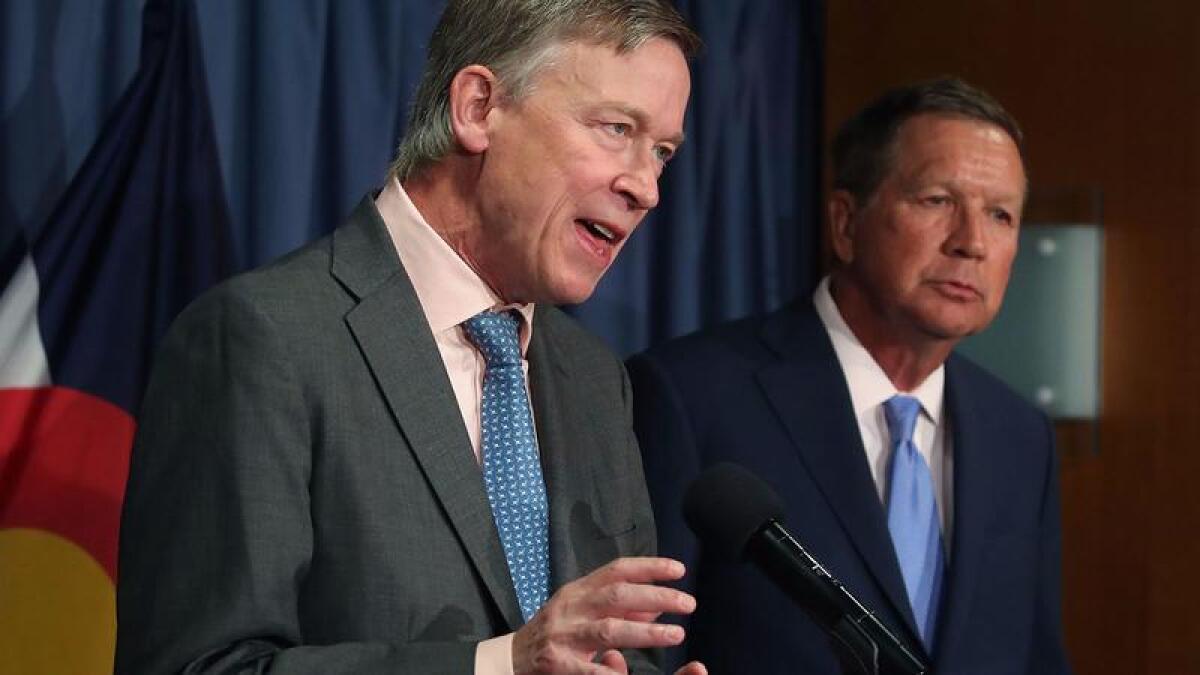
In today’s political climate, it’s rare to find bipartisanship. But as President Trump calls on Senate Republicans to pass a bill in the coming weeks that would overhaul the Affordable Care Act, governors from both sides of the aisle are unified in opposition.
The Senate GOP healthcare bill would cut Medicaid spending by $772 billion over the next decade, leaving millions of low-income people uninsured in states where Medicaid was expanded under the Affordable Care Act, commonly known as Obamacare.
The governors from states that took advantage of the Medicaid expansion have worked together in crafting letters, holding teleconferences with reporters and hosting private meetings with members of Congress. Some have called for no repeal, others a more measured approach. Who are they? Here’s a look:
- Share via
Trump’s latest tweet in media war is a literal show of mock pugilism
President Trump on Sunday circulated a doctored video clip on Twitter that showed him physically attacking a crudely rendered stand-in for CNN, a post that drew rebukes from critics as an incitement to violence, but prompted renewed expressions of support from backers.
In doing so, Trump also ignored pleas to stop tweeting or at least take a more presidential tone -- from lawmakers in his own party -- after he took his war against news media to new heights last week with a coarse post on the appearance and intellect of cable television host Mika Brzezinski. On Saturday he also posted several anti-media messages as Americans began their Fourth of July celebration.
Sunday’s tweet, which used an edited version of a years-old promotional video for professional wrestling, showed Trump, clad in a business suit and tie, administering a choreographed beat-down to a figure whose face was obscured by CNN’s logo.
CNN, which has been a particular target of the president since the network was forced to retract a story relating to an element of the sprawling investigation into possible collusion with Russia by the Trump campaign, quickly condemned the tweet.
“It is a sad day when the President of the United States encourages violence against reporters,” the network said in statement. It also tweeted a recent assertion by White House spokeswoman Sarah Huckabee Sanders that Trump had never engaged in such incitement.
As is often the case, the president’s surrogates were left scrambling to explain or justify an inflammatory Twitter outburst. Homeland security advisor Thomas Bossert, who was shown the clip while appearing on ABC’s “This Week,” watched it stone-faced and then declared: “No one would perceive that as a threat. I hope they don’t.”
The night before, Trump had used a celebration of veterans at Washington’s Kennedy Center to again denounce the news media. The president, who had briefly broken a weekend golf getaway to appear at the rally, pounded away at the theme that he is being treated unfairly.
“The fake media tried to stop us from going to the White House,” he told the raucous crowd. “But I’m president, and they’re not.”
- Share via
Increasing number of states reject request for personal information on voters from Trump commission
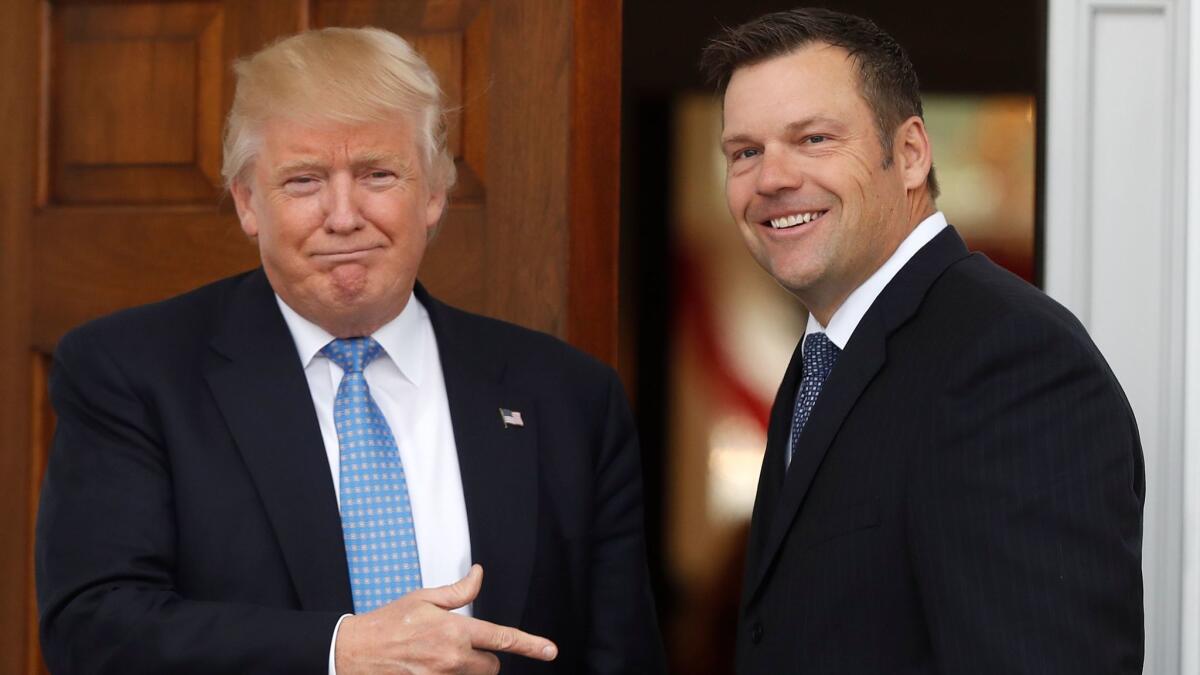
A growing number of states have rejected a request for personal information about voters from a presidential commission on vote fraud led by Kansas’ controversial Secretary of State Kris Kobach.
Kobach, the vice chairman of the commission, sent letters to each state and Washington, D.C., asking for voters’ personal information. The request asked for names, addresses, voting history and the last four digits of voters’ Social Security numbers.
The commission was set up to look into voter fraud after President Trump alleged that he lost the popular vote in 2016 only because millions of people voted illegally -- a claim that numerous states’ election officials from both parties and outside experts have dismissed as groundless.
As of Friday afternoon, at least 13 states had outright rejected the request from the Presidential Advisory Committee on Election Integrity. Officials in several other states either said they would not supply all the information or needed more information before making a decision.
Some officials did not mince words in their “no’s.”
“They can go jump in the Gulf of Mexico, and Mississippi is a great State to launch from,” Mississippi Secretary of State Delbert Hosemann wrote in a statement.
California Secretary of State Alex Padilla said in a statement that strongly criticized Kobach that he would “continue to defend the rights of all eligible voters to cast their ballots free from discrimination, intimidation or unnecessary roadblocks.”
As a Kansas official, Kobach has been a leading backer of immigration restrictions and of measures to put new requirements on who is allowed to vote. His opponents note that he was fined last week for misleading a federal court in a voting rights case.
Democratic elected officials in several states criticized the commission, itself, not just the information request.
“The president created his election commission based on the false notion that ‘voter fraud’ is a widespread issue – it is not,” Kentucky Secretary of State Allison Grimes wrote.
In an odd contradiction, Kobach said that Kansas, like some other states, will partially reject at least one aspect of the request.
“In Kansas, the Social Security number is not publicly available. … Every state receives the same letter, but we’re not asking for it if it’s not publicly available,” he told the Kansas City Star.
The states that have fully rejected the request include California, Indiana, Kentucky, Massachusetts, North Dakota, New York, Pennsylvania, Rhode Island, South Dakota, Tennessee, Virginia, Mississippi and Minnesota.
Others, including Nevada, Ohio, Oklahoma, Connecticut, Missouri, Kansas, Utah and Texas will turn over some of the requested information. Vermont has requested an affidavit from the commission. And Wisconsin has suggested that the commission could purchase the publicly available information, just as political campaigns do. Officials in Washington state said they were reviewing the request.
- Share via
Look at possible conflicts of interest in Trump team’s OneWest Bank probes, 2 Democrats urge
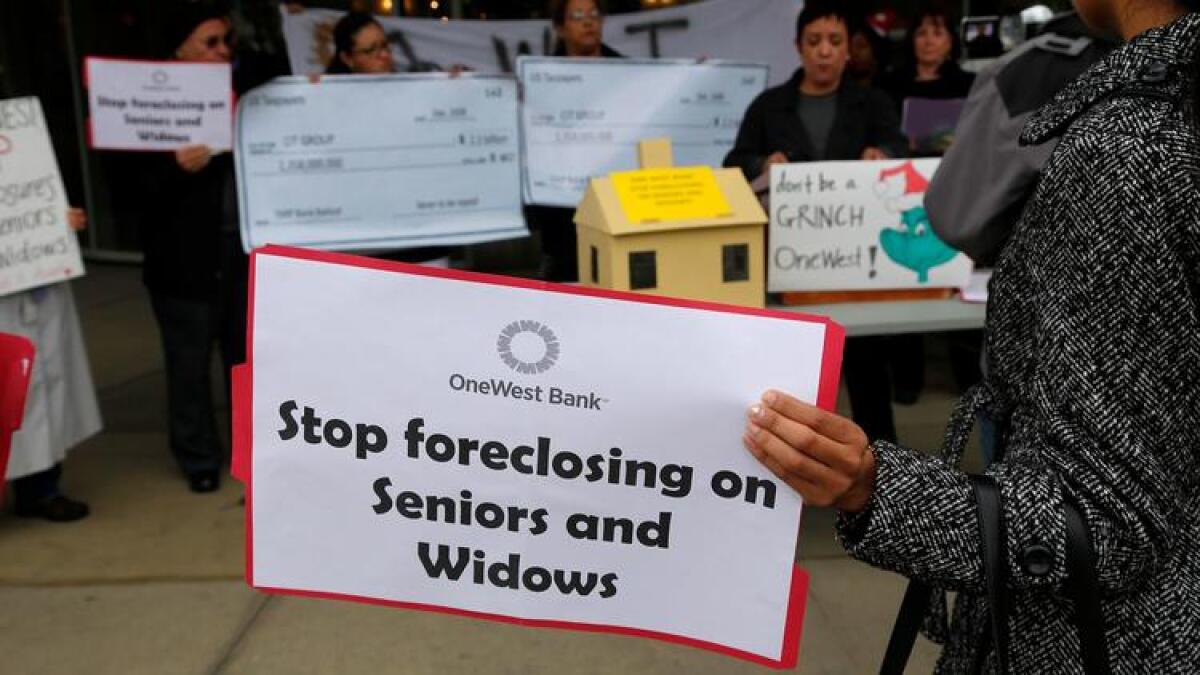
Two House Democrats want Congress to look into possible conflicts of interest in the Trump administration’s handling of investigations into Pasadena’s OneWest Bank — a bank formerly headed by now-Treasury Secretary Steven T. Mnuchin.
Reps. Maxine Waters (D-Los Angeles) and Al Green (D-Texas) said Friday that there was “room for considerable doubt as to the impartiality and the adequacy of this administration’s investigations into OneWest” and a subsidiary, Financial Freedom.
Mnuchin was the bank’s chairman from 2009 to 2015. President Trump has nominated Joseph Otting, the former chief executive of OneWest, to be comptroller of the currency, a key bank regulator who is part of the Treasury Department.
And Brian Brooks, who was OneWest’s vice chairman, reportedly will be tapped to be deputy Treasury secretary.
- Share via
Healthcare issue delivers nothing but pain for Nevada’s embattled Sen. Dean Heller
Dean Heller is Stephanie Diaz-Gonzalez’s problem now.
She’s never met Nevada’s Republican senator and hadn’t had much time to familiarize herself. How could she? The 25-year-old is holding down a full-time job and ra+ising a 7-year-old son, who keeps her busy with soccer games, math homework and those too-often terrifying moments when he can’t breathe.
When President Trump was elected and congressional Republicans moved on their top priority to dismantle Obamacare, Diaz-Gonzalez got to know Heller a whole lot better.
Given his back-and-forth on the issue, she came to distrust him.
“I don’t know if I could vote for him or support him,” the Democrat said. “He seems very contradictory.”
Which is why Heller is also Karen Steelmon’s problem.
Steelmon, a 48-year-old Republican who grew up in northern Nevada, isn’t happy with the lawmaker, who is considered the most vulnerable GOP senator in the country when he comes up for reelection next year.
Obamacare has always been an abomination to Steelmon, an ardent supporter of repeal. To her, deeply held principles are at stake.
“Heller has never acted in favor of what I would consider conservative, constitutional principles as a general rule,” said Steelmon, who would like to see the incumbent taken out in a GOP primary. “And on the very few times he has, it’s always come as a surprise.”
This is Heller’s dilemma.
- Share via
Morning Joe hosts pen op-ed in response to Trump’s tweets, while the president tweets a new attack

The co-hosts of MSNBC’s “Morning Joe” program hit back at President Trump after his Twitter attack on them.
In an op-ed in Friday’s Washington Post, co-anchors Mika Brzezinski and Joe Scarborough wrote that they had criticized Trump, but that “our concerns about his unmoored behavior go far beyond the personal.”
“America’s leaders and allies are asking themselves yet again whether this man is fit to be president,” they wrote.
“We have out doubts,” they added, “but we are both certain that the man is not mentally equipped to continue watching our show.”
Trump soon retaliated with yet another tweet.
To which Scarborough responded.
The president’s Twitter wars have exasperated Republican lawmakers and discouraged even many of his supporters, but he shows no sign of changing his long-set ways.
- Share via
Trump will meet face-to-face with Putin in Germany next week

President Trump has governed five months under a cloud of questions about his relationship with Russian President Vladimir Putin, yet the two men will meet next week for the first time, on the sidelines of the G20 summit of world leaders in Hamburg, Germany.
White House officials on Thursday confirmed plans for the private meeting but said no decisions had been made about the topics Trump will raise. So it’s unclear whether the men will discuss Russia’s election-year cyberattacks that are the focus of criminal and congressional investigations.
“Our relationship with Russia is not different from any other country in terms of us communicating with them, really, what our concerns are, where we see problems in the relationship but also opportunities,” said Trump’s national security advisor, H.R. McMaster.
McMaster said he expected the two men to have “a broad, wide-ranging discussion” about problems in the relationship but also about where the U.S. and Russia have “common interests.”
“There’s no specific agenda,” McMaster said. “It’s really going to be whatever the president wants to talk about,” he added.
The White House has refused to say whether Trump would sign legislation with new sanctions on Russia for meddling in the elections by hacking, including into some states’ voting systems, and by spreading false news stories.
But Treasury Secretary Steven Mnuchin indicated the existing restrictions against Russia were sufficient. “We’ve got plenty of those as well,” Mnuchin said.
Trump will also meet with the leaders of China, Germany, Japan, South Korea, Mexico, Indonesia, Singapore and other countries during the summit of 20 major world economies.
Trump’s director of the White House National Economic Council, Gary Cohn, said the meeting would fall short of a typical “bilateral” discussion between the American president and the head of another country, but would be more than what’s known in diplomacy-speak as a “pull aside” — a quick, informal get-together on the edge of a conference.
Trump’s scheduled meeting with Putin in Hamburg places added significance on his stop in Poland next Wednesday.
In Warsaw, McMaster said, Trump intends to bolster U.S. relationships with Poland and other central European and Baltic states that were once in Moscow’s orbit under the Soviet Union, but now rely on the North Atlantic Treaty Organization and the U.S. to counter pressure from Russia. Trump’s meetings there seem designed to strengthen his hand with Putin.
McMaster called Poland “a front-line NATO nation with regards to the eastern flank,” noting that it sent troops to fight alongside the U.S. in Afghanistan and Iraq and has exceeded its pledge on NATO defense spending. As a candidate and president, Trump has criticized other NATO countries that have not yet met those pledges for military spending equal to at least 2% of the size of their respective economies.
- Share via
Travel ban seen a win by at least one conservative; Breitbart focuses on upcoming votes in Congress
After it stalled for several months in federal courts, a portion of President Trump’s travel ban is set to take effect Thursday evening and will bar individuals from six majority-Muslim countries. Some in conservative media are viewing it as a much-needed political victory for Trump.
Here are some of Thursday’s headlines:
Two wins for Trump (Washington Times)
Trump has seen setbacks in his fledgling administration – probes into possible collusion with Russia, infighting among his party over a healthcare overhaul, federal courts halting his travel ban. But now, the president gets a W.
“The Supreme Court’s decision to allow portions of President Trump’s travel ban to proceed is a much-needed victory for the administration,” Cal Thompson writes. “In doing so the unanimous court affirmed — at least temporarily, pending a full hearing on the case in the fall — a president’s constitutional authority to determine whether people seeking admittance to the U.S. pose a threat to our safety and security.”
Thompson also highlights the Supreme Court decision this week that churches have the same right as other charitable groups to seek state money for new playground surfaces and other non-religious needs. Thompson called the ruling in the case, Trinity Lutheran Church of Columbia Inc. v. Comer, a victory for religious institutions and Trump, who at times has touched on the issue of religious freedom.
Breitbart prods GOP leaders to pass ‘pro-American’ immigration reforms (Breitbart)
For Trump, Breitbart hasn’t always delivered the most approving headlines for his administration – particularly on immigration. Some right-wing bloggers and pundits don’t think Trump has done enough on immigration, a key pillar of his campaign platform.
This piece turns the attention to members of Congress, where two bills – focused primarily on detaining people in the country illegally – could come up for a vote .
“The GOP-run House is expected to vote for two modest immigration-reform bills as soon as this week, but pro-American reformers are using the two votes to build loud and energetic public pressure for major reform legislation,” notes the right-wing website.
Trump attacks ‘Psycho’ Joe Scarborough, ‘Crazy’ Mika Brzezinski in Twitter tear (Fox News)
At first, they were friends; now, perhaps, enemies?
Trump used Twitter early Thursday to jab “Morning Joe” hosts Joe Scarborough and Mika Brzezinski, who the president in past has said he admires.
The tweets have drawn the ire of Republicans. Here’s what the president wrote:
And the response?
- Share via
Trump plans to nominate Brendan Carr to fill final FCC seat and provide crucial vote on net neutrality rules
President Trump intends to nominate Brendan Carr, a former aide to Federal Communications Commission Chairman Ajit Pai, to fill the final open seat at the agency and provide a crucial vote on the future of tough net neutrality rules.
Carr, the FCC’s general counsel, would fill a Republican slot on the commission and would be expected to support Pai’s push to roll back the regulations for online traffic.
Carr’s intended nomination was announced by the White House on Wednesday night. It comes after Trump nominated Jessica Rosenworcel, a former FCC commissioner, on June 14 to fill a Democratic seat.
If the Senate confirms both nominees, as expected, the FCC would have its full complement of five commissioners and a 3-2 Republican majority.
- Share via
Gorsuch is already pushing Supreme Court to the right on religion, guns and gays
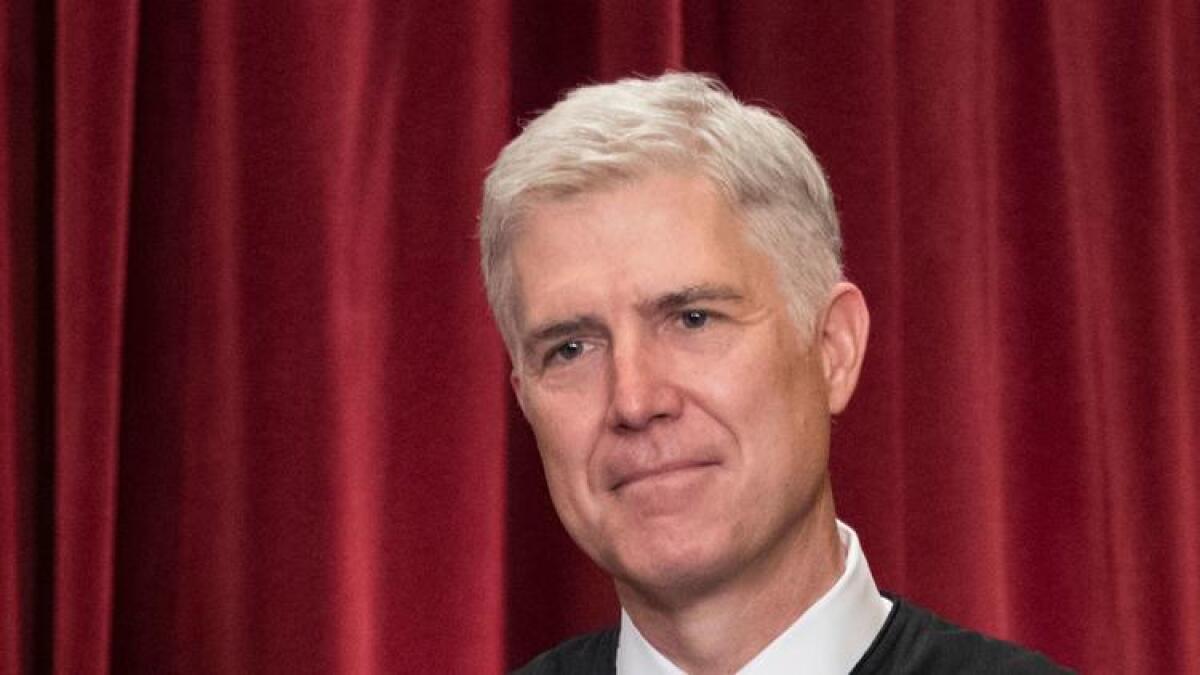
When Judge Neil M. Gorsuch went before the Senate in March as President Trump’s first nominee to the Supreme Court, he sought to assure senators he would be independent and above the political fray.
“There is no such thing as a Republican judge or Democratic judge,” he said more than once. “We just have judges.”
But in just his first few weeks on the high court, Justice Gorsuch has shown himself to be a confident conservative activist, urging his colleagues to move the law to the right on religion, gun rights, gay rights and campaign funding.
He dissented along with Justice Clarence Thomas when the court rejected a gun-rights challenge to California’s law that strictly regulates who may carry a concealed weapon. “The 2nd Amendment’s core purpose,” they said, shows “the right to bear arms extends to public carry.”
He wrote a dissent, joined by Thomas and Justice Samuel A. Alito Jr., when the court struck down part of an Arkansas law that gave opposite sex-couples, but not same-sex couples, the right to have both spouses listed on a child’s birth certificate. The court said it had already decided that same-sex couples deserve fully equal rights under state law.
And when Trump’s travel ban came before the court this week, Gorsuch dissented from the majority’s middle-ground approach, which allowed the ban to take effect except for foreign travelers who had a relationship with this country, such as a close relative or a student enrolled in a university.
- Share via
When he meets South Korea’s president, Trump will be asking for trade concessions and help confronting North Korea
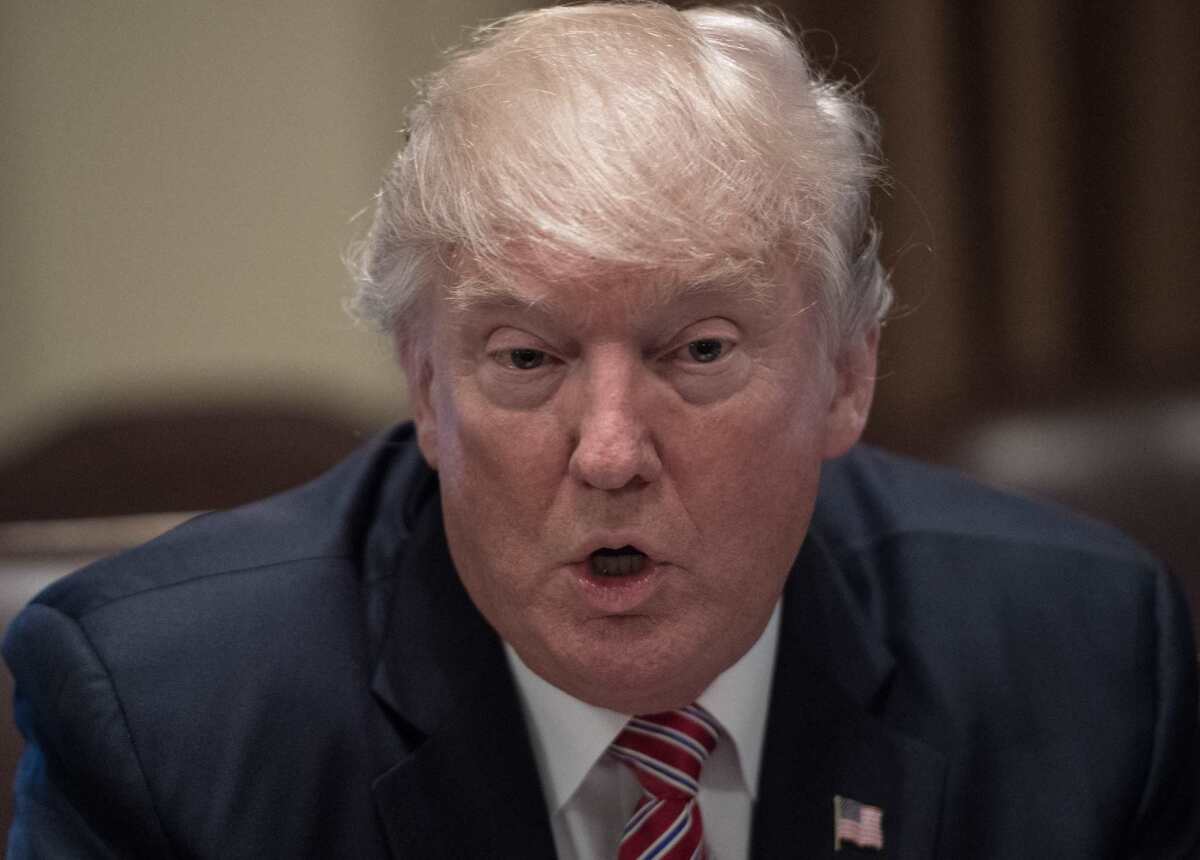
President Trump plans to pressure South Korean President Moon Jae-in to make trade concessions when they meet Friday, while at the same time seeking closer cooperation against North Korea’s accelerating nuclear program.
Both aims, outlined Wednesday by a senior administration official, could make for some difficult discussions, especially since the newly elected Moon campaigned for a softer approach to the government in Pyongyang.
Moon, who arrived Wednesday in Washington, began his four-day visit by laying a wreath at a memorial at Marine Corps Base Quantico in northern Virginia to the U.S. Marines who died during the Korean War in the battle at Chosin Reservoir.
Trump will host Moon and his wife, Kim Joon-suk, for dinner at the White House on Thursday before the two leaders meet one-on-one in the Oval Office on Friday morning.
Having criticized the two countries’ trade agreement when he was running for president, Trump will argue for a more balanced trade relationship, the administration official said in a background briefing. In particular, Trump will cite the large amount of Chinese steel that is sometimes processed in South Korea before being sold cheaply in the U.S. market.
The two leaders will have a “friendly, frank discussion about the trade imbalance between South Korea and the United States,” said the official, who spoke on condition of anonymity. Seoul’s trade surplus is “shrinking,” the official added, but “there is still a large gap.”
The visit will mark the first time the two leaders have met since the liberal Moon took office last month after the ouster of President Park Geun-hye, a scandal-tarred conservative who had taken a hard line against North Korea.
Trump and Moon share “precisely the same goal,” the Trump aide said -- “the complete dismantlement of North Korea’s nuclear program.”
But the approach of the two leaders is starkly different. Trump has called for “maximum pressure” against North Korea, seeking additional economic sanctions and demanding that China, North Korea’s main ally and patron, do more to shut off assistance to Pyongyang.
Moon has risen through the ranks of his country’s politics advocating for closer ties between the Koreas, which technically are still at war. Already he has taken steps to delay the deployment of the U.S. Terminal High Altitude Area Defense system, known as THAAD, an anti-missile system intended to counter any North Korean strikes.
The anti-missile system is a divisive issue in South Korea; it prompted protests last weekend at the U.S. Embassy in Seoul. China has objected to installation of the powerful radar defense as well, but the White House believes the U.S. system will ultimately be fully operative.
The delay “should not be equated as a reversal of the decision to deploy THAAD,” the official said, and suggested that the topic would not be central to the two presidents’ discussions.
“As important as anything [will be] building a rapport and getting to know each other,” the official said.
- Share via
Senate Republicans aim for new healthcare bill by Friday, but skeptics remain
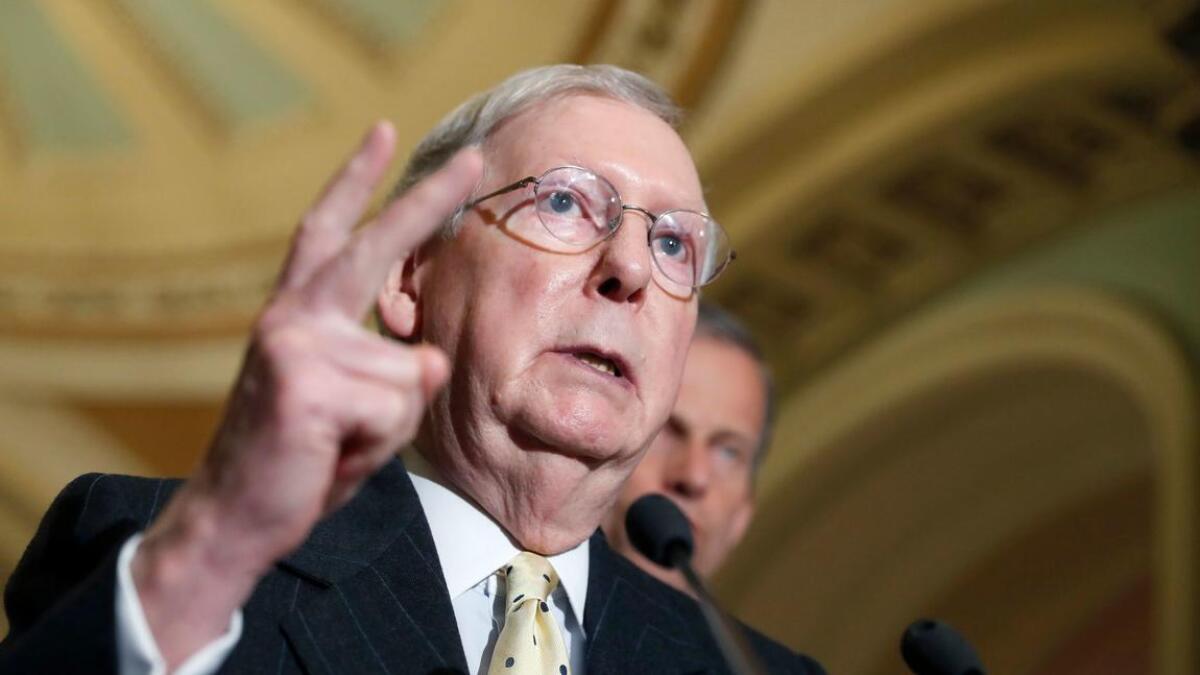
Senate Republicans reconvened behind closed doors Wednesday trying to break the impasse on their healthcare overhaul but emerged with no apparent strategy for resolving differences by an end-of-week deadline.
Senate Majority Leader Mitch McConnell of Kentucky vowed to try again for a vote after the Fourth of July recess, despite having abruptly delayed action this week.
Senators were aiming for a revised bill by Friday, the Republican whip, Sen. John Cornyn of Texas, told reporters, so it could be assessed by the Congressional Budget Office during the break.
But senators remained skeptical after the lengthy lunchtime huddle that appeared to run long on ideas but short on consensus.
“I think it’s going to be very difficult,” said Sen. Susan Collins (R-Maine).
McConnell surprised senators by delaying this week’s expected votes once it became clear he did not have a majority for passage – or possibly to even open the debate.
As many as 10 Republican senators now publicly oppose the bill, the Better Care Reconciliation Act, and leaders are scrambling to win them over with an estimated $200 billion in savings from the bill that can be applied to their particular state’s needs.
But even with that fund of resources, it is not clear McConnell will be able to satisfactorily improve the legislation, which now threatens to cut 22 million Americans off health insurance. He can only afford to lose two Republican votes in the face of Democratic opposition.
“It’s going to be very difficult to get me to a yes... have to make us an offer we can’t refuse,” Sen. Dean Heller (R-Nev.) said on a telephone town hall late Tuesday, according to journalist Jon Ralston, who monitored the call.
Fresh polling Wednesday showed paltry support for the Republican approach to overhauling the Affordable Care Act, known as Obamacare, which has enjoyed a surge in popularity now that Republicans are closer than ever to repealing it. A USA Today poll put approval of the Senate GOP bill at 12%.
Republicans, though, are under enormous pressure from their most conservative supporters – and big dollar donors, including the powerful Koch network – to deliver on their promised to end Obamacare.
Senate Democrats, meanwhile, suggested that President Trump convene all 100 senators – much the way then-President Obama did during his first days in office for a session at Blair House – to see how they might be able to work together to improve, rather than repeal, the Affordable Care Act.
“I’d make my friends on the Republican side and President Trump an offer: Let’s turn over a new leaf. Let’s start over,” said Senate Minority Leader Charles E. Schumer (D-N.Y.).
“President Trump, I challenge you to invite us – all 100 of us, Republican and Democrat – to Blair House to discuss a new bipartisan way forward on healthcare in front of all the American people.”
No such invitation, however, seemed forthcoming. Trump dismissed Schumer’s proposal – “he just doesn’t seem like a serious person,” the president said – and instead promised his own “big surprise” on healthcare.
“Healthcare is working along very well,” Trump told reporters at the White House. “We could have a big surprise, with a great healthcare package.”
Asked what he meant by a big surprise, Trump simply repeated: “A great, great surprise.”
The Republican bill, like its counterpart passed by House Republicans, does not fully gut Obamacare, but rescinds the new taxes imposed on high-income individuals and healthcare companies to pay for expanding coverage through Medicaid and subsidies for private insurance on the ACA marketplace.
Senators said the private talks Wednesday focused mainly on changes to the Obamacare marketplace that could bring down the cost of insurance premiums.
One idea from Sen. Ted Cruz (R-Texas) to allow insurers to offer policies that do not meet the Obamacare benchmarks for what insurance needs to cover met with mixed reaction, senators said.
Sen. Bill Cassidy (R-La.), a physician, warned that such changes would alter the risk pool, keeping insurance costs high.
“You end up with policies that, for example, don’t cover maternity,” Cassidy said. “Do you want a policy that doesn’t have maternity, which would be principally appealing to young men, when obviously typically men have had a role in that pregnancy?”
Other senators were floating new ideas, but McConnell gave no indication whether those proposals would be included in the final revised product.
Michael A. Memoli contributed to this report.
- Share via
No new laptop bans, but air travelers to the U.S. will face tighter screening all over the globe
Homeland Security officials said Wednesday they will order stricter passenger screening and other new security measures for all flights entering the United States but will not bar laptop computers in carry-on luggage as airlines and passenger groups had feared.
The new order will cover about 2,000 flights a day from 280 airports in 105 countries, a move that could make international flying even more onerous just as the busy summer travel season starts.
Security officials would not detail the new measures but said passengers headed to the United States will face more intensive screening at airports, and probably more security dogs. They gave no date for when the new procedures will start.
If carriers don’t implement the measures effectively, Homeland Security still may ban laptops, e-readers and other electronic devices larger than cell phones from cargo holds as well as passenger cabins.
The decision follows intelligence, reportedly gathered from Islamic State in Syria by Israeli spy services, suggesting a lethal new threat from bombs that could be concealed in digital devices and that could evade detection by airport screening devices.
In March, U.S. and British authorities banned laptops in cabins on flights from eight Muslim-majority countries in North Africa and the Middle East, saying terrorists were seeking “innovative methods” to bring down commercial jetliners.
Secretary of Homeland Security John Kelly told a security conference in Washington on Wednesday that the new security measures will be “both seen and unseen” and will be phased in over time.
He said they will include tougher screening, particularly of electronic devices, plus new technology and procedures to protect planes from so--called insider attacks by airline employees.
“It is time that we raise the global baseline of aviation security,” Kelly said. “We cannot play international whack-a-mole with every new threat.”
He said terrorists still see commercial aircraft as “the crown jewel target” for attacks, and that intelligence has shown renewed interest by terrorists to attack airlines.
Kelly told a House committee several weeks ago that the department was considering extending the laptop ban to 71 more airports overseas.
But Kelly ultimately decided to tighten screening across the board, instead of focusing on laptops or “chasing after each item” that might be used to bring down a jetliner, senior Homeland Security officials said Wednesday in a conference call with reporters.
The officials, who spoke on condition of anonymity to brief reporters, said Kelly worked with airlines to find ways to improve screening without unduly inconveniencing passengers.
“Intensive doesn’t always mean slower,” said one official. “In some cases, airlines have been doing these things at international airports for some time.”
The officials said more security dogs, which sniff for explosives, may be used. And they said airlines and airports may institute pre-check programs like those approved by the Transportation Security Administration for use in U.S. airports.
The officials said restrictions on the first 10 airports will be lifted once airlines in those countries satisfy the new security protocols, officials said.
Airport authorities in the eight countries affected by that ban – Jordan, Egypt, Qatar, Kuwait, Saudi Arabia, Turkey, Morocco and the United Arab Emirates – have been told about the new security measures and will put them in place so the ban is lifted, the officials said.
In recent weeks, Kelly and his aides have huddled with their counterparts overseas, as well as with representatives of major airlines, to discuss whether to expand the ban around the globe.
Airlines protested that a laptop ban would inconvenience passengers and not remove the threat. Aviation experts and European security officials warned that putting laptops in cargo holds would pose other dangers because the lithium batteries could start fires.
In 1988, a bomb hidden in a radio cassette player exploded aboard a Pan Am jet flying over Lockerbie, Scotland, killing all 259 passengers and crew. The plot was blamed on then-Libyan strongman Moammar Kadafi.
In 2010, powerful bombs hidden in printer ink cartridges were found aboard two cargo jets headed from Yemen to Chicago. Al Qaeda in the Arabian Peninsula later claimed responsibility for the plot.
- Share via
It’s crunch time for McConnell after Senate GOP is forced to delay vote on healthcare bill

The abrupt decision Tuesday by Senate Majority Leader Mitch McConnell to temporarily shelve a vote on the Republican Obamacare overhaul gives him a few extra weeks to build support for a revised bill before it risks becoming hopelessly stalled by the opposition.
The seasoned GOP leader will be aided by what amounts to a $200-billion piggy bank to push Republican holdouts into line. That’s the bill’s extra cost savings, compared with the House version, that McConnell can tap to provide perks to individual senators, from more opioid assistance to expanded tax-free health savings accounts.
A similar strategy — delay and enticements — worked well in the House, where Republicans last month passed their healthcare bill on the third try.
But prolonging the debate also gives Democrats and other critics time to mobilize, and ensures that senators will be exposed to an onslaught of opposition as they head home for the weeklong holiday break to defend a bill that has estimated would leave tens of millions of Americans without insurance.
After the delay was announced, President Trump hosted a White House gathering of all GOP senators. But rather than rally them around the bill with the power of the presidential bully pulpit, he struck a surprisingly detached tone.
“This will be great if we get it done,” Trump told senators in the East Room. “And if we don’t get it done, it’s just going to be something that we’re not going to like. And that’s OK.”
- Share via
As vote looms, concerns over Medicaid cuts rise from some in conservative media
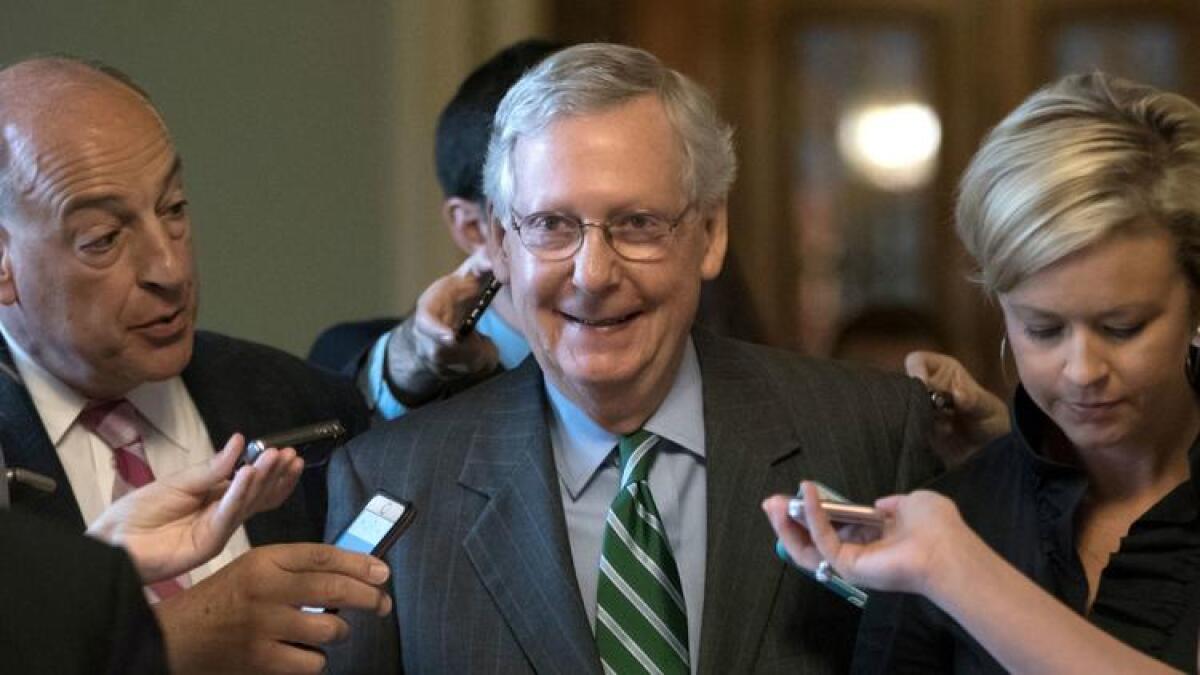
The vote – for now – is delayed.
As President Trump has urged Senate Republicans to pass a bill that would overhaul the Affordable Care Act, some, including Sens. Dean Heller of Nevada and Rob Portman of Ohio, have expressed concerns over cuts to Medicaid. Both represent states that, under Obamacare, expanded Medicaid coverage to low-income adults. The current Senate healthcare bill would deliver deep cuts to Medicaid, leaving millions uninsured.
While Trump awaits a vote in the coming weeks – originally scheduled for this week, but pushed back until after the July 4 recess – it’s on Senate Majority Leader Mitch McConnell to gather enough support from within his GOP caucus to secure the bill’s passage.
Some in the conservative media are questioning the current bill. Here is an overview of today’s headlines on this and other issues:
Republicans have a Medicaid problem (Weekly Standard)
The Republican healthcare bill would cut Medicaid spending by $772 billion over the next decade.
Chris Deaton writes that “Republicans aim to offset the consequences of these Medicaid changes by offering tax credits for private insurance to people under the poverty line.”
In this piece, Deaton raises the question of whether low-income earners would be better off with Medicaid coverage or obtaining insurance through a GOP tax credit? He answers by noting, “It’s long been a contention of conservative thinkers that healthcare outcomes improve with private insurance rather than Medicaid.”
Paul Manafort, former Trump campaign chairman, registers as foreign agent (Associated Press)
He’s among those facing scrutiny in an FBI investigation into Russian meddling in last year’s election.
Now, Paul Manafort, who at one time served as Trump’s campaign chairman, has registered with the Department of Justice as a foreign agent.
In a filing with the department, Manafort notes that his consulting firm received nearly $17 million between 2012 and 2014 from a Ukrainian political party with links to Russia, according to the Associated Press.
Last spring, former national security advisor Michael T. Flynn, who resigned from his position in February after misleading administration officials about contacts with Russians, also registered as a foreign agent, for consulting work he did for a Turkish businessman.
A Democratic road to recovery (American Spectator)
The party is attempting a reboot.
After Hillary Clinton’s 2016 loss and defeats in several special elections this year, Democrats are in search of a new face for the party. Even so, liberals are in lock-step in their opposition to Trump.
This piece offers Democrats some advice – from the right – on how to recover.
“Leftists: You have been lied to and taken advantage of. When you eventually come out of this haze you are in, you will realize that it was done not by the president, but by the snake oil salesmen and charlatans, who took advantage of your sickness and weakness, simply for money and power,” writes Judah Friedman. “Ask yourselves this: What is the Democratic Party, right now, without this rage, and hate, with which it is fueling your addictions? The answer is nothing.”
- Share via
Sarah Palin sues the New York Times for tying her PAC ad to mass shooting
Former vice presidential nominee and Alaska Gov. Sarah Palin is accusing the New York Times of defamation over an editorial that linked one of her political action committee ads to the mass shooting that severely wounded then-Arizona Congresswoman Gabby Giffords.
In the lawsuit filed in Manhattan federal court Tuesday, Palin’s lawyers say the Times “violated the law and its own policies” when it accused her of inciting the 2011 attack that killed six people.
The lawsuit refers to a June editorial in the Times on the recent shooting of Louisiana Congressman Steve Scalise. The editorial later was corrected.
Palin is seeking damages to be determined by a jury.
A spokeswoman for the Times, Danielle Rhoades Ha, says the company hasn’t seen the lawsuit but will defend against any claim vigorously.
- Share via
Trump succeeds where Obama failed – spawning a new wave of liberal activism

The night Hillary Clinton lost the White House, Amanda Litman cried so hard she threw up.
In Atlanta, as the returns rolled in, Traci Feit Love faced a question from her anguished 8-year-old daughter: “Now what do we do?”
Across the country, in the heart of Silicon Valley, Rita Bosworth wondered the same thing.
The three never met, never spoke, never communicated in any fashion. But in the days and weeks that followed, they became common threads in a sprawling patchwork: the angry and politically aggrieved who — with no help from politicians, political parties or any formal campaign structure — have joined to fight President Trump and his policies.
- Share via
Trump on healthcare bill: ‘If we don’t get it done ... that’s OK’
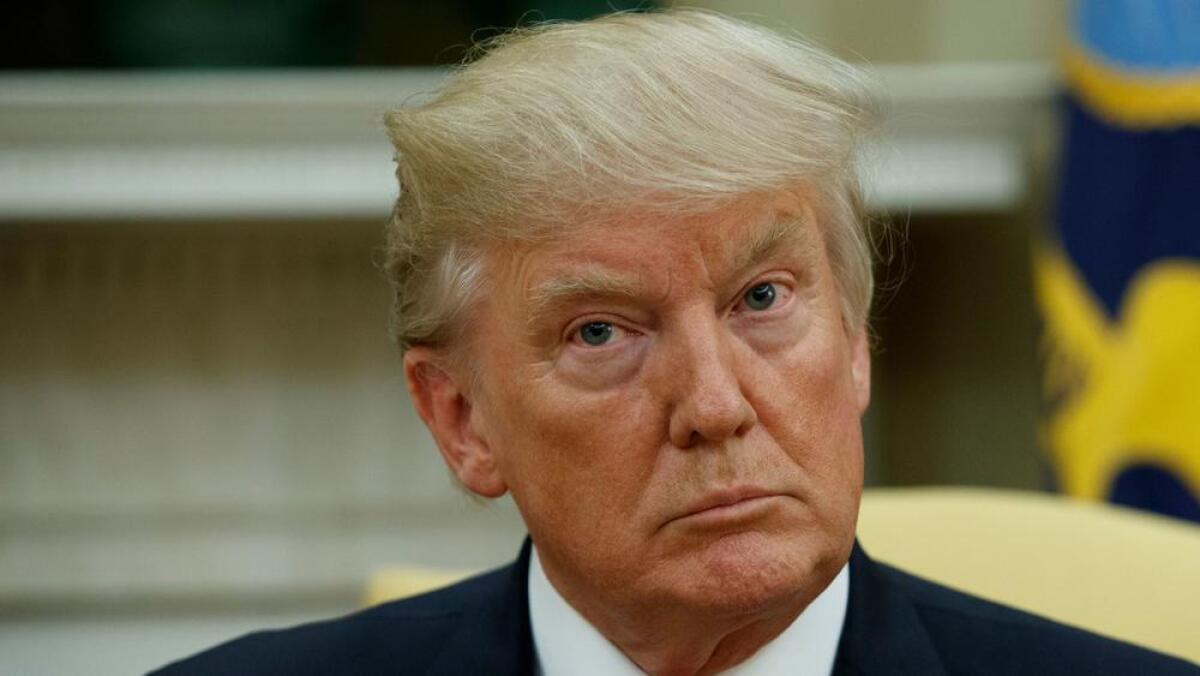
President Trump said that if the healthcare bill fails to pass in the Senate, he won’t like it — but “that’s OK.”
Trump spoke Tuesday at a gathering of Senate Republicans after their leaders delayed a vote on their healthcare bill until at least next month.
Trump said, “This will be great if we get it done and if we don’t get it done it’s going to be something that we’re not going to like and that’s OK and I can understand that.”
He added, “I think we have a chance to do something very, very important for the public, very, very important for the people of our country.”
- Share via
Watch live: Press briefing with Deputy Press Secretary Sarah Sanders and Energy Secretary Rick Perry
- Share via
Senate GOP leaders abruptly delay vote on healthcare bill until after July 4th recess
Facing resistance from their own party, Senate Republican leaders said Tuesday they would postpone a vote on their healthcare bill until after the July 4th recess.
Senate Majority Leader Mitch McConnell wants to provide more time to make changes to the bill to try to convince reluctant GOP senators to vote for the measure.
“We’re going to press on,’’ McConnell said, adding he remains optimistic. “We’re continuing to talk.”
Since the nonpartisan Congressional Budget Office said the bill would leave 22 million more Americans without insurance after 10 years, several Republicans senators had said they would not even support allowing the bill to be brought to the Senate floor for a vote.
Meanwhile, President Trump invited all GOP senators to the White House for a meeting Tuesday afternoon.
But Sen. Susan Collins (R-Maine), a moderate who has expressed serious doubts about the bill, questioned whether revisions would make a difference.
“I have so many fundamental problems with the bill, that have been confirmed by the CBO report, that it’s difficult to see how any tinkering is going to satisfy my fundamental and deep concerns about the bill,’’ Collins said on CNN.
McConnell is struggling to appease two factions in his party. Centrists like Collins want to lessen the impact of proposed cuts to Medicaid, while conservatives want to go further in repealing benefits provided under Obamacare.
Senate leaders hope to continue talks this week, with an eye toward moving quickly when Congress returns after the holiday. McConnell plans to wait for the CBO to review any changes and reissue a score.
He can only afford to lose two Republicans given the party’s 52-seat majority in the Senate.
“There’s more work that needs to be done, it’s pretty obvious,” said Republican Sen. Jim Risch of Idaho as he was leaving a Senate lunch with Vice President Mike Pence. Pence ignored reporters questions about the decision. “If more work needs to be done, you shouldn’t try to light the fire.”
But the delay in a vote will give Democrats and other opponents of the repeal bill more time to mobilize, particularly as Republicans return to their home districts during the holiday.
“We know the fight is not over,’’ said Senate Minority Leader Charles E. Schumer of New York.
- Share via
Trump administration warns of Syrian chemical attack, but with damaged credibility
The Trump administration Monday night sent the kind of dire warning -- of the Syrian regime’s apparent preparation for another chemical weapons attack, and a threat of U.S. retaliation -- that requires credibility to have a receptive national and foreign audience.
Yet the initial bafflement about the warning among U.S. defense officials, and the simultaneous distraction of President Trump’s unrelated tweets, seemed to undercut the seriousness of the moment. More broadly, the episode is testing the damage Trump has done to his and his administration’s trustworthiness by his assaults on the intelligence community as well as other perceived enemies.
Trump has spent months attacking the credibility of the intelligence community, at one point comparing their tactics to Nazis’ and repeatedly calling its findings of Russian meddling in the election a “hoax” and “witch hunt,” even as foreign policy experts cautioned that he was diminishing the reputation of a community he would need in times of crisis to rally public support.
“At a moment of crisis when U.S. decisions and actions rest upon information coming from the intelligence community, [Trump] may have diminished the credibility of that information in the eyes of the public and the eyes of the international community,” said Daryl G. Kimball, the executive director of the Arms Control Assn.
Kimball called the White House statement “unusual” and said such messages would normally be sent through private diplomatic channels. He added that the public allegation should be followed by a formal presentation of the evidence to the United Nations Security Council, to build international support against suspected Syrian violations of the chemical weapons ban.
The four-line statement on Syria from the White House Press Secretary came just after 9:44 p.m. EDT Monday.
“The United States has identified potential preparations for another chemical weapons attack by the Assad regime that would likely result in the mass murder of civilians, including innocent children,” the statement read. “The activities are similar to preparations the regime made before its April 4, 2017 chemical weapons attack.”
If Syrian President Bashar Assad “conducts another mass murder attack using chemical weapons, he and his military will pay a heavy price,” it concluded, citing a U.S. missile strike after the previous chemical attack to reinforce the new threat.
A Pentagon spokesman confirmed Tuesday that preparations for a chemical attack were observed at the same base in Syria from which its military launched a sarin nerve gas attack that killed 86 people, including children, in April.
“We have observed activities at Shayrat Air Base that suggest possible intent by the Syrian regime to use chemical weapons again,” Pentagon spokesman Maj. Adrian J.T. Rankine-Galloway said in a statement. “These activities are similar to what we observed prior to the regime chemical weapons attack against Khan Sheikhoun in April.”
But some senior U.S. defense and intelligence officials reached late Monday and early Tuesday were caught off guard by the White House statement. “Some knew, some didn’t,” said a U.S. official who sought anonymity to discuss the intelligence matter.
The official described the release of the nighttime statement as “ungraceful,” but said the assessment that Syria was preparing for an attack is “sound.”
Such official statements are typically distributed widely across an administration for internal vetting before they’re publicly released. The White House said the relevant agencies were informed before the statement was published.
Yet Trump lent further confusion about the urgency of the matter and his own level of concern by sending out a tweet about domestic politics only minutes later. He cited a Fox news report about the FBI’s Russia investigation, writing as he often does about the probe, “Witch Hunt!”
Indeed, Trump continued through the next morning to demonstrate his frustration with the Russia investigation and what he calls the American media’s “fake news” with posts on his Twitter feed.
Many tweets quoted supportive conservative commentators and Fox News reports. Trump was eager to go after CNN, one of his top media targets, after it retracted a Russia-related story and three journalists involved resigned.
Trump’s willingness to mix politics and his administration’s ominous red line to Syria opened him up to criticism that he was trying to divert attention from other unfavorable news Monday. The nonpartisan Congressional Budget Office had found that the Republican plan to replace Obamacare would strip 22 million people of health insurance coverage over the next decade.
The Syria statement also prompted a sharp backlash from the Kremlin, which is Assad’s military ally in his nation’s civil war. Russian officials denied there is evidence of an imminent chemical attack and called the White House threat “unacceptable.”
The tensions have heightened as Trump is expected to meet Russian President Vladimir Putin next week at the G20 Summit of industrialized nations in Germany. Monday’s statement may be seen as a warning not just to Syria but to Russia, which is widely seen as enabling Assad’s harsh tactics by bolstering his military as he has tried to retain power.
- Share via
Fifth GOP senator opposes debate on the healthcare bill
Mike Lee of Utah has become the fifth Republican senator to oppose starting debate on the GOP healthcare bill. That deals another blow to party leaders hoping to push the top-priority measure through the Senate this week.
Lee was among four conservative senators who announced last week they oppose the bill’s current version. Lee spokesman Conn Carroll said Tuesday that the lawmaker will not vote for a crucial procedural motion allowing the Senate to begin debate on the legislation, unless it’s changed.
Senate Majority Leader Mitch McConnell (R-Ky.) can lose the votes of only two of the 52 Republican senators to begin debate and ultimately pass the bill. All Democrats oppose it.
Lee has favored a fuller repeal of President Obama’s healthcare law than the current GOP bill.
- Share via
Watch live: Tillerson unveils the Trafficking in Persons report
- Share via
Kremlin calls White House warning to Syria ‘unacceptable,’ denies any Assad chemical attack in the works
The Kremlin is calling “unacceptable” a White House warning to Syria’s government that it would pay a “heavy price” if it carries out another poison gas attack against its own people.
Dmitry Peskov, spokesman for Russian President Vladimir Putin, also declared Tuesday that there is no indication that a chemical weapons strike is in the works.
The White House said late Monday night that activity had been detected similar to that preceding a nerve gas attack on April 4 that killed dozens of civilians, including children, in rebel-held Idlib province.
President Trump responded by launching nearly 60 Tomahawk cruise missiles at a Syrian military airfield that U.S. officials said was used for the chemical attack. It was the first U.S. attack on Syrian forces in the six-year civil war.
Russia continues to deny that Assad’s forces carried out the April 4 gas attack and Peskov criticized the White House for saying there were signs of preparation for “another” such strike.
Peskov said the Kremlin does not “think it is possible to lay the blame on the Syrian armed forces” for the April strike on the village of Khan Sheikhoun, which the U.S. and its allies said involved sarin, a banned nerve agent.
“Despite all the demands from the Russian side, an impartial international inquiry into a previous tragedy using chemical agents has not been carried out,” the spokesman told Russian news agencies.
Peskov criticized the White House warning to Assad, saying “such threats to Syria’s legitimate leaders are unacceptable.”
- Share via
Senate healthcare overhaul hits trouble as Republicans hesitant to proceed to vote
The Senate Republican healthcare bill ran into serious trouble late Monday when key GOP senators indicated they may block the Obamacare overhaul from proceeding to a vote this week.
Political turmoil has been building over the bill for days. But GOP tension burst open after the nonpartisan Congressional Budget Office reported that 22 million more Americans would lose insurance coverage under the plan and that out-of-pocket costs for many of those buying policies on the Affordable Care Act marketplace would rise.
Senate Majority Leader Mitch McConnell hoped to start procedural votes by Wednesday, and President Trump called key senators over the weekend as support splintered.
It’s the same political dynamic that stalled the House Republican bill last month, as conservative and centrist factions wrestle for dominance. Conservatives want a more complete repeal of the Affordable Care Act, which they hope will lower premium costs, while centrists are trying to avoid leaving millions of Americans without health coverage.
“Senate bill doesn’t fix ACA problems for rural Maine,” tweeted Sen. Susan Collins (R-Maine). “I will vote no on mtp,” she said, referring to the “motion to proceed” to the bill.
Conservative Sen. Mike Lee of Utah is also working to change the bill so that he can vote yes on the procedural motion.
“We are not there yet,” Lee’s spokesman said.
Senators have bristled at what they viewed as McConnell’s secretive and rushed process, and several other senators said they wanted more time before voting.
Sen. Ted Cruz of Texas was among those Republicans who shared concerns in weekend calls with Trump.
“We continue to make progress,” Cruz told reporters Monday, as Democrats, who oppose the bill, planned an almost-all-night protest session.
Cruz is part of the gang of four conservatives -- including Sen. Ron Johnson of Wisconsin, Sen. Mike Lee of Utah and Sen. Rand Paul of Kentucky -- who have said they cannot vote for the bill as is. Among the changes being pursued is one provision that would allow insurers to offer cheaper policies that do not meet ACA’s requirements and another to let consumers sock more money into health savings accounts
“We can get there and I’m hopeful we will get there,” Cruz said. However, he declined to say whether he would agree to Wednesday’s procedural vote.
Also hesitant to proceed was Nevada Sen. Dean Heller, who has strongly criticized undoing Obamacare’s Medicaid expansion that has enabled about 200,000 people to gain coverage in his state.
Alaska Sen. Lisa Murkowski, for example, wanted changes to help residents in her geographically far-flung state where healthcare costs are particularly high.
Some senators, though, dismissed the budget analysis and said keeping the ACA would be worse.
“It’s clear the CBO cannot predict the purchasing patterns for millions of Americans,” said Georgia Sen. David Perdue, a Trump ally, in a statement. “This bureaucratic analysis will do nothing to prevent Obamacare from failing.”
Others are weighing their votes.
Republican Sen. Bob Corker, whose office is receiving thousands of daily calls, spent part of Monday on the phone with health officials in Tennessee as he assesses the fallout in his state of 22 million more people in the country without healthcare.
“I kind of figured it was going to be a pretty big number,” said Corker, who remains undecided. “There’s a lot of incoming.”
- Share via
Supreme Court puts off decision in three pending cases about borders and immigration
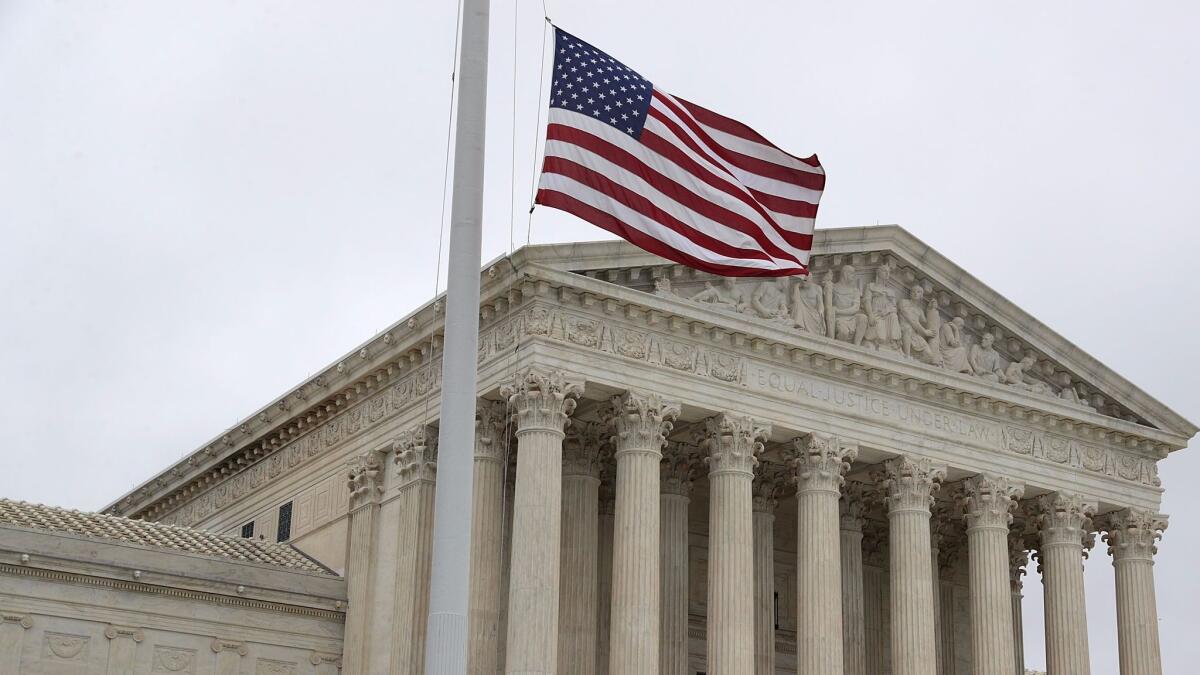
Amid its flurry of decisions Monday about Trump’s travel ban and cases involving religious liberties and guns, the Supreme Court put off final rulings on three pending cases involving immigration and the U.S. border.
In Hernandez vs. Mesa, the court in an unsigned opinion told the U.S. appeals court in New Orleans to take a second look at a border shooting case. The parents of a 15-year-old Mexican boy sued a U.S. border patrol agent who shot and killed the teenager when he was standing a few feet from the border on the Mexican side. The 5th Circuit had thrown out the parents’ suit.
“The facts alleged in the complaint depict a disturbing incident resulting in a heartbreaking loss of life,” the court said in sending the case back for a further hearing.
The court said it would rehear in the fall a Los Angeles case involving whether immigrants awaiting deportation can be jailed indefinitely, or instead have a right to a bond hearing after six months. The court’s action suggests the eight justices were evenly split in Jennings vs. Rodriguez.
The court also said it will rehear the case of Sessions vs. Dimaya to decide whether non-citizens can be deported for an offense like breaking into an empty home because it may be deemed a “crime of violence.”
- Share via
Refugee advocates says even partial reinstatement of travel ban will cause hardship
Immigration and refugee advocates expressed disappointment Monday with the Supreme Court’s partial reinstatement of President Trump’s travel ban, saying even limited implementation could cause hardship to refugees and others seeking to travel to the United States from six affected Muslim-majority countries.
However, organizations taking part in the months-long legal fight against the revised travel ban expressed hopes that the high court ultimately will reject the restrictions after arguments are heard in October.
And they welcomed what they described as an implicit rebuke of the White House’s assertion that Trump has unfettered powers to exclude arrivals based on purported national security concerns.
The initial rollout of the ban, days after Trump took office in January, caused pandemonium at airports across the United States and overseas as tens of thousands of visa-holders arriving from seven affected countries were turned away without warning or detained.
After courts blocked that order, Trump issued a revised travel ban that took Iraq off the list.
A replay of January’s travel chaos was unlikely Monday because the court’s action will allow visa-holders with “bona fide” ties to people or entities in the U.S. to enter, meaning students, employees and family members can still get in.
But refugee advocates said the court’s limited ruling, which the administration can move to implement on Thursday, could leave many would-be arrivals in limbo pending the finalizing of new vetting procedures.
The administration had originally said a three-month travel ban was needed in part to review the checks to which would-be entrants are subjected.
David Miliband, president of the International Rescue Committee, said the partial reinstatement of the ban particularly threatens “vulnerable people waiting to come to the U.S.,” including those with urgent medical conditions.
“We urge the administration to begin its long-delayed review of the vetting process and restart a program which changes lives for the better,” said Miliband.
The National Immigration Law Center, one of the groups that challenged the ban, said that as of this week, approximately 50,500 refugees from the six affected countries had been approved for travel and resettlement in the United States — all having already undergone intensive checks.
The Middle East Studies Assn., one the groups contesting the ban in the lower courts, said many students and academics were ensnared by the original order.
Even though Monday’s court move should allow entry to those studying or working at American academic institutions, many from the affected countries remained wary of leaving and then attempting to re-enter the United States, the group said.
Iran — along with Somalia, Sudan, Yemen, Syria and Libya — is one of the affected countries, and Southern California is home to a large Iranian American community that was hit hard by the original ban.
Some advocates said even with Monday’s limited action, there has already been a chilling effect on movement.
“Today’s Supreme Court decision immediately places the status of many Americans’ families into question again,” said Shayan Modarres, legal counsel for the National Iranian American Council.
The group said that visas issued to Iranian passport-holders had fallen by nearly half since the legal battle over the ban began, and that obtaining a U.S. visa was becoming so onerous that many would not even try to get one.
“The Trump administration’s new idea is to make it so hard on Iranians and Muslims to get a visa that visa officers will have the unrestricted discretion to reject visa applications,” Modarres said.
He added that grounds for rejection could be social media postings critical of Trump or not being able to produce airline boarding passes that could have been issued and used more than a decade ago.
Advocacy groups reiterated their position — which was argued in a number of the lower court cases that propelled the issue to the high court — that the travel restrictions run counter to core American traditions and values.
Mark Hetfield, president of the refugee resettlement agency HIAS, said the group considered the court’s move “an affirmation that the president does not have unfettered, unchecked authority to bar refugees from the U.S. without evidence to justify such action.”
But he added that the executive order’s partial resurrection would “once again cause irreparable damage to refugees, immigrants, and America’s reputation as a welcoming country.”
The initial ban prompted large nationwide protests, and advocates suggested they would again seek to marshal popular opposition to the restrictions.
“When the first order went into effect, tens of thousands of Americans showed the world that this is not who we are and not what we want,” said Becca Heller, director of the International Refugee Assistance Project, another of the groups involved in the legal challenge. “We will never give up defending the rights of those who are affected by this discriminatory executive order.”
- Share via
Trump says Supreme Court action on travel ban gives him ‘important tool’
President Trump celebrated the Supreme Court’s decision Monday to allow a curtailed version of his travel ban to take effect, calling it a “clear victory for our national security.”
In an official White House statement, the president said he was “particularly gratified” that at least part of the ruling was 9-0; three conservative justices said they would have let the president’s revised executive order take effect completely.
“My number one responsibility as Commander in Chief is to keep the American people safe. Today’s ruling allows me to use an important tool for protecting our Nation’s homeland,” he said.
The White House has long maintained that the president was acting within his authority in seeking to temporarily restrict travel to the United States. They most often point to a provision of the Immigration and Nationality Act that states a president can suspend or limit entry of individuals “whenever the president finds that the entry ... would be detrimental to the interests of the United States.”
- Share via
Rival Senate factions push competing agendas as healthcare bill hangs in balance
Heading into a week of intense jockeying and arm-twisting over the Senate’s polarizing healthcare plan, the rift appeared to widen Sunday between moderates who consider the measure too punitive and conservatives who want to see the sweeping bill toughened up before agreeing to back it.
President Trump, who made the repeal of his predecessor’s signature Affordable Care Act a campaign centerpiece, expressed optimism about chances for Senate passage, but declared again that he wanted to see a plan with “heart” — suggesting he might undercut Republican efforts to bring recalcitrant conservatives on board.
With Senate Majority Leader Mitch McConnell (R-Ky.) seeking to push ahead with a vote this week, the bill’s prospects hung in the balance. Five GOP senators have said publicly they oppose the measure as written; the defection of only three Republicans would be enough to sink it.
- Share via
Politically, Trump and Modi have much in common, but sticking points loom
When President Trump hosts Indian Prime Minister Narendra Modi at the White House on Monday, the two leaders will share much in common.
Both are political outsiders who champion a muscular, country-first nationalism. They enjoy feverish support from their voter bases while their governments assail critics and ignore — or encourage — hostility toward minority groups.
A senior White House official briefing reporters ahead of the visit on Friday said that Trump has visited Mumbai, India, in his business career and noted that the two men have more social media followers than any other world leaders, making sure to point out that Trump is slightly ahead of Modi.
But beyond the personalities, there are signs that the U.S.-India partnership — which grew closer under the Obama administration on issues such as climate change — could be headed for rougher waters.
When Trump withdrew from the Paris climate change agreement, he lashed out at India directly, accusing it of exploiting the deal to secure “billions and billions of dollars of foreign aid.”
Trump has vowed to curb trade deficits, a direct threat to India’s $150-billion outsourcing industry. And he has railed against the visa program that brings tens of thousands of Indian workers to the U.S. every year, saying companies should hire more Americans.
“On the major priorities on the Trump agenda, the things that he assumes his voters put him in office for, there’s not a lot of overlap with what India considers its tier-one interests,” said Richard Rossow, the Wadhwani chair in U.S.-India Policy Studies at the Center for Strategic and International Studies in Washington.
All this could make for a tepid first encounter between the two leaders during a visit that includes an afternoon meeting, a cocktail hour and a working dinner at the White House.
- Share via
Support for same-sex marriage has grown steadily since Supreme Court ruling
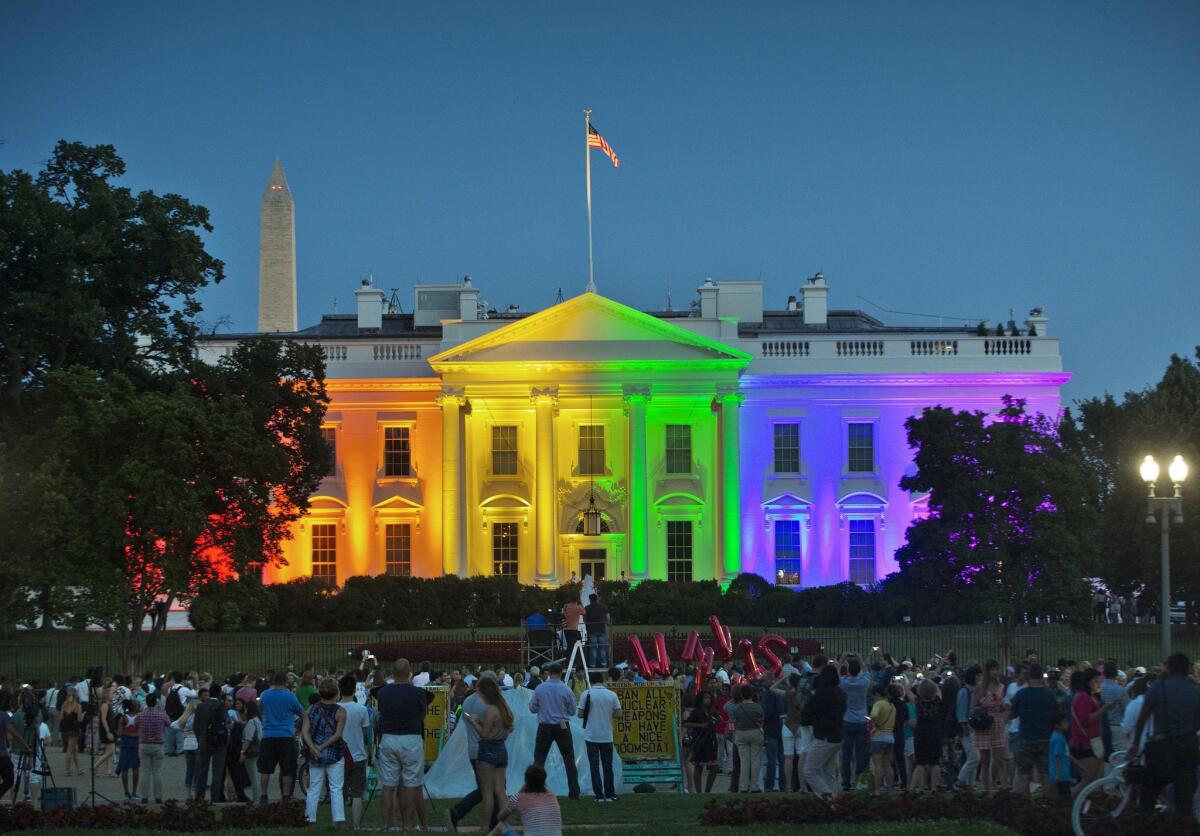
The Supreme Court agreed Monday to consider a case next fall about the rights of people who oppose same-sex marriage — a group that has steadily shrunk in recent years.
Public opinion on same-sex marriage appears to be following the same pattern as views of marriage between people of different races — something that was illegal in many states, controversial when the Supreme Court ruled in its favor in 1967 and now accepted by all but a fairly small minority.
As recently as a decade ago, more than half of Americans said they opposed allowing gay and lesbian couples to marry legally. Today, two years after the Supreme Court ruled that the Constitution requires states to allow same-sex marriages, opposition has fallen to about one-third of the population, according to a new survey released Monday by the nonpartisan Pew Research Center.
Nearly two-thirds now support equal marriage rights for same-sex couples, the survey showed. Other recent surveys have shown similar trends.
Opposition to same-sex marriage remains strongest among white, conservative evangelical Protestants, like the Colorado baker, Jack Phillips, who has brought his challenge to his state’s civil rights law to the Supreme Court. He argues that his cakes are an artistic expression protected by the 1st Amendment and that requiring him to produce them for couples he disapproves of violates his rights.
Among white evangelicals, 35% support same-sex marriage rights, and 59% are opposed. Even among that group, however, support for same-sex marriage rights has grown, the survey showed. The numbers suggest that trend likely will continue.
Among white evangelicals born after 1964 — millennials and members of Generation X — 47% support same-sex marriage. By contrast, among white evangelicals in the baby boom generation and older, just over 25% support same-sex marriage.
That’s in keeping with the trend in society as a whole, in which large majorities among the younger generations support equal marriage rights.
With support growing among evangelicals, who make up a large share of Republicans, the party’s followers are now evenly divided on the marriage issue. Democrats, who were closely divided a decade ago, now overwhelmingly support same-sex marriage.
By contrast, the public is almost equally divided on the issue coming before the high court -- pitting equal rights for same-sex couples against the assertion of religious rights by those who oppose them. A Pew survey nine months ago found 49% of Americans felt that people who offer wedding-related services should be required to treat same-sex couple equally, while 48% said that those with religious objections should exempt.
The latest Pew survey was conducted June 8 to 18 among a national sample of 2,504 adults, it has a margin of error of 2.3 percentage points in either direction for the full sample.
- Share via
Top GOP leader says Senate on track for healthcare vote, but ‘it’s going to be close’
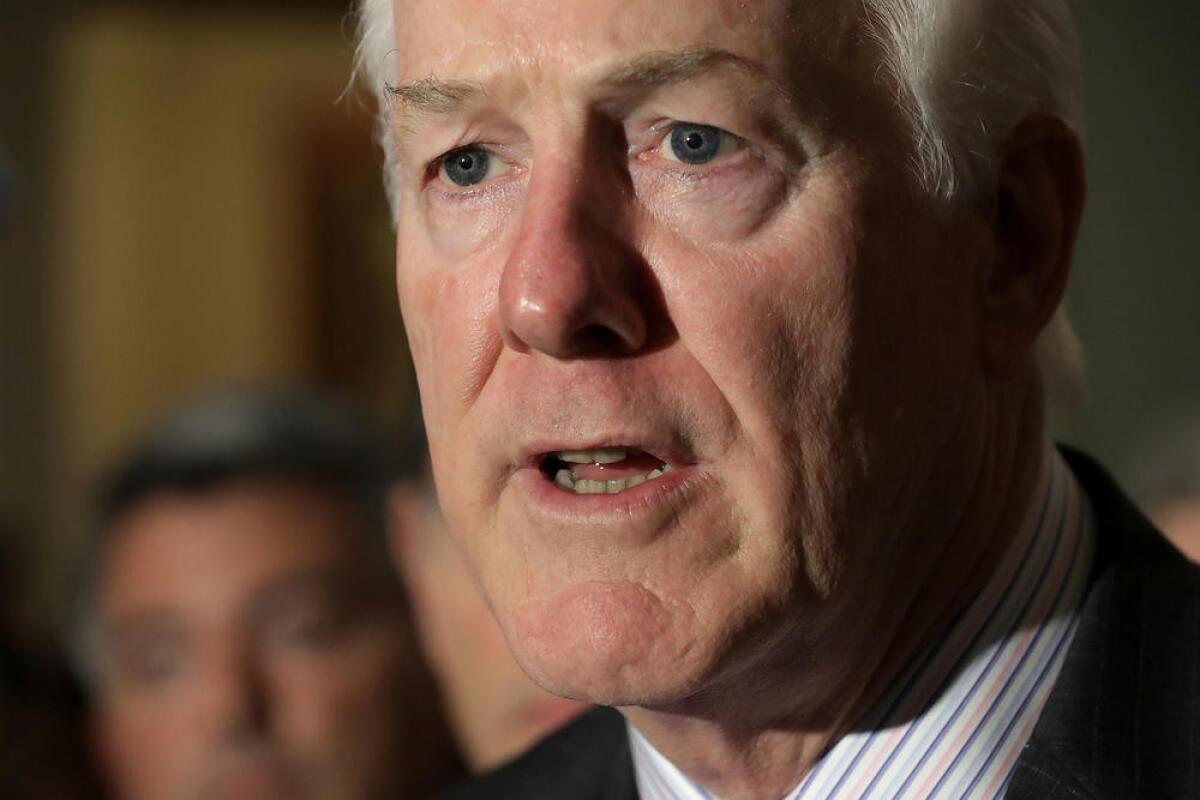
Senate GOP Whip John Cornyn said leaders are working over weekend to bring five Republican senators who oppose the healthcare overhaul on board.
The Senate remains on track to start Wednesday’s procedural votes in hopes of passing the bill next week.
“But it’s going to be close,” the No. 2 Republican told reporters Sunday at the wealthy Koch network’s donor summit.
Cornyn said Trump is “important in the process” but acknowledged hopes for a Fourth of July bill signing expressed by one Republican lawmaker were “optimistic.”
The Texas senator also downplayed criticism from fellow Republicans of a rushed process, saying consumers need relief from spiking premiums.
“It’s not going to get any easier,” he told reporters. “We don’t have the luxury of waiting around.”
- Share via
Analysis: Atop 2017 losses, a sobering challenge for Democrats aiming at Trump next year
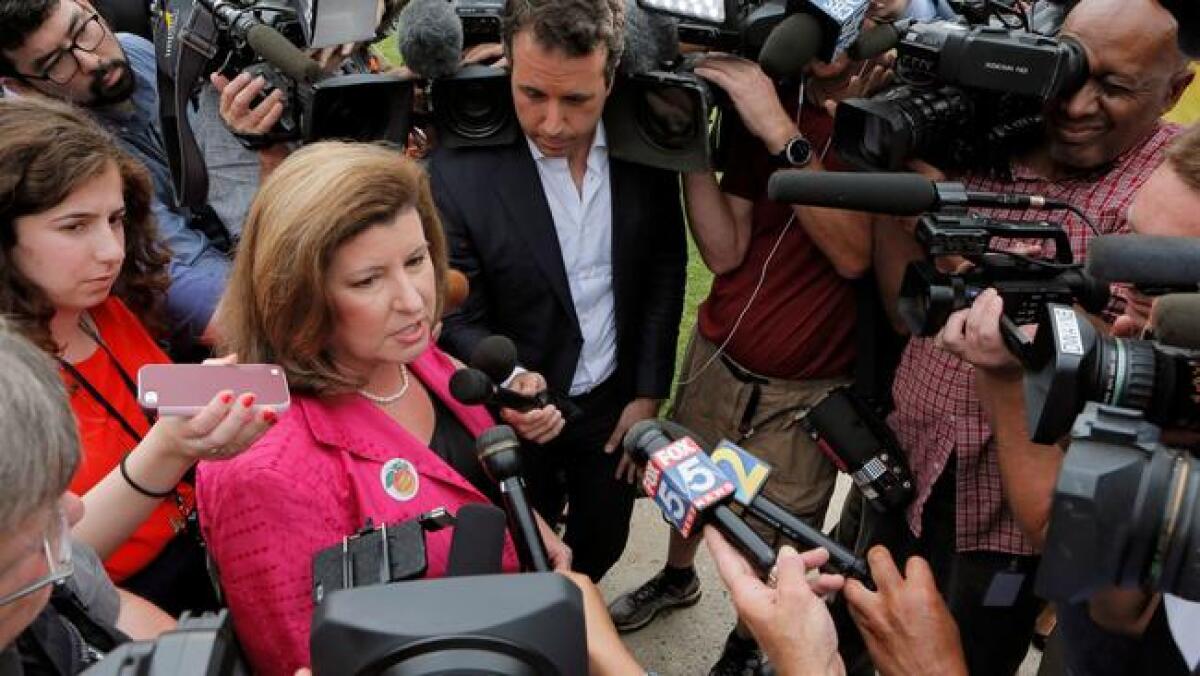
Democrats have hoped that President Trump’s deep unpopularity would propel them to gains in next year’s midterm election as they fight to take control of the House and improve their position in the Senate.
But last year’s contests and this year’s special elections suggest a complication: Trump is so distinctive a politician that it’s hard to persuade voters that other Republican candidates are carbon copies of the president. Trump’s outsized persona makes even those Republicans who share his views seem more moderate, an important attribute to swing voters.
That presents a problem for the party out of power.
Midterm elections traditionally serve as referendums on the president, but voters’ complicated views of Trump may give Republicans more running room than his popularity figures suggest. The votes cast by individual Republican incumbents may be more important to their survival than any linkage with the president.
- Share via
Conservatives at Koch summit outline changes to Senate healthcare bill to win their support
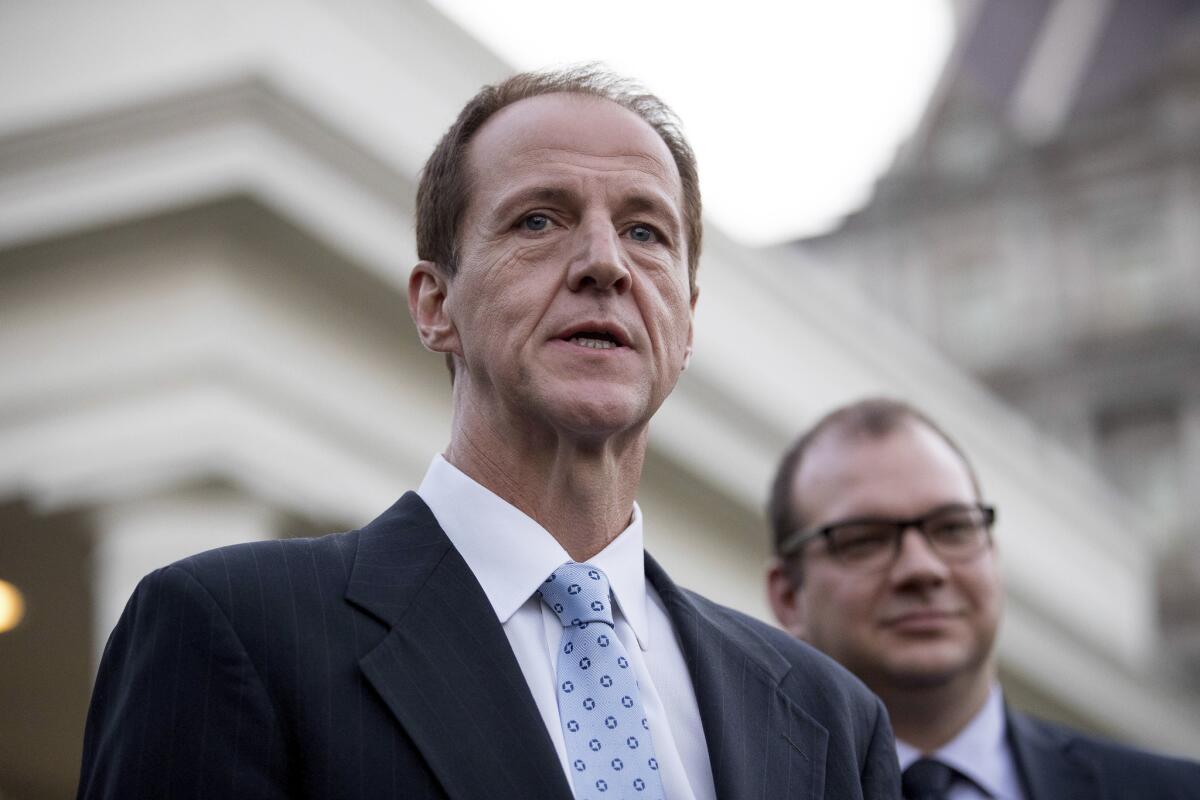
Conservatives floated two amendments for toughening up the Senate’s Obamacare overhaul this weekend at the influential Koch network’s confab of wealthy donors, as Republicans seek ways to win over detractors and tip enough GOP votes for passage.
That the Koch network quickly panned the Senate bill is no surprise. The organization of deep-pocketed conservative advocacy groups similarly rejected the House GOP bill this spring until party leaders tacked on tough amendments to appease right-leaning Republicans.
“We’ve been disappointed that movement’s not been more dramatic toward a full repeal or a broader rollback of this onerous law Obamacare,” said Tim Phillips, who heads Americans for Prosperity, the largest of the Koch network’s advocacy groups.
“But we are not walking away,” he said. “We worked to make the House bill better and it did get better…. We’re doing the same thing on the Senate front.”
One key lawmaker attending the weekend summit at the luxurious Broadmoor Hotel, Rep. Mark Meadows (R-N.C.), the chairman of the House Freedom Caucus and a chief negotiator on the House bill, outlined two key changes to the bill that he said could likely win enough conservative support for passage.
One amendment from Sen. Ted Cruz (R-Texas) would allow companies that offer insurance policies on the Obamacare marketplace to also offer plans that do not meet the ACA’s strict requirements.
Such a change would in essence allow insurers to offer cheaper, though skimpier, policies that may help achieve the GOP’s goal of lowering premiums for consumers.
Another amendment would broaden the ability of those who buy insurance on the marketplace to sock away more money in tax-free Health Savings Accounts to help them pay for their premiums.
Cruz is one of four Senate conservatives who have said they would not support the bill unless changes are made, positioning them for negotiations in the days ahead.
Senate Majority Leader Mitch McConnell (R-Ky.) needs to win back some of their votes to pass the bill with his slim 52-seat Republican majority. One of the conservatives, Sen. Mike Lee (R-Utah), was among those feted Saturday night at a reception with Charles Koch, the billionaire industrialist who funds the conservative network.
Koch told those gathered for an outdoor cocktail reception on a breezy Colorado Springs evening about how far his team has come over the years at promoting what is a libertarian-leaning conservative agenda.
“Now when I look at where we are, at the size and effectiveness of this network, I’m blown away,” he told donors. Koch met Friday with Vice President Mike Pence.
But the politics in the Senate remain difficult as McConnell continues to negotiate behind closed doors and rushes the bill to a vote expected this week.
On Sunday, one key centrist, Sen. Susan Collins of Maine, doubted a swift resolution.
“It’s hard for me to see the bill passing this week,” she said on ABC’s “This Week.”
Another crucial vote, Sen. Bill Cassidy of Louisiana, a physician who had offered his own proposal, also criticized the rush.
“I frankly would like a few more days to consider this,” Cassidy said on CBS’s “Face the Nation.”
But Republicans are anxious to resolve the healthcare debate, which has created a logjam in their legislative agenda.
Meadows also told reporters if the Senate passes the bill this week, the House could quickly follow with a weekend session -- ahead of a Fourth of July bill signing by the president.
- Share via
Schiff: Obama should have acted on Russian interference, but Trump shouldn’t complain
A top House Democrat says President Obama should have reacted more forcefully upon learning of Russian election-meddling, but also asserted that it was illogical for President Trump to levy such criticism against his predecessor.
“I think the [Obama] administration needed to call out Russia earlier, needed to act to deter and punish Russia earlier,” Rep. Adam B. Schiff (D-Burbank), said in an interview aired Sunday on CNN’s “State of the Union.” Failure to do so, he said, had been “a very serious mistake.”
But Schiff, the ranking Democrat on the House Intelligence Committee, said Trump’s criticism of Obama made little sense in light of the current president’s own inaction in the face of decisive U.S. intelligence conclusions about Kremlin efforts to tip the 2016 race to Trump.
Trump, Schiff said, “is in no position to complain here” in light of the fact that as a candidate, he openly urged the Russians to hack Clinton’s emails.
“To criticize Obama is now a bit like someone knowingly receiving stolen property blaming the police for not stopping the theft,” said Schiff, a former prosecutor.
On Saturday, Trump issued a statement on Twitter referencing a Washington Post report a day earlier detailing the previous administration’s wrestling with how, when and whether to make public the degree of Russian interference.
“Since the Obama Administration was told way before the 2016 Election that the Russians were meddling, why no action? Focus on them, not T!” the president tweeted.
The Post report said Obama was worried about the appearance of improperly using mounting intelligence reports about Russian activities to aid Clinton’s candidacy. The subject was particularly inflammatory because at that point in the race, Trump had complained repeatedly about the “rigged” political process and even suggested he might not respect the election outcome.
- Share via
Trump says he’s optimistic about Senate approval of GOP healthcare measure
President Trump says he believes that backers of a sweeping GOP healthcare measure are “going to get there” and pass the measure despite the refusal of five Republican senators to endorse the bill as written.
“Healthcare is a very, very tough thing to get, but I think we’re going to get it,” Trump said on “Fox and Friends” in an interview aired Sunday that he had touted beforehand on Twitter.
“We don’t have too much of a choice because the alternative is the dead carcass of Obamacare,” the president said, referring to the Affordable Care Act, his predecessor’s signature piece of legislation.
Opinion polls have indicated low public support for the version of the healthcare bill passed earlier by the House of Representatives. Senate Majority Leader Mitch McConnell (R-Ky.), wants to bring the Senate version, unveiled days ago, to a vote this week.
In addition to the five Republican senators who have publicly aired their opposition, several others have declined to explicitly endorse the bill, which would overhaul the U.S. healthcare system and set the stage for massive tax breaks that would primarily benefit the wealthiest Americans.
With a 52-seat Republican advantage in the 100-member chamber, only three GOP defections would be sufficient to derail the measure, since Vice President Mike Pence could cast a tie-breaking vote.
- Share via
Pro-Trump group launches new attack ad against special counsel Robert Mueller
A Southern California group backing President Trump is out with a new ad attacking special counsel Robert S. Mueller III, criticizing the investigation into the Trump campaign’s possible cooperation with Russian interference in the 2016 election.
The ad, called “Witch Hunt,” features conservative favorite Tomi Lahren reflecting Trump’s own language to complain about the probe. The more than $400,000 ad buy is expected to start running Sunday.
“Only in Washington could a rigged game like this be called independent,” Lahren says, using air quotes in the ad to emphasize her point. She is now a senior advisor to Great America Alliance, which backs Trump.
The ad’s chief complaint echoes Trump’s criticism that Mueller’s team has ties to Democrats, because some of the lawyers have given campaign contributions to the party. Trump has also complained of the relationship between fired FBI Director James B. Comey and Mueller, who was once his boss.
Mueller is a registered Republican. Among the members of the legal team he is assembling for the Russia probe -- which is also looking into whether the president obstructed the federal investigation by firing Comey -- four have donated to Democrats. One who gave the maximum donation to Trump rival Hillary Clinton also donated to Republicans.
Both Republicans and Democrats have praised Mueller’s credentials and ability to handle the Russia probe as an independent investigation.
The group, which ran a similar attack against Comey ahead of his testimony earlier this month on Capitol Hill, has emerged as a key pro-Trump organization.
- Share via
Amid probe into his campaign’s links to Russia, Trump accuses Clinton of ‘collusion’ against Sanders
President Trump, in a return to campaign-style rhetoric, on Sunday accused Hillary Clinton of engaging in “collusion” in order to win last year’s Democratic presidential nomination.
The presidential statement, issued on Twitter, did not refer directly to a broad-ranging investigation by a special counsel as to whether his own campaign had colluded in the Russian election meddling documented by U.S. intelligence agencies.
But the tweet implied -- as Trump has repeatedly insisted in recent months -- that he is being unfairly maligned over events during and after the 2016 campaign.
In keeping with another of his online habits, Trump coupled a personal attack on an individual with a claim of support. In this instance, he referred to Clinton’s rival for the nomination as “Crazy Bernie Sanders” but also asserted that the Vermont senator had not been allowed to fairly contest the Democratic nomination.
Aides, GOP lawmakers and legal advisors have reportedly implored Trump to stop talking about the Russia investigation on Twitter, even indirectly. Last week, the president walked back a suggestion – made in an earlier tweet – that there might have been “tapes” of his conversations with fired FBI Director James B. Comey.
Trump said Thursday on Twitter that he possessed no such tapes, while vaguely implying that such electronic surveillance might in fact exist. The White House characterized that as its formal response to a demand by congressional investigators that the president produce any existing recordings made by the White House of Trump’s conversations with Comey.
- Share via
Koch brothers’ political network says Senate GOP healthcare bill is insufficiently conservative
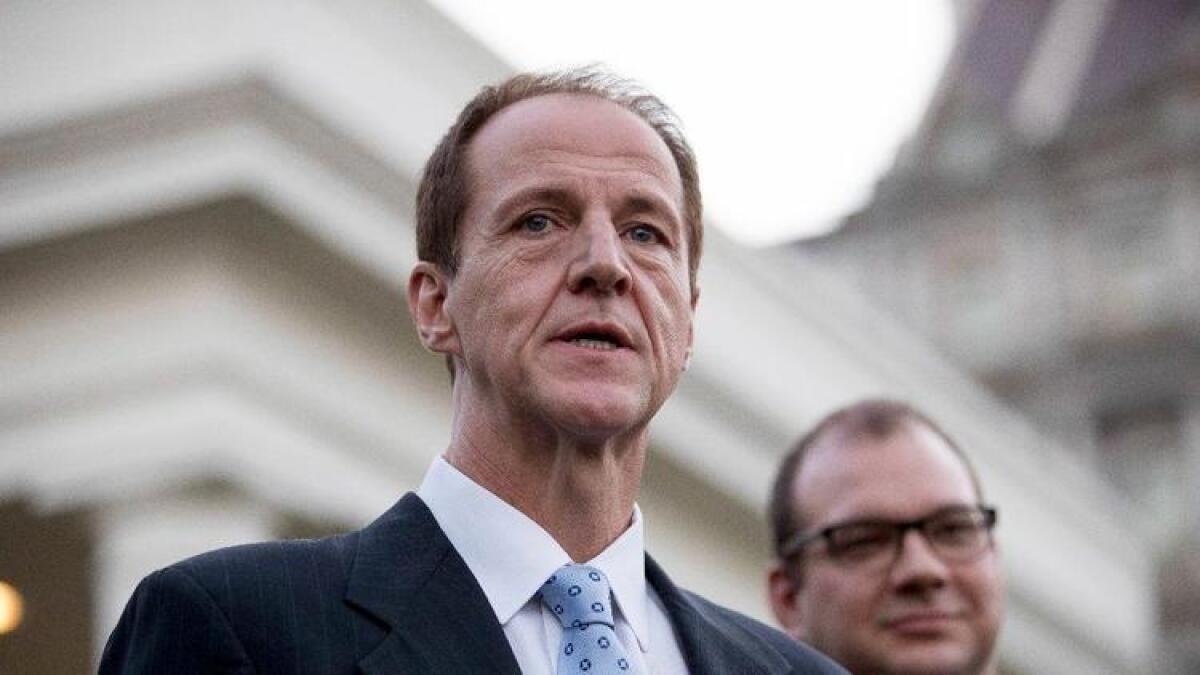
Chief lieutenants in the Koch brothers’ political network lashed out at the Senate Republican healthcare bill on Saturday, becoming a powerful outside critic as GOP leaders try to rally support for their plan among rank-and-file Republicans.
“This Senate bill needs to get better,” said Tim Phillips, who leads Americans For Prosperity, the Koch network’s political arm. “It has to get better.”
Phillips called the Senate’s plans for Medicaid “a slight nip and tuck” over President Obama’s healthcare law, a modest change he described as “immoral.”
The comments came on the first day of a three-day private donor retreat at a luxury resort in the Rocky Mountains. Invitations were extended only to donors who promise to give at least $100,000 each year to the various groups backed by the Koch brothers’ Freedom Partners — a network of education, policy and political entities that aim to promote small government.
No outside group has been move aggressive over the years-long push to repeal Obama’s healthcare law than the Kochs’, which vowed on Saturday to spend another 10 years fighting to change the healthcare system if necessary. The Koch network has often displayed a willingness to take on Republicans — including President Trump — when their policies aren’t deemed conservative enough.
- Share via
Atty. Gen. Jeff Sessions wants to get tough on crime. These people think he’s got it all wrong
Atty. Gen. Jeff Sessions has vowed to crack down on crime by sending more criminals to prison for longer periods of time.
“Every one of our citizens, no matter who they are or where they live, has the right to be safe in their homes and communities from the scourge of criminal gangs, rapists, carjackers and drug dealers,” Sessions said in an address to law enforcement officials in Memphis, Tenn., last month.
In his view, imprisoning more criminals would make families safer, and fewer people would break the law if there were more severe punishments for crimes such as drug offenses.
In a recent memo to federal prosecutors, Sessions instructed them to pursue the harshest punishments legally allowed, a reversal of an Obama-era move giving federal lawyers more leeway to reserve such prosecutions for repeat offenders and people who had committed the worst of crimes.
Department of Justice officials hope the changes at the federal level — where a sliver of crimes across the country is prosecuted — will trickle down to a similar approach to crime in states.
- Share via
Vice President Mike Pence stops in for an unscheduled chat with billionaire Charles Koch
Vice President Mike Pence popped in for a visit this weekend with Charles Koch, the billionaire GOP donor hosting his semi-annual confab of like-minded business leaders assessing their priorities for the White House and Congress.
The meeting was not listed on Pence’s official schedule for the day.
President Trump never much enjoyed backing from Koch ’s sprawling, secretive, political enterprise, which has emerged as a libertarian-leaning power center, sometimes overshadowing the traditional Republican Party apparatus with its high-dollar donors and vast operations. Koch’s group did not endorse the GOP presidential nominee.
But the network has always had close ties with Pence. The vice president had previously attended the exclusive gathering of donors, held this weekend at the luxurious Broadmoor hotel. And his top staff was plucked from a key Koch organization, Freedom Partners.
Pence and Koch and their top aides spoke for nearly an hour late Friday, according to a Koch spokesman. They discussed tax reform, the GOP’s healthcare overhaul and other heavy legislative lifts that have run into resistance in the Republican-controlled Congress. The aide described the talks as casual.
Pence was in the area making other stops, including at the Air Force Academy and an evening fundraiser for GOP Sen. Cory Gardner.
Even without investing in Trump, the Koch network has made impressive strides in advancing its agenda this year. Congress swiftly rolled back more than a dozen regulations, including some intended to protect the environment, that Koch-backed groups complained were too rigorous and invasive in industry operations.
The Koch network groups, including Freedom Partners, a free market-oriented, chamber of commerce-type organization, is pushing the Trump administration and Congress to pass tax reform and overhaul healthcare.
Both those efforts have stalled in Congress amid Republican infighting, but the Koch groups is able to put their army of resources – money, staff and volunteers in the states – to pressure lawmakers to act.
- Share via
Kris Kobach fined for misleading court and refusing to produce previously exposed Trump memo

Kansas Secretary of State Kris Kobach has been fined $1,000 for misleading a federal court in an effort to keep two documents private.
The American Civil Liberties Union filed a lawsuit last year against Kobach arguing that his state’s proof of citizenship law violates the National Voter Registration Act. ACLU lawyers asked Kobach to produce two documents they said pertained to the case.
One of those documents was a draft of a proposed amendment to the National Voter Registration Act. The second was a document that had been photographed and widely shared in late November after Kobach met with then-President-elect Donald Trump. The power of a zoom lens exposed certain details of his proposal to Trump to deport potential terrorists.
In a 24-page ruling made public Friday, U.S. Magistrate Judge James O’Hara wrote that Kobach did not accurately represent the contents of the documents when he argued against producing them.
“Defendant refused to produce these documents, asserting that they are beyond the scope of reopened discovery, do not seek relevant information, and are protected by the attorney-client, deliberative-process, and executive privileges,” the judge wrote.
The court took Kobach at his word, O’Hara wrote, but upon review of the documents – produced under a court order – found that they did relate to the voting rights case.
The judge wrote that while the court could not say that Kobach “flat-out lied,” the “defendant’s statements can be construed as wordplay meant to present a materially inaccurate picture of the documents.”
For now, the documents will remain classified, as Kobach designated them. But, O’Hara wrote, that status could change.
Trump tapped Kobach last month to serve as vice chairman of a presidential commission that would oversee a voter fraud investigation.
- Share via
Number of refugees admitted to U.S. drops by almost half
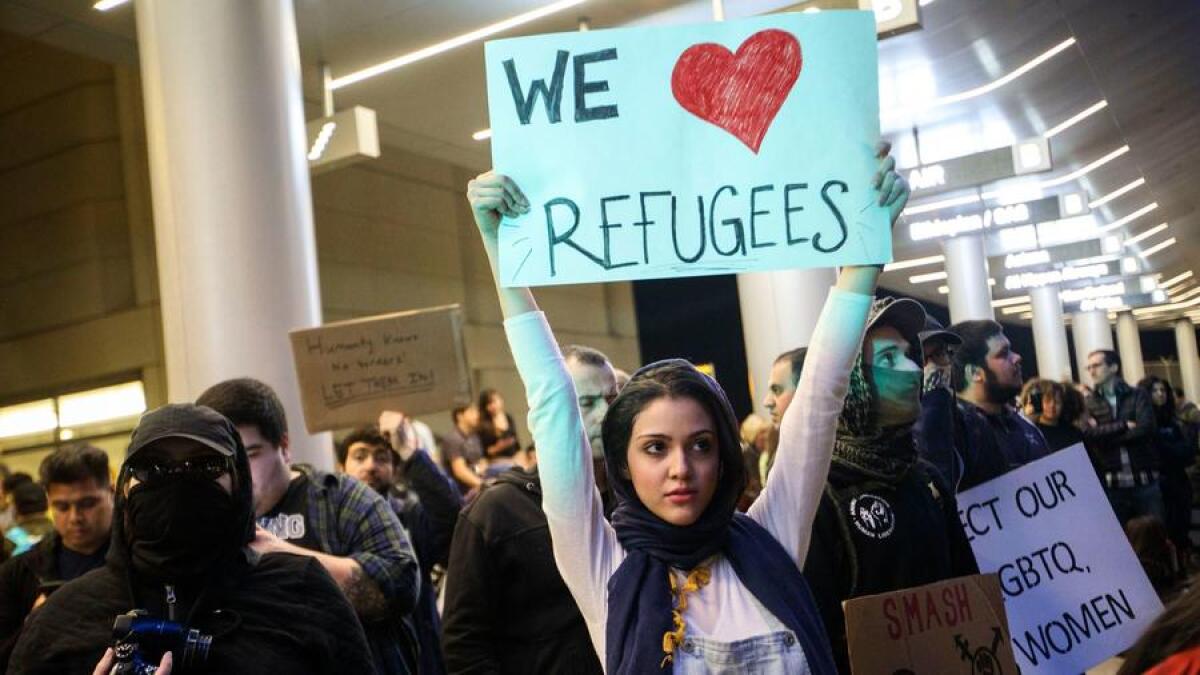
The number of refugees admitted to the United States was cut by nearly half in the first three months of the Trump administration compared with the final three months of the Obama presidency, reflecting the new president’s skepticism toward immigration.
Government statistics released Friday showed that more than 25,000 refugees were permitted to enter and reside in the United States at the end of the Obama administration. In the initial months under President Trump, the number fell to 13,000.
The statistics were released by the Department of Homeland Security, based on information supplied by the State Department.
Countries of origin were largely unchanged. In both periods, two-thirds of the arrivals came from five countries: the Democratic Republic of the Congo, Syria, Iraq, Somalia and Myanmar.
Refugees from two of those countries — Syria and Somalia — would have been banned under Trump’s executive order against entries from certain Muslim-majority nations, but federal courts have blocked the order. Trump’s original order covered Iraqis as well, but he omitted Iraq from his revised order.
The data suggest that the Obama administration, as it was about to turn over power to Trump, significantly stepped up the number of refugees admitted. Arrivals in its final three months reflected an 86% year-over-year increase compared to the same period the previous year.
In Trump’s first three months, arrivals were 12% lower than for the same period in the previous year.
Trump has sought to limit the number of refugees to 50,000 this year. But adverse rulings in the courts could work against him.
The United States already has one of the lowest quotas of refugee admissions among major receiving countries. Nations closer to conflict zones such as Syria have taken in millions of refugees.
More people have been displaced from their home nations, because of violence and poverty, than at any time since World War II.
- Share via
Trump nominates former Dodgers co-owner Jamie McCourt as ambassador to Belgium
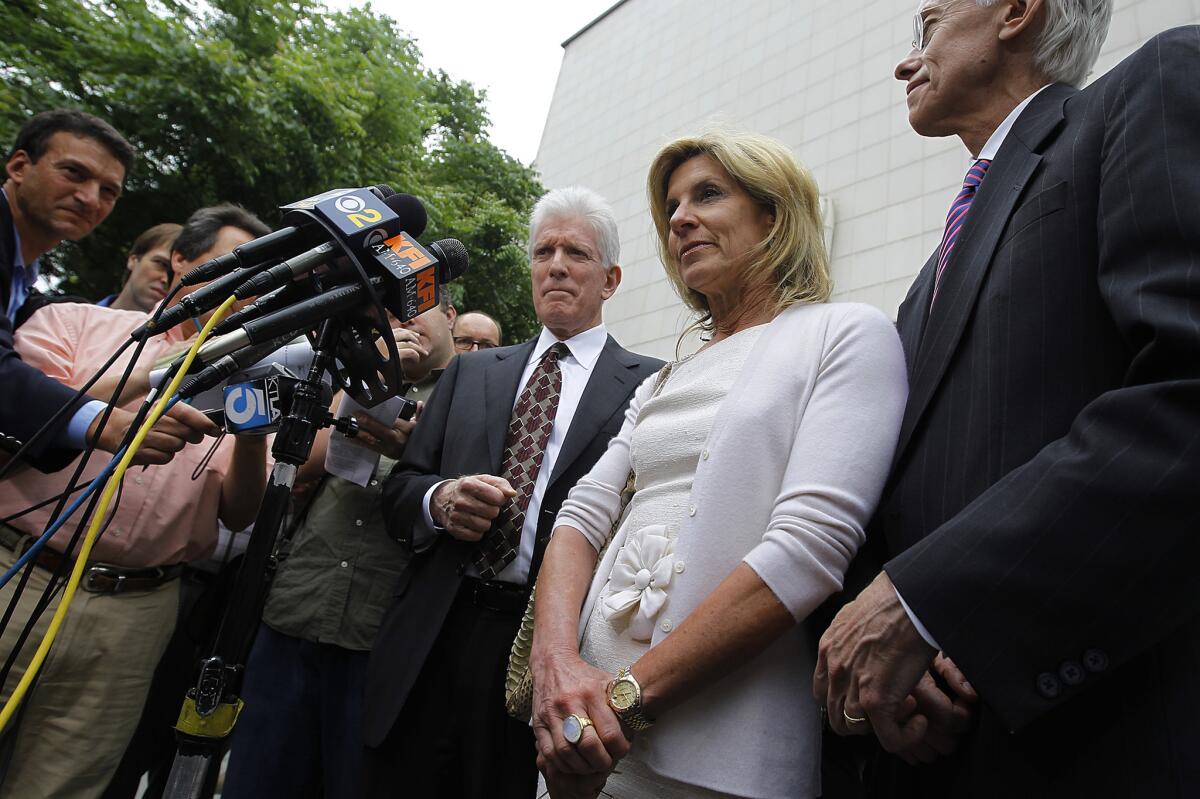
President Trump nominated Jamie McCourt, former co-owner of the Los Angeles Dodgers, to be the ambassador to Belgium on Thursday night.
McCourt, who co-owned the Dodgers with her husband, Frank, until their messy 2011 divorce, has donated money to several Republican organizations, including funds for Trump’s campaign and his transition to the White House.
McCourt was among many business leaders who signed their support for Trump early on in his campaign, praising his plan for economic development and growth. In the months leading up to Trump’s victory, McCourt gave more than $400,000 to the “Trump victory” fund, according to data from the Federal Election Commission. She signed a letter in October 2016 with 100 other business executives and CEOs championing Trump’s plan and criticizing opponent Hillary Clinton for having “thrown in the towel on strong economic growth.”
McCourt was listed as a 2016 State Victory Finance Chair for Trump’s campaign in July, according to a report from the GOP. Robert Wood Johnson, chairman and CEO of the New York Jets and Trump’s nominee for ambassador to the United Kingdom of Great Britain and Northern Ireland, was also on the list as Trump Victory vice chair.
After Trump won the election, McCourt continued to financially support his transition to office. In December, she helped host a fundraiser breakfast for the incoming president where tickets sold for $5,000 a piece.
Prior to her support for Trump, McCourt also donated to the campaigns of several other Republican presidential candidates, including John Kasich, Marco Rubio and Carly Fiorina, although in much smaller amounts.
In the past, she has also supported former President Obama, contributing to his campaign and victory funds in 2011 and donating $50,000 to the inauguration in 2009. She donated about $2,000 to Hillary Clinton for her presidential campaign in 2007, according to the FEC.
McCourt’s ex-husband said his former wife had political aspirations of her own, with an end goal of ending up in the White House, according to a March 2010 Los Angeles Times article. Her high-profile divorce gathered a lot of public attention and ended in dispute over finances and assets.
McCourt has founded and directed entrepreneurial enterprises in Los Angeles and Boston throughout her career as a entrepreneur and attorney. Her investment firm, Jamie Enterprises, invests in real estate and technology start-ups. She has degrees from Georgetown University, the University of Maryland School of Law and from MIT/ Sloan School of Management.
The Senate must confirm McCourt’s nomination for ambassador.
- Share via
Nevada Sen. Heller -- a key swing vote -- says he opposes Senate healthcare bill
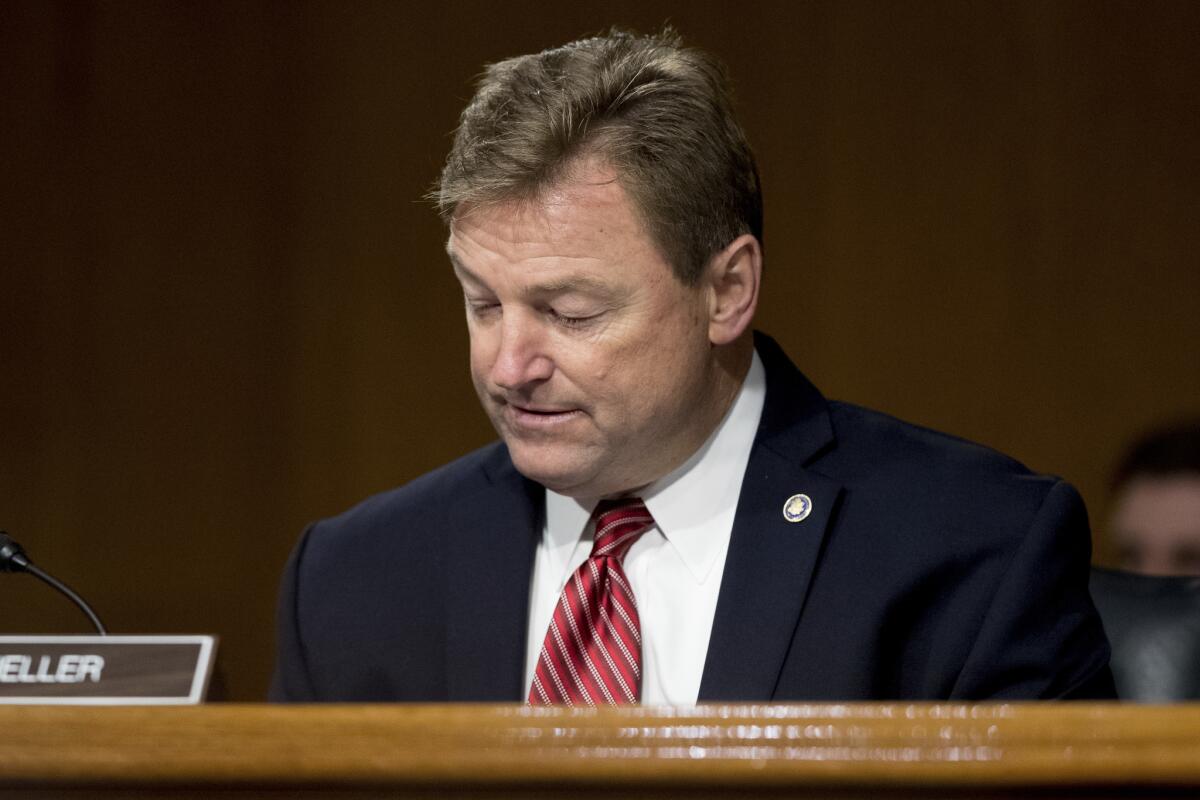
Nevada Sen. Dean Heller said Friday that he planned to vote against the Republican healthcare bill, a potentially key defection.
Although the White House and Majority Leader Sen. Mitch McConnell of Kentucky have said they plan further negotiations over the bill, “it’s going to be very difficult to get me to a yes,” Heller said at a news conference in Nevada with Gov. Brian Sandoval (R).
The bill unveiled Thursday by McConnell is “simply not the answer,” he said. “In this form, I will not support it.”
Given the unified Democratic opposition to the bill, McConnell can afford to lose only two Senate Republicans, so Heller’s announcement is significant.
A no vote by Heller would not seal the fate of the bill, however. Heller is widely viewed as the most vulnerable Republican senator up for reelection in 2018 -- the only one running in a state that Hillary Clinton carried last year -- and Republican leaders have been hoping to avoid having to count on his vote.
Heller cited several reasons for opposing the bill, but the chief one was its deep reductions in federal support for Medicaid.
“This bill will mean a loss of coverage for millions of Americans and many Nevadans,” he said.
Nevada, under Sandoval, has used its authority under the Affordable Care Act to expand Medicaid, which has given health coverage to more than 210,000 additional state residents, Sandoval said.
“These are folks who are worth fighting for,” he added.
The cutbacks the Senate bill, which would end Medicaid expansion, would cost the state $120 million a year by 2022, with the cost rising sharply after that the governor said. “That’s a cost that the state cannot sustain.”
Heller also cited the bill’s impact on treatment for opioid addiction and the likelihood that the plan would fail to reduce premiums.
“There isn’t anything in this piece of legislation that will lower your premiums,” he said, contradicting one of the main arguments that supporters of the bill have made.
Heller’s announcement increases the pressure on McConnell to find ways of persuading several other reluctant senators to support the bill.
Four conservatives, Sens. Rand Paul of Kentucky, Mike Lee of Utah, Ted Cruz of Texas and Ron Johnson of Wisconsin, said Thursday they were opposed to the bill in its current form because it does not go far enough to roll back the Affordable Care Act.
Several more centrist senators, including Sens. Susan Collins of Maine, Lisa Murkowski of Alaska, Rob Portman of Ohio and Shelley Moore Capito of West Virginia, have voiced concerns similar to Heller’s about the depth of the bill’s Medicaid cutbacks and its impact on opioid treatment.
Collins and Portman have both said they want to review the analysis of the bill from the Congressional Budget Office before making up their minds. The budget office has said it will release that assessment early next week.
- Share via
Trump signs VA reform bill to make it easier to discipline and fire employees
President Trump signed into law Friday a bill that will ease restrictions on the discipline and termination of employees from the troubled veterans affairs department.
The Accountability and Whistleblower Protection Act of 2017 is designed to speed up the process to discipline an employee for misconduct and put more decision-making power in the hands of Secretary of Veterans Affairs David Shulkin.
The act is in response to the 2014 VA scandals involving long wait times for medical care and attempts by VA employees to cover up the delays.
Trump, who promised to improve healthcare for veterans during his campaign, said the bill was one of the largest reforms to the VA in its history and is “essential to making sure our veterans are treated with respect.”
The bill passed the House with bipartisan support June 13 and the Senate on June 6. Although the bill is widely supported by veterans advocacy groups, civil servant unions condemn the legislation as a way to get around long-standing protections for government employees and whistle-blowers.
The reform, Shulkin said, will not be used as a “tool for mass firings,” but rather a way to raise morale throughout the department and attract new employees. “Slow, steady, incremental change isn’t what this organization needs,” Shulkin said. “Right now, I believe this is progress.”
- Share via
Mexico pushes back against Trump’s tweet calling it the second deadliest country in the world
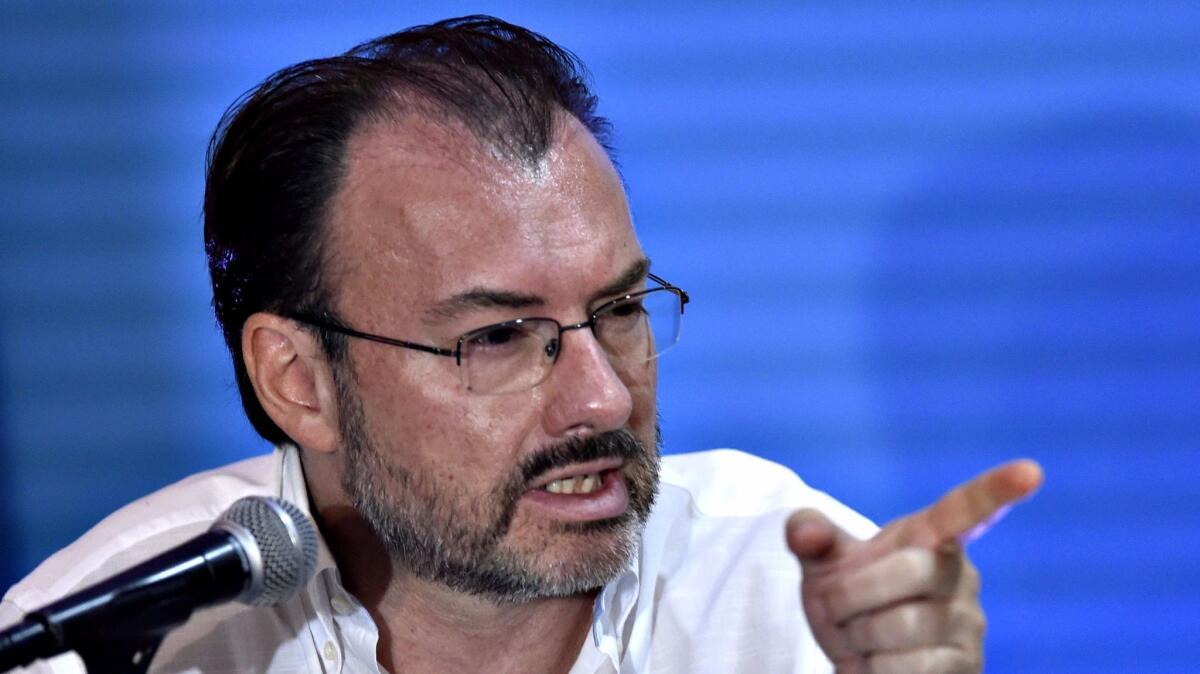
After President Trump incorrectly tweeted that Mexico is the second deadliest country in the world after Syria, the Mexican government responded quickly.
No, Mexico isn’t the second deadliest place on the globe, said a tersely worded statement issued by Mexico’s secretary of foreign relations, pointing to a host of other Latin American countries that have higher per capita murder rates.
And while homicides have been rising in Mexico in recent years, rising violence in Mexico is inextricably linked to demand for drugs in the United States, the statement said.
“Illicit drug trade is indeed the most important cause of violence in Mexico and drug trafficking is costing thousands of lives both in Mexico and the U.S.,” the foreign ministry said Thursday. “However, as has been repeatedly stated by the U.S. government itself, drug trafficking is a shared problem that will end only by addressing its root causes: high demand for drugs in the U.S. and supply from Mexico and other countries.”
“In order to be effective, we must be able to move beyond finger-pointing,” the statement said.
The Mexican government issued the response after Trump tweeted a reference to a controversial recent study that ranked Mexico as the world’s second most-dangerous conflict zone after Syria.
Trump misrepresented the study in his tweet, saying “Mexico was just ranked the second deadliest country in the world.” He also neglected the considerable debate about the study’s accuracy.
The annual Armed Conflict Survey, released this year by the International Institute for Strategic Studies, has been called into question by the Mexican government and others who say it wrongly points to the existence of an armed conflict in Mexico.
“The existence of criminal groups is not sufficient criteria to speak of a non-international armed conflict,” said a joint statement issued by Mexico’s secretaries of governance and foreign relations in May, adding that drug-war violence is part of a bigger regional problem.
Although Mexico’s homicide rate has soared — the first two months of 2017 were the most violent since the government started releasing such statistics in 1997 — other countries are experiencing higher homicide rates.
In January, Mexico had a homicide rate of 20 deaths per 100,000 people, according to a Times analysis of Mexican crime statistics.
By comparison, El Salvador’s homicide rate was 81 deaths per 100,000 people in 2016, according to InSight Crime, a think tank that studies organized crime in Latin America. Venezuela had a homicide rate of 59 deaths per 100,000 people.
Trump ended his tweet with a frequent campaign mantra: “We will BUILD THE WALL!”
- Share via
Supreme Court says final decisions of term will come on Monday
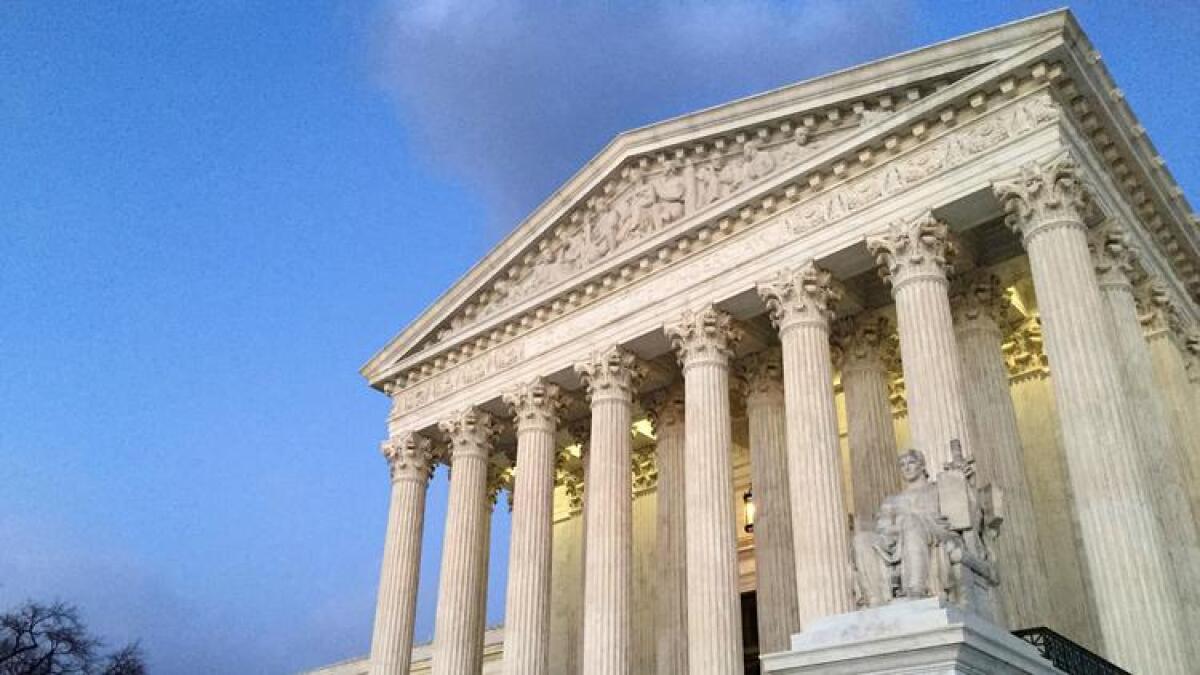
The Supreme Court announced it will hand down its final rulings for this term on Monday.
But that does not mean the justices will actually decide the six cases that remain, which include three significant disputes involving immigration and the U.S. borders.
Here’s a look at the notable decisions so far.
On Nov. 30, with one seat on the court still vacant, the eight justices heard arguments in a Los Angeles case on whether noncitizens who face possible deportation can be held in jail indefinitely or instead have a right to a bond hearing after six months. The case, Jennings vs. Rodriguez, has taken on added importance in the Trump era, but the long delay may signal that the justices are split 4-4.
If so, the court may announce Monday that the case will be reheard in the fall, leaving it to new Justice Neil M. Gorsuch to cast the tie-breaking vote.
Also still pending, since January, is a California case that will decide whether a crime such as breaking into an empty home qualifies as a “crime of violence,” triggering automatic deportation, even for an immigrant who is a longtime legal resident. A ruling in Sessions vs. Dimaya could affect thousands of deportations
The third case, pending since February, is a closely watched border shooting. At issue in Hernandez vs. Mesa is whether a U.S. agent can be sued for fatally shooting a 15-year-old who was standing on the Mexican side of the border.
On Friday, the justices gave a second chance to a Korean restaurant owner from Memphis who faces deportation for selling Ecstasy pills. Based on his lawyer’s advice, he pleaded guilty to the drug charge, having been assured it would not trigger his deportation.
The lawyer was wrong. By a 6-2 vote in Lee vs. United States, the court said the Korean man may withdraw his guilty plea and go to trial. “But for his attorney’s incompetence,” he “would not have accepted a plea,” said Chief Justice John G. Roberts Jr.. Dissenting were Justices Clarence Thomas and Samuel A. Alito Jr..
The justices, including Gorsuch, are likely to rule in a significant case on religion and funding for church schools. In Trinity Lutheran vs.Comer, the justices will decide whether states may exclude church schools from receiving public funds.
Also still pending, but on a different track, is the Trump administration’s appeal over his blocked foreign travel ban. The court may act on that appeal at any time.
- Share via
Trump backs L.A. Olympic bid in meeting with IOC officials

President Trump “pledged his full support” for the Los Angeles bid to host a future Summer Olympics, the White House said Friday after an Oval Office meeting with the head of the International Olympic Committee.
Trump met Thursday with IOC President Thomas Bach and three U.S. members of the IOC -- Larry Probst, Anita DeFrantz and Angela Ruggiero.
A White House official called it a “very constructive conversation” in which Trump backed a potential third Summer Games in Los Angeles.
With only L.A. and Paris bidding to host the 2024 games, the IOC is moving to reward both cities, giving one hosting duties in 2024 and the other in 2028.
The United States hasn’t hosted a Summer Olympics since the Centennial games in Atlanta in 1996. Salt Lake City hosted the Winter Olympics in 2002.
Los Angeles Mayor Eric Garcetti said he discussed the city’s Olympic bid during a post-election conversation with Trump last November and that the then-president elect pledged his backing.
- Share via
Trump says he tweeted about tapes to influence Comey’s account of their private conversations
President Trump called it “bothersome” that the special counsel now overseeing the Russia probe was “good friends” with fired FBI Director James B. Comey, and said he hinted at having tapes of his private conversations — apparently falsely — to try to influence Comey’s eventual testimony.
The president made his remarks during an interview that aired Friday morning on “Fox & Friends,” but was recorded on Thursday just hours after he tweeted that he did not, in fact, have tapes. Trump said that floating the possibility they did exist might have forced Comey “to tell what actually took place at the events.”
“When he found out that, I, you know, that there may be tapes out there, whether it’s governmental tapes or anything else, and who knows, I think his story may have changed,” Trump said. “My story didn’t change. My story was always a straight story.”
Fox’s Ainsley Earhardt followed up: “So it was a smart way to make sure he stayed honest in those hearings?”
“It wasn’t very stupid, I can tell you that,” Trump answered.
Many disagree, including Republicans. Comey testified that Trump’s tweet is what prompted him to ask a friend to slip contemporaneous memos of his conversations with Trump to reporters, to “get that out into the public square.”
In his accounts and his subsequent testimony to Congress, Comey conveyed his concerns that the president was asking him to drop the various Russia-related investigations, a request suggestive of obstruction of justice, and that Trump might lie about their encounters.
By getting the content of his memos into the news, “I thought that might prompt the appointment of a special counsel,” Comey told the Senate Intelligence Committee.
It did. Deputy Atty. Gen. Rod Rosenstein named Robert Mueller, a widely regarded lawyer who served as FBI director for more than a decade before Comey, to oversee the Russia probe.
Trump continued to disparage the investigation, which he repeatedly has called “a witch hunt” into the “hoax” that is allegations about Russia’s ties to his campaign. But in the interview he stopped short of saying Mueller should now recuse himself.
“We’ll have to see,” he said. “I can say that the people that have been hired are all Hillary Clinton supporters. Some of them worked for Hillary Clinton. I mean the whole thing is ridiculous, if you want to know the truth, from that standpoint.”
“But Robert Mueller is an honorable man and hopefully he’ll come up with an honorable solution.”
Some investigators and lawyers hired by Mueller reportedly contributed to Clinton. Yet so has Trump.
In 2007, Trump made a $600 donation to Clinton’s presidential campaign; his son, Donald Jr., made two separate donations totaling $4,000. In the 2008 and 2010 campaign cycles, Trump donated tens of thousands of dollars to individual Democrats and party committees, including former Senate Majority Leader Harry Reid (D-Nev.) and the current Senate Democratic leader, Sen. Charles E. Schumer — “Cryin’ Chuck,” as Trump calls him.
- Share via
Let the political jockeying begin as Republican senators deal on Obamacare repeal
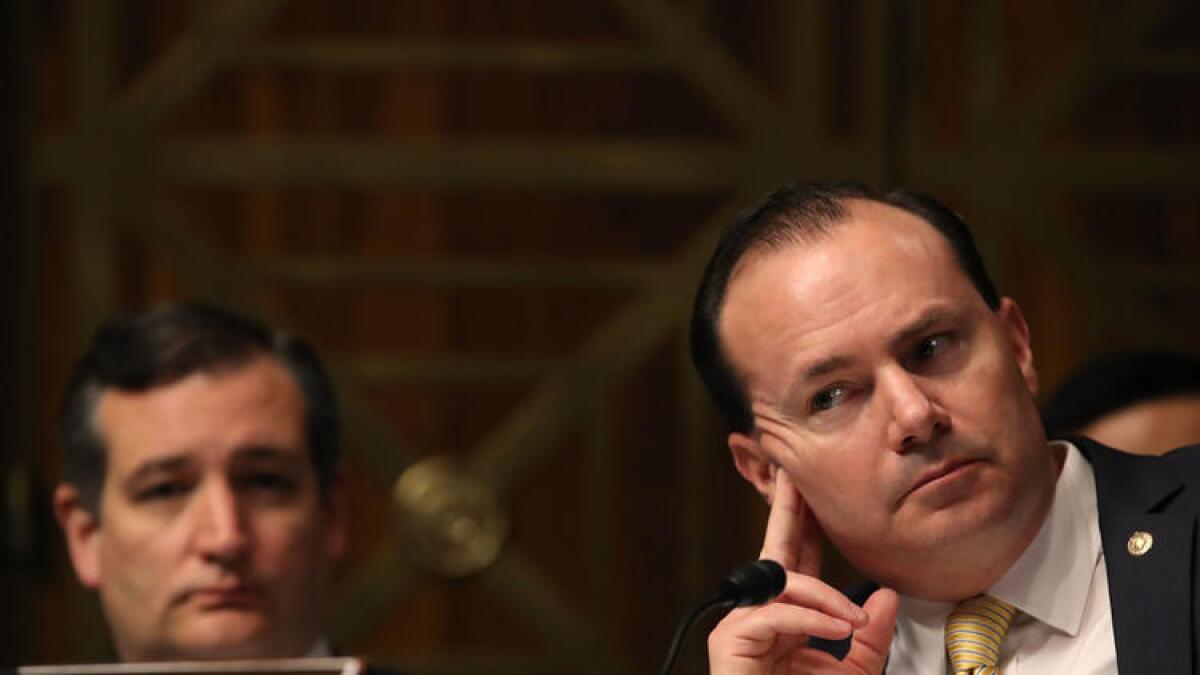
Get ready for a drama-filled week of mock hand-wringing, political jockeying and backroom brinkmanship as the Senate GOP healthcare plan heads toward a hoped-for vote next week.
No sooner did Senate Majority Leader Mitch McConnell unveil the long-awaited Obamacare overhaul Thursday than Republican senators started openly negotiating what it would take to win their votes.
Within just a few hours, four key conservative senators — Ted Cruz of Texas, Mike Lee of Utah, Ron Johnson of Wisconsin and Rand Paul of Kentucky -- jointly announced they could not possibly vote for the bill as is, unless it more fully guts the Affordable Care Act.
Likewise, centrists withheld their support unless they can push the bill the other way, as they mull the fallout from leaving millions more Americans uninsured.
Even President Trump — who called the House overhaul bill “mean” — initially withheld his endorsement, suggesting “a little negotiation” would make the Senate version “very good.” Later in the day he tweeted he was “supportive” but looked “forward to making it very special!”
Almost certainly McConnell opened the door to the haranguing by presenting the legislation as a “discussion draft” and inviting input to make it better.
After being widely panned by Democrats and Republicans alike for crafting the bill with unprecedented secrecy keeping details even from GOP senators, McConnell may now be eager to convey a sense of open debate and negotiation.
But if the process that played out in the House last month is any guide, expect the dealing-making to only go so far before Republicans quickly unify — preferring to hold hands and jump off the political cliff together rather than risk losing their best opportunity to fulfill the Republican promise to stop the Obamacare.
- Share via
Senate Obamacare repeal plan would slash federal healthcare funding for Medicaid
Senate Republicans unveiled a draft bill on Thursday to roll back the Affordable Care Act, including a drastic reduction in federal healthcare spending that threatens to leave millions more Americans uninsured, drive up costs for poor consumers and further destabilize the nation’s health insurance markets.
The legislative outline, which Senate Majority Leader Mitch McConnell’s team wrote largely behind closed doors, hews closely to the Obamacare repeal bill passed last month by House Republicans, though it includes important differences. The House version was first celebrated by President Trump in a White House Rose Garden ceremony, though he later criticized the bill as “mean.”
Like the House bill, the Senate plan would eliminate hundreds of billions of dollars in taxes over the next decade, with large benefits for the wealthiest Americans. And like the House bill, it would pay for those cuts by dramatically reducing federal money for Medicaid, likely forcing states to make deep cuts in their healthcare programs for the poor. Trump promised during his campaign not to reduce Medicaid.
Although the Senate bill preserves premium subsidies that help some low-income buyers purchase insurance, it would scale them back significantly.
The reductions in federal spending for healthcare, which would be the largest rollback of the federal health safety net in history, drew sharp criticism from patient groups, doctors and some insurers.
McConnell hopes to call a vote on the measure next week, all but daring Republican holdouts to oppose it and prolong what has already been a politically painful process to fulfill their promise to do away with Obamacare.
- Share via
More than 40 protesters arrested in ‘die-in’ at Capitol. Many forcibly removed from wheelchairs
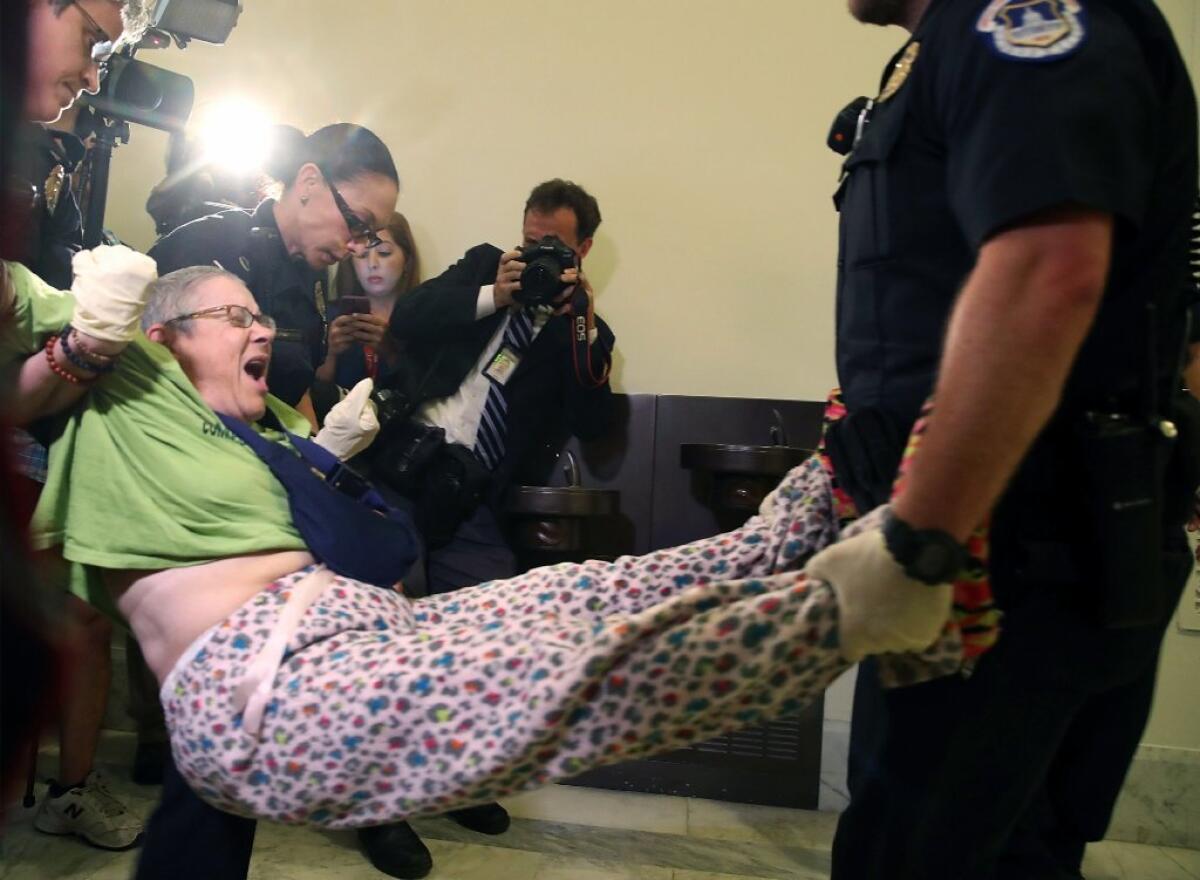
Dozens of disabled men and women were arrested after participating in a “die-in” protest outside of Senate Majority Leader Mitch McConnell’s office at the Capitol.
The demonstration, organized by the national disability group ADAPT, was staged in response to the Senate GOP’s healthcare plan, which proposes drastic cuts to Medicaid. It’s the primary source of funding for services that allow the disabled to live at home, sparing them from institutionalization.
Capitol Police say they arrested 43 people. According to spokesperson Eva Malecki, “many of the demonstrators, as part of their protest activities, removed themselves from their wheelchairs and lay themselves on the floor, obstructing passage through the hallway and into nearby offices.”
Several videos captured the scene in the marble hallway.

Protesters outside Senate Majority Leader Mitch McConnell’s office were removed from the area after staging a “die-in” on Capitol Hill on Thursday morning.
“No cuts to Medicaid!” one woman shouted as Capitol Police lifted her out of her wheelchair.
One man was lifted from the area by his arms and legs.
Another woman was wheeled away.
The protest fell on the 18th anniversary of Olmstead vs. LC – a 1999 Supreme Court ruling that said states must provide funding for the disabled to allow them to live at home. It recognized their rights to live in communities, rather than institutions.
“Here we are 18 years later and we are still fighting for our freedom from incarceration,” organizer Nancy Salandra said in a statement before the protest.
- Share via
After building suspense, Trump says he doesn’t have tapes of Comey conversations
President Trump chose the day that secretive Senate Republicans released their much-anticipated healthcare bill to finally end some suspense of his own making: No, he hasn’t been surreptitiously recording conversations in the White House.
In Twitter messages posted just before a scheduled White House news briefing Thursday, the president did not entirely rule out the possibility that recordings of his private conversations — with fired FBI Director James B. Comey or anyone else — exist.
But, he wrote, “I did not make, and do not have, any such recordings.”
It was Trump who first suggested more than a month ago that he might have recordings. As he feuded publicly with Comey in the days after firing him May 9, Trump warned in a tweet: “James Comey better hope that there are no ‘tapes’ of our conversations before he starts leaking to the press!”
That tweet apparently backfired on the president. Comey has said he decided then to divulge his own contemporaneous notes of private meetings with Trump, in the hope — subsequently realized — that the Justice Department would name a special counsel to probe possible ties between Russia and the Trump campaign, and including whether the president sought to obstruct justice by urging Comey to end the FBI investigations into that and related matters.
The White House has refused to confirm or deny that Trump had been recording his conversations. And when Trump himself was asked about it at a news conference this month, he promised to answer the question at a time of his choosing. Reporters wouldn’t like the answer, he added mysteriously.
Trump has shown an uncanny ability to redirect media attention away from unflattering subjects onto other matters, even if they are hardly favorable to him.
The acting Republican chairman and senior Democrat in charge of the House Intelligence Committee’s Russia investigation had given the White House a June 23 deadline to produce any recordings that might exist of Trump’s conversations with Comey.
- Share via
‘Pizzagate’ gunman sentenced to 4 years

A North Carolina man who fired an assault rifle inside a District of Columbia restaurant during his investigation of a conspiracy theory dubbed “Pizzagate” has been sentenced to four years in prison.
Edgar Maddison Welch was sentenced Thursday in federal court in Washington. His attorney had asked that he be sentenced to 1 1/2 years in prison. Prosecutors asked for 4 1/2 years.
Welch pleaded guilty in March and acknowledged that he entered the Comet Ping Pong restaurant Dec. 4 with an AR-15 assault weapon and a revolver. He said he drove to the restaurant from North Carolina to investigate an unfounded conspiracy theory about Democrats harboring child sex slaves at the pizza restaurant.
No one was physically injured, but the judge says Welch’s actions “literally left psychological wreckage.”
- Share via
Watch: Capitol Police remove protesters staging a health plan ‘die-in’ outside Sen. McConnell’s office

Protesters outside Senate Majority Leader Mitch McConnell’s office were removed from the area after staging a “die-in” on Capitol Hill on Thursday morning.
Protesters outside Senate Majority Leader Mitch McConnell’s office were removed from the area Thursday morning after staging a “die-in” on Capitol Hill.
The protesters staged the action in opposition to the Senate’s version of the Affordable Care Act repeal plan unveiled Thursday. McConnell is hoping to push the measure through the Senate next week.
- Share via
Trump says he has no tapes of his conversations with Comey
Again using Twitter, President Trump on Thursday addressed the controversial questions of whether there were tapes of his conversations with fired FBI Director James B. Comey.
The president fired Comey in May and then tweeted that the lawman, who was overseeing the investigation into Russian interference in the presidential election and possible contacts between Trump’s campaign and Russian officials, “better hope that there are no ‘tapes’ of our conversations before he starts leaking to the press.”
At Comey’s recent hearing before the Senate Intelligence Committee, the former FBI chief said he hoped there were tapes, and gave his consent to release any that might exist.
- Share via
Pelosi on rumbles for new leadership: ‘I’m worth the trouble, quite frankly’
House Minority Leader Nancy Pelosi on Thursday dismissed calls from some in her party who say it’s time for her to step aside.
A handful of Democrats have publicly said that after losing four special elections since January, especially a race in the Atlanta suburbs earlier this week, and failing to regain the majority in the House in the last four national elections, their party needs new leadership in the House. Others have privately said Pelosi weighs down Democrats and could prevent the party from retaking the House in the upcoming midterm elections.
In her weekly news conference, the San Francisco lawmaker called herself a “master legislator” and a “strategic, politically astute leader” who can raise a lot of money and has experience winning a majority in Congress.
With Republicans controlling both chambers, and President Trump in the White House, now isn’t the right time for new leadership, she said.
“I’m worth the trouble, quite frankly,” she said. “I love the fray.”
She dismissed the members who have said it is time for a change as “blatantly self-serving” and “having fun on TV.”
After being challenged for the post of minority leader in November by members who said they didn’t feel like they had enough input, Pelosi created more positions within the party leadership. She indicated Thursday that those members who play within the system are the ones she expects to one day lead the party, not the representatives complaining about her leadership.
“Maybe they don’t want to play in that arena, but I’m very proud of the members who do,” she said. “We’re paving a way for a new generation of leadership.”
Trump waded in Thursday morning with a tweet urging Democrats to keep Pelosi on, saying having her as a foil helps the GOP.
Pelosi laughed when asked about the tweet.
“That’s the first one I think he didn’t write. The Republicans gave him that,” she said. “It’s a classic Republican line.”
The Republican Party has spent tens of millions of dollars in attack ads attaching Democrats to her, Pelosi said.
“The fact is, they will always make a target. Sen. Reid was a target, Sen. Daschle was a target, Tip O’Neill was a target, I am a target. They always want to choose our leaders and usually they go after the most effective leaders because they want to diminish the opportunity that we have,” Pelosi said.
- Share via
Health care still up for negotiation, Trump says
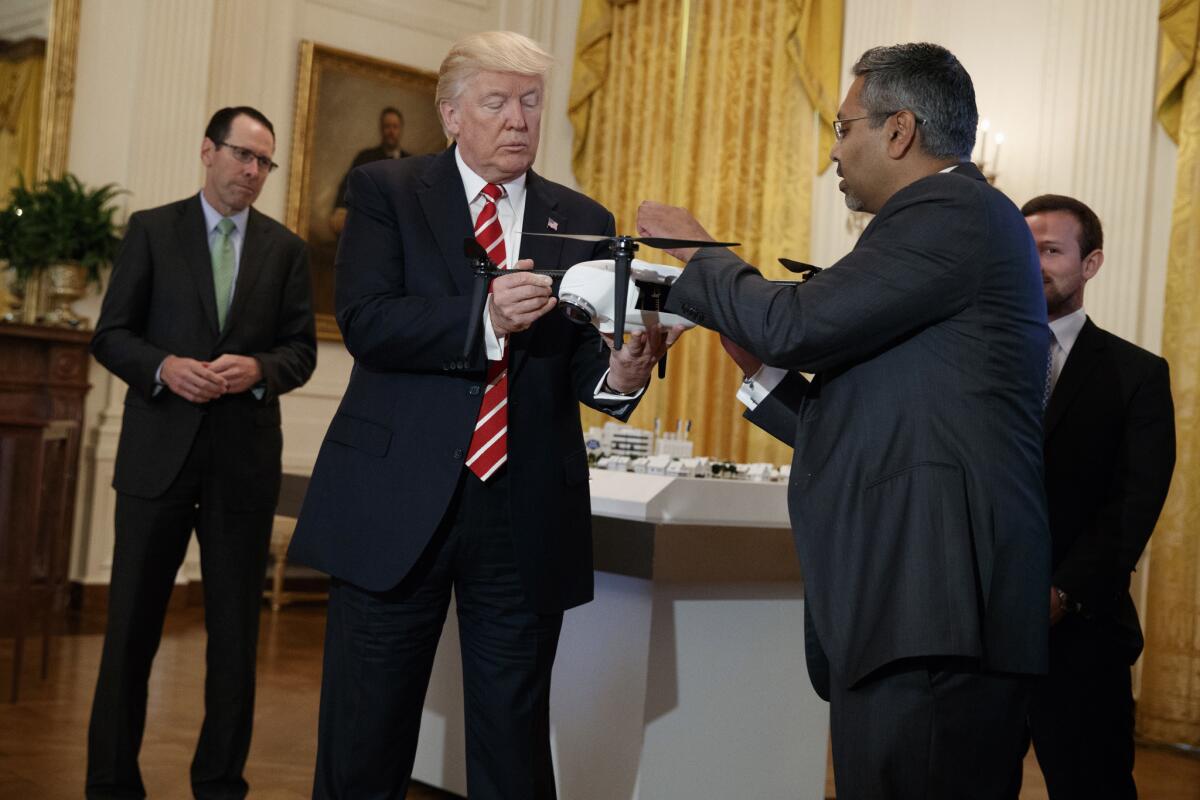
President Trump’s first public reaction to the Senate’s draft healthcare bill was to call it the starting point for more discussion.
“A little negotiation, but it’s going to be very good,” the president told reporters at an unrelated White House event in the East Room on Thursday, when asked if it had “enough heart.”
Trump said at a rally in Iowa Wednesday night that he wanted a “plan with heart.” To that end, he said he’d encouraged congressional Republicans to “add some money to it,” without specifying the purpose of such spending or the amount.
The president remained noncommittal about supporting the Senate’s newly unveiled draft, which is broadly similar to a House-passed measure that he has privately called “mean.” He said only that the issue was still “percolating.”
Both versions would result in millions of Americans losing insurance coverage.
“We’d love to have some Democrats’ support but they’re obstructionists,” Trump said. Democrats are united in opposing the repeal of the Affordable Care Act, which they considered one of their signature achievements of the Obama years.
White House officials have said the president’s legislative affairs team is “working hand-in-glove” with congressional Republicans, and that the president had been fully briefed about the evolving details this week.
Later Thursday, Trump is hosting lawmakers at the White House for the annual Congressional Picnic on the South Lawn.
- Share via
Supreme Court limits the government’s ability to strip citizenship from immigrants
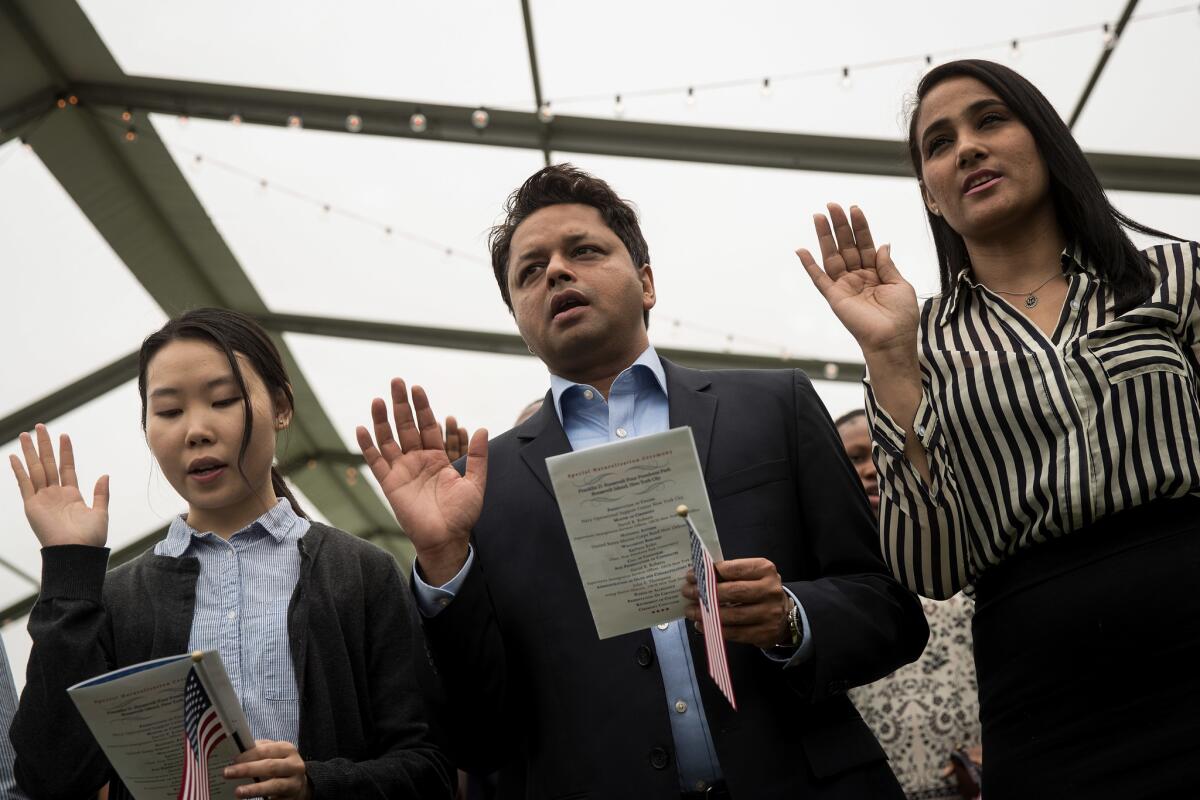
The Supreme Court on Thursday limited the government’s ability to strip U.S. citizenship from immigrants for lying during the naturalization process.
The justices ruled unanimously in favor of an ethnic Serb from Bosnia who lied about her husband’s military service.
Justice Elena Kagan wrote for the court that false statements can lead to the revocation of citizenship only if they “played some role in her naturalization.”
The court rejected the position taken by the Trump administration that even minor lies can lead to loss of citizenship.
The woman, Divna Maslenjak, and her family were granted refugee status in 1999 and settled near Akron, Ohio, in 2000. She became a citizen in 2007.
She initially told immigration officials her husband had not served in the Bosnian Serb military. That was a lie, she later conceded, and lower courts upheld a criminal conviction against her. The conviction automatically revoked her citizenship, and she and her husband were deported in October.
Maslenjak was convicted by a jury that was told that even an inconsequential lie was enough for a guilty verdict.
The high court returned the case to the 6th U.S. Circuit Court of Appeals in Cincinnati to determine whether Maslenjak’s false statements made a difference in the decision to grant her citizenship in the first place.
The case is Maslenjak vs. U.S., 16-309.
- Share via
Read the Senate’s draft bill to replace Obamacare
Senate Republicans on Thursday unveiled a sweeping plan to roll back the Affordable Care Act, including a drastic reduction in federal healthcare spending that threatens to leave millions more Americans uninsured.
- Share via
Press team beats Congress 2-1 in annual charity softball game
The women of the Washington press corps beat female members of Congress Wednesday in a charity softball game that raised over $300,000 for young women with breast cancer.
California members Rep. Norma Torres (D-Pomona) played catcher and Rep. Nanette Barragan (D-San Pedro) played outfield.
The annual game is considerably more low key than the annual Congressional Baseball Game, but both saw a surge on interest this year after a member of Congress and three others were shot during a baseball practice.
More than 2,500 fans came to watch the press win over Congress 2-1.
- Share via
Trump takes personal interest in Americans held overseas, not human rights more broadly
Intelligence officials have found it hard to keep President Trump’s attention when they are describing complex geopolitical conflicts during his daily briefings. Yet Trump has regularly zeroed in on the status of individual Americans imprisoned overseas.
Such was the case with Otto Warmbier.
“What are we doing for that kid in North Korea?” he repeatedly asked his briefers, according to a U.S. official familiar with the Oval Office meetings.
Multiple times Trump sought to talk with the parents of the captive university student, who was arrested as a tourist last year, but the Warmbiers declined. Two U.S. officials described internal discussions surrounding the Warmbier case on the condition of anonymity. When U.S. officials learned this month that Warmbier was in a coma, Trump personally approved a risky operation to send a diplomat and two doctors to Pyongyang to demand the 22-year-old man’s release. Warmbier died Monday in a hospital, days after being returned home.
The president’s intervention in such individual cases, when Americans are involved, stands in contrast to his resistance to promoting human rights more broadly. Trump has proposed slashing U.S. programs that promote democratic values in other countries and rarely raises human rights concerns in public or private; his secretary of State, Rex Tillerson, has said such advocacy “creates obstacles” to advancing other American interests in foreign countries.
- Share via
Trump says he hopes Senate healthcare bill has ‘heart’
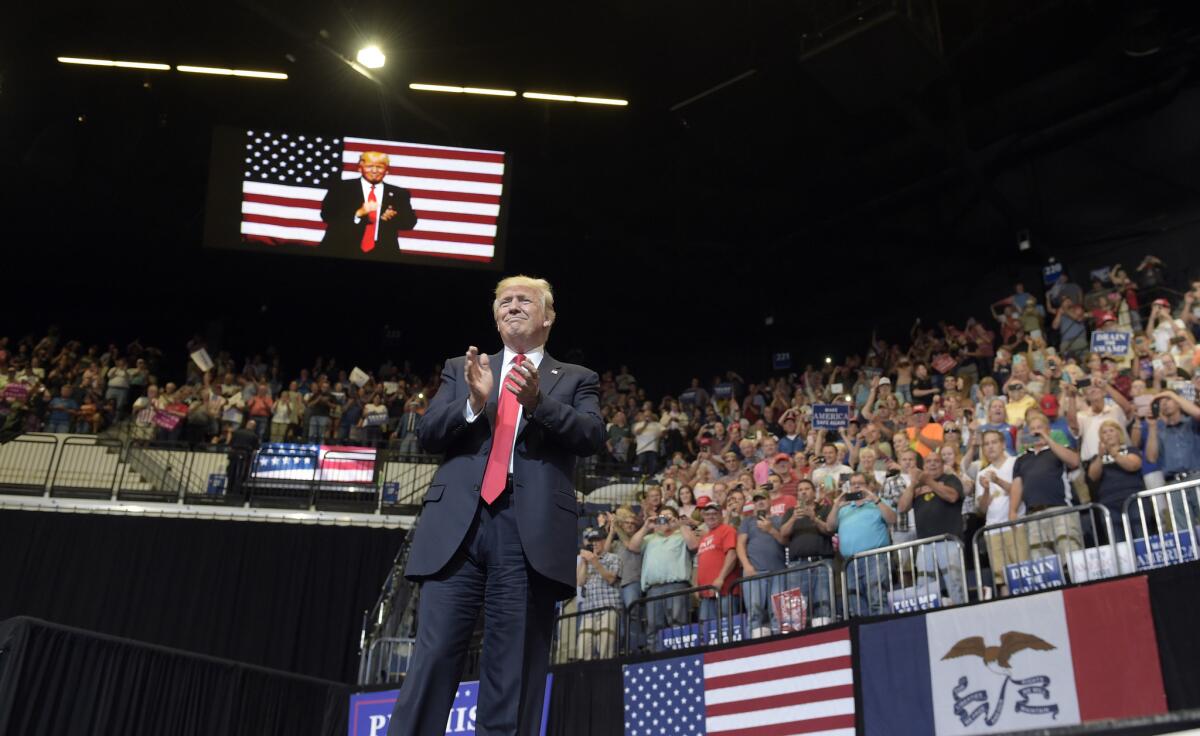
As Senate Republicans prepare to unveil their version of an Obamacare alternative, President Trump expressed his hope for a final plan “with heart.”
“I can’t guarantee anything, but I hope we’re going to surprise you with a really good plan,” Trump said at a campaign-style rally in Cedar Rapids, Iowa, on Wednesday night.
The White House said administration officials have been fully briefed on the details of a Senate healthcare bill that has been drafted with unprecedented secrecy, in advance of its planned release early Thursday. The Republican leader, Sen. Mitch McConnell, has been struggling behind closed doors to find a compromise that can get near-unanimous support from the Republican caucus, given that Democrats are united in opposition to the repeal of the Affordable Care Act.
“We basically can’t lose anybody,” Trump conceded.
The president’s talk of a bill with heart follows reports that he has privately called the House’s healthcare bill “mean” -- it would cause an estimated 23 million people to lose insurance coverage, according to the Congressional Budget Office -- despite the fact that he celebrated its passage in the Rose Garden with dozens of House Republicans.
At the Iowa rally, the president said he wanted more money for the health proposal, presumably to help cover more uninsured Americans. But as usual he did not offer any policy details.
Instead, he attacked Democrats as obstructionists.
“If we went and got the single greatest healthcare plan in the history of the world, we would not get one Democrat vote,” Trump said.
“It would be a beautiful, beautiful thing if we could get together as two parties that love our country and come up with that great healthcare, and come up with that great tax deal for our people,” he said.
Trump congratulated the two Republican victors in special elections Tuesday, mocking Democrats for falling short in attempts to capture GOP-held seats in the House. The White House said Republicans’ wins in Georgia and South Carolina showed that Trump’s agenda was resonating with the public. The winning Republicans’ margins, however, were significantly reduced from results in past elections.
“We are not going to let the same failed and tired voices in Washington keep us from delivering the change you voted for and the change that you deserve,” Trump said.
Trump clearly delighted in returning to a campaign-like setting, an arena packed with enthusiastic supporters applauding his attacks on Democrats and the media as well as his renewed calls for stricter immigration policies.
In addition to vowing to deliver on his stalled plan for a new wall on the U.S.-Mexico border — perhaps paid for in part through solar energy generation — the president said he would seek new legislation to place conditions on immigration to the United States.
“Those seeking admission to our country must be able to support themselves financially and should not use welfare for a period of at least five years,” he said, adding that immigrants would also have to “embrace our values.”
- Share via
Russia, angry over sanctions, cancels meeting with top U.S. official
Thomas Shannon, a career U.S. diplomat who is the third-ranking official at the State Department, thought he was headed this week to meetings in St. Petersburg, Russia.
He planned to discuss U.S. sanctions imposed against Russia over the last three years, including the order last December to close two Russian-owned compounds in New York and Maryland in response to Russia meddling in the 2016 election.
Some members of the Trump administration had suggested it was time to return the properties, which Moscow said were used for recreation by its diplomats.
But Moscow announced Wednesday that it was canceling Shannon’s meeting with Russia’s deputy foreign minister, Sergei Ryabkov.
The reason: language issued the day before by the Treasury Department that updated the sanctions against Russia, first imposed in 2014 when it annexed Crimea and backed rebellion in eastern Ukraine.
A State Department spokeswoman, Heather Nauert, said the U.S. regretted Moscow’s decision to “turn away from an opportunity to discuss bilateral obstacles that hinder U.S.-Russia relations.”
She described the new language on sanctions as a “maintenance package” that updates the measures, something the U.S. does twice a year.
“If the Russians seek an end to these sanctions, they know very well the U.S. position: Our sanctions... will remain in place until Russia fully honors its obligations” to withdraw from the Crimean peninsula, she said in a statement.
The meeting was canceled days after the Senate voted 98-2 to approve tougher Russian sanctions. The measure also requires Congress to review any effort by the Trump administration to loosen the current sanctions.
The measure next goes to the House. The White House has not said if President Trump would sign the bill into law.
The administration has signaled it wants to improve relations with Russian President Vladimir Putin’s government, although that now seems unlikely in the short term.
Many in Congress want to prevent the White House from easing sanctions, especially since the FBI and several Congressional committees are investigating Russia’s meddling in the election last year
The Shannon meeting was scheduled as part of a senior-level working group that Secretary of State Rex Tillerson and his Russian counterpart, Sergey Lavrov, agreed to establish in April to work on improving troubled U.S.-Russian relations.
- Share via
Senators to watch: These Republicans could make or break the effort to repeal Obamacare
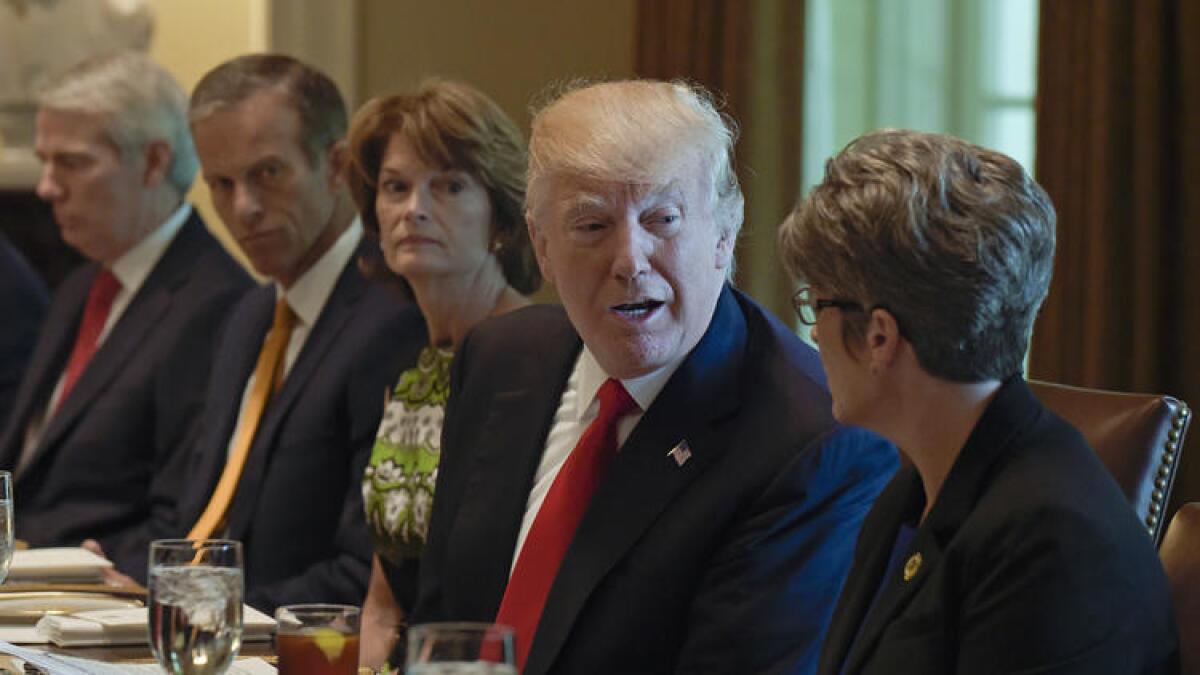
Senate Republicans have been working behind closed doors for weeks on their plan to repeal and replace Obamacare.
But not all GOP senators like the emerging legislation — which will be unveiled Thursday — and Senate leaders can’t afford to lose more than a couple when they vote, probably next week.
The most conservative senators want a quicker, more decisive end to the Affordable Care Act. Those from centrist states prefer a slower unraveling — preferring to keep Obamacare’s federal funding that allowed them to expand Medicaid to more residents.
With a slim majority and staunch Democratic opposition, GOP leaders can afford to lose just two Republican senators and still pass the bill. Even then, they would need Vice President Mike Pence for the tie-breaking vote.
Here are nine senators to watch:
- Share via
Trump’s lawyers make final plea to Supreme Court on travel ban, with eye toward Justice Kennedy

President Trump’s lawyers made a final appeal to the Supreme Court on Wednesday in the pending dispute over his travel ban and quoted Justice Anthony Kennedy — likely a key swing vote — on the need to defer to the chief executive on matters of national security.
The justices are set to meet Thursday morning in their last scheduled conference before the summer recess, and they face a potentially momentous decision on the president’s power to control national borders.
The justices will vote on what to do about Trump’s plan to temporarily “suspend” the entry of foreign travelers from six Muslim-majority nations.
Trump’s order has never taken effect. A judge in Maryland blocked it, and the 4th Circuit Court agreed on the grounds it reflected religious discrimination against Muslims. A judge in Hawaii also blocked it, and the 9th Circuit Court in California upheld his decision, ruling Trump had not shown the travel ban was needed to protect against terrorism.
The administration’s lawyers insist both rulings are fundamentally mistaken. And they have filed two separate requests with the high court.
First, they urged the justices to issue an order that would allow Trump’s plan to take effect immediately. If so, the limited ban would run for 90 days.
And second, they asked the justices to grant review in the fall of the two lower rulings so they can rule broadly on the president’s power to prevent certain foreigners from entering the country.
In Wednesday’s appeal, acting Solicitor Gen. Jeffrey Wall quoted Justice Kennedy’s words from an opinion issued two days ago. “National security policy is the prerogative of the Congress and the President,” Kennedy said. Courts should “accord deference to what the Executive Branch has determined is essential to the national security,” he said in Ziglar vs. Abbasi.
Kennedy was explaining the court’s reasons for throwing out a post-9/11 lawsuit against top Bush administration officials who had ordered a roundup of Muslim immigrants in the New York area.
Not surprisingly, Kennedy also figures to hold a decisive vote in the travel ban case.
It is not clear how the justices will proceed, let alone what they will decide.
One option would be to issue a short order with no explanation. They could refuse to put Trump’s order into immediate effect, but also agree to hear the administration’s appeal in the fall. If the justices are closely divided, they may opt for this mixed result.
If the court’s conservatives can muster five votes, they could put Trump’s order into effect immediately. But doing so would almost surely prompt a sharp dissent from the liberals.
It is also possible the justices may agree with some legal analysts who have argued that the need for a temporary travel ban has passed, because Trump’s team has now had ample time to devise new “vetting procedures” for the six nations. Even so, however, the court’s conservatives are not likely to let the two appellate court rulings stand unchallenged as the law.
- Share via
Trump and conservative media take a victory lap of sorts with special election wins
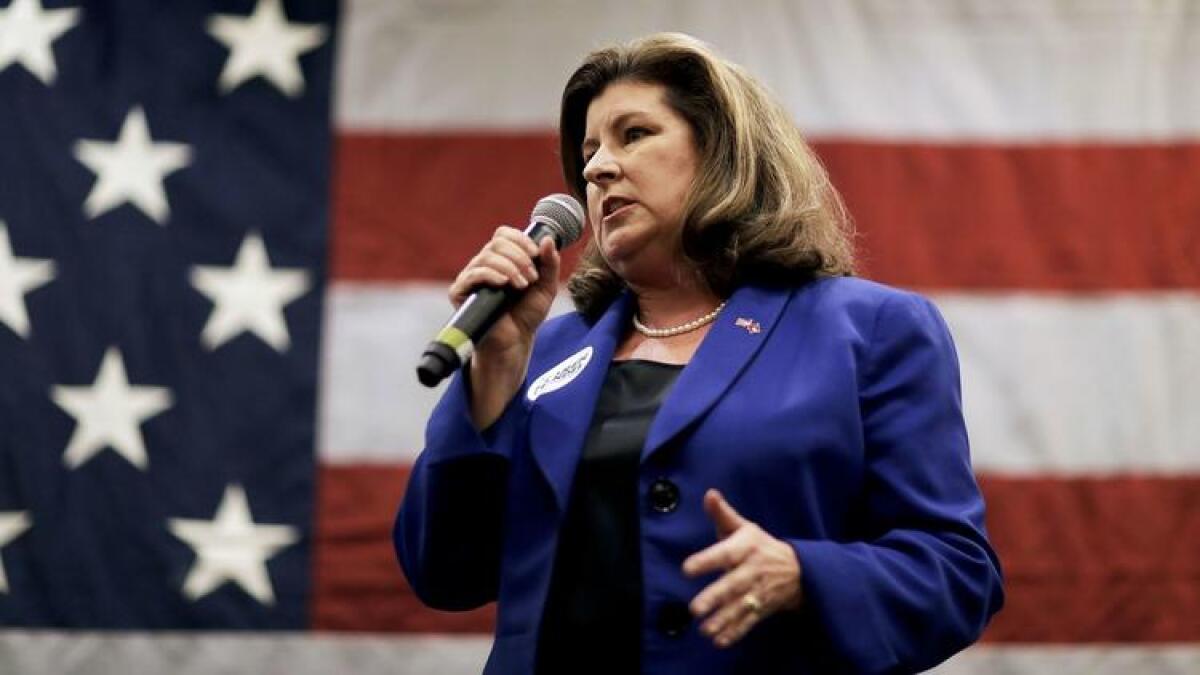
Republicans – especially President Trump – are rejoicing.
A day after the party won special elections in South Carolina and Georgia, Trump has a message for Democrats: Scoreboard.
(Fact check: Republicans won special elections for House seats in Georgia, South Carolina, Montana and Kansas this year. A fifth special election in California featured two Democratic candidates.)
For Trump, who made social media pleas of support for Ralph Norman and Karen Handel – both are Republicans who won in South Carolina and Georgia, respectively, on Tuesday – the special election season has seemingly been a success.
And as Trump boasts of the party’s victories, so too are some in conservative media.
Here are Wednesday’s headlines:
Resist fizzle: Democrats lose again, now 0-4 in special congressional elections this year (Townhall)
In the wake of last year’s presidential election, liberals have organized relentlessly, insisting the need to push back against Trump’s agenda.
So far, however, Democrats seems to be coming up short.
The article has five bulleted pieces of post-mortem analysis on the special election season.
No. 4 offers a moderate take of sorts:
“November 2018 is almost a year-and-a-half away, and none of these special elections will matter at all by then. That said, Democratic demoralization may have some important ramifications in terms of fundraising (although as we’ve learned yet again, try as they might, Democrats can’t necessarily just buy themselves electoral victories) as well as candidate recruitment,” writes the conservative website. “Republicans also saw that in red districts, ‘Trumpcare’ may not be the silver bullet that liberals seem to think it is based on some polling.”
Isolated from Washington establishment, Trump struggles for presidential victories (Washington Times)
As Republicans rake up special election victories, Trump has struggled to see wins with his agenda.
His travel ban has stalled in federal courts and his efforts to repeal the Affordable Care Act have hit several bumps as a bill slowly makes its way through Congress. All of this as the issue of Russian meddling in last year’s election and possible collusion between Trump aides and Russians continues to hover over the administration.
In this article, S.A. Miller, writes that Trump has grown increasingly isolated and has lacked support – and defense – from fellow Republicans:
“From his first day in the Oval Office, Mr. Trump received only tentative support from the Republican Party in Washington. He also came under unrelenting attacks from Democrats and the news media over suspicions of colluding with Moscow to rig the presidential election in his favor,” Miller writes. “The congressional probes and a Justice Department special counsel investigation that followed, as well as daily charges from Democrats that Mr. Trump and his campaign were involved in treasonous acts that rendered his presidency illegitimate, met scant pushback from Republican leaders in Congress.”
Robert Mueller, the swamp, and the lawyers tasked to run a silent coup (American Spectator)
Trump’s allies have said he’s the subject of a “witch hunt” when it comes to special counsel Robert Mueller’s investigation of Russian collusion in last year’s election.
And some have even called on the president to fire Mueller. (For now, the administration says that’s not going to happen.)
Jeffrey Lord, a prominent Trump supporter who regularly appears on CNN and talks of a “deep state” undermining the president, writes that Mueller’s investigation is fiction.
“It’s one thing to build political myths to soothe a losing candidate and her supporters. It’s quite another to successfully get a ‘special prosecutor’ to investigate a crime that never happened,” he writes of Democrats. “Let’s cut to the chase. This isn’t an investigation. It’s the Washington Swamp going on offense.”
- Share via
U.S. still hopes to salvage OAS resolution on Venezuela
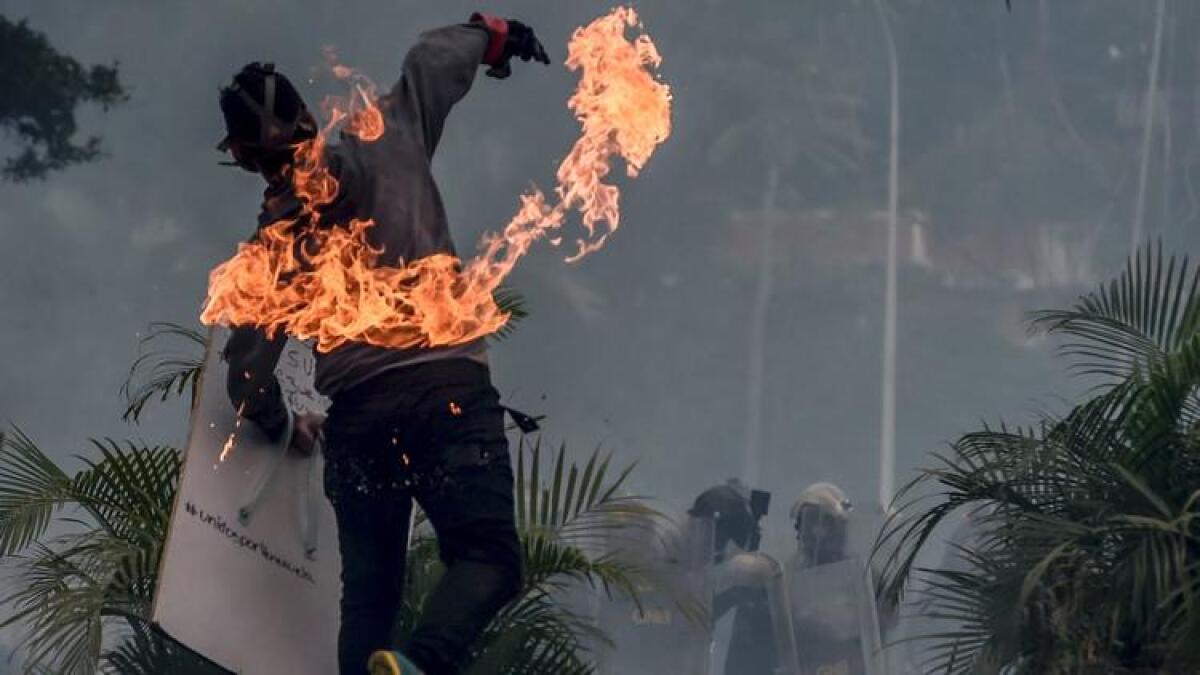
U.S. officials are holding out hope that the 34-nation Organization of American States, the hemisphere’s foremost regional organization, could still agree on a resolution on the crisis in Venezuela.
U.S. and Mexican diplomats were lobbying behind the scenes to secure more votes Wednesday as the OAS general assembly met in the Mexican resort city of Cancun.
A watered-down resolution that would create a “balanced” panel of member states to advise Venezuela failed to win the required two-thirds approval on Monday,
“This is an ongoing process,” U.S. Deputy Secretary of State John Sullivan told reporters after attending Tuesday’s session.
“We got 20 votes,” Sullivan said, describing it as the highest number yet to join on the issue. “We hope to get more.”
Some countries, especially those with leftist governments like Venezuela’s, are reluctant to criticize another OAS member state, which they see as outside intervention.
This is especially the case because many in Latin America regard the Washington-based OAS as an arm of the U.S. government.
Regardless of whether a resolution ultimately passes, Venezuela has said it will not recognize any OAS action. It has threatened to leave the regional body, which is a two-year process.
The U.S. and other governments have urged Venezuela’s government, led by President Nicolas Maduro, to release political prisoners, respect elections and forego a plan to rewrite the constitution, which Maduro could use to hold onto power.
More than 70 people have been killed in Caracas, Venezuela’s capital, and other parts of the country in large antigovernment demonstrations.
Venezuelan Foreign Minister Delcy Rodriguez labeled the protestors as a violent, small group influenced by the “lapdogs of imperialism.”
- Share via
Rep. Steve Scalise’s condition upgraded to fair one week after shooting
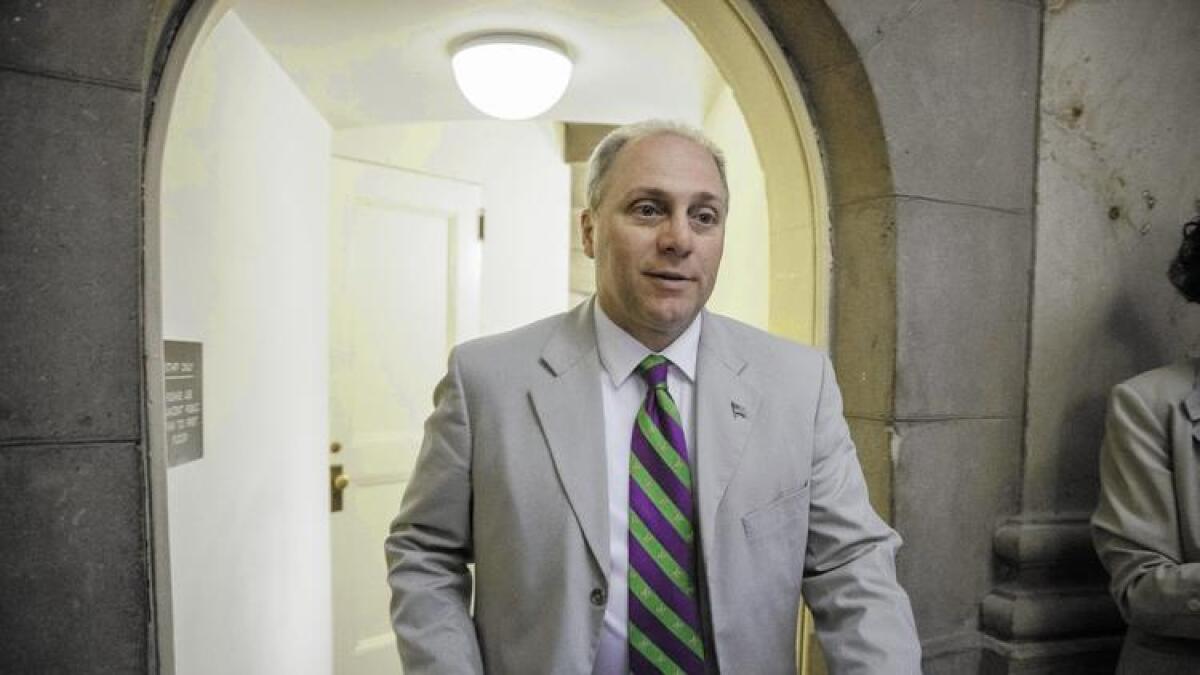
The Republican congressman shot last week at a baseball practice is making good progress and has been upgraded to fair condition.
MedStar Washington Hospital Center issued a statement on Wednesday saying Rep. Steve Scalise, 51, of Louisiana is “beginning an extended period of healing and rehabilitation.”
Scalise has undergone several surgeries since he was shot last week. Scalise and other congressional Republicans were practicing for their annual charity baseball game against Democrats when a gunman started shooting. U.S. Capitol Police and other officers returned fire and killed the gunman.
Scalise, the majority whip, was struck in the hip and the bullet shattered blood vessels, bones and internal organs. Doctors said he had arrived at the hospital June 14 at imminent risk of death.
- Share via
Russians targeted election systems in 21 states, but didn’t change any results, officials say
Hackers backed by the Russian government targeted voting systems in 21 states last year in an effort to undermine confidence in the principle of free and fair elections, U.S. security officials testified on Wednesday.
While the Russian interference in the 2016 campaign has been known for months, it was the first time U.S. officials have said how many states’ electoral systems were targeted.
Testifying before the Senate Intelligence Committee, the officials said none of the digital intrusions affected the parts of electoral systems that counted votes -- but that they expect Russia to keep trying.
“I hope the American people will keep in mind Russia’s overall aim is to restore its power and prestige by eroding democratic values,” said Bill Priestap, assistant director of the FBI’s counter-intelligence division.
Priestap said the hackers successfully copied data from some states “to understand what it consisted of” and to plan future attacks.
He declined to describe the data that was stolen, saying the Russian interference remains the focus of several FBI investigations.
U.S. officials first found hacking aimed at state systems last August, he said. By late September the efforts were detected in 21 states.
Priestap would not name the states or say which systems lost data, saying the FBI wants to preserve confidential relationships with state and local election officials.
The top Democrat on the committee criticized the FBI for withholding that information.
“I do not believe our country is made safer by holding this information back from the American public,” said Sen. Mark Warner of Virginia, the ranking Democrat.
One state official also criticized the federal government for not sharing enough information about the hacking.
So far, no secretaries of state have been cleared to receive classified details of the Russian operation. said Connie Lawson, secretary of state in Indiana and president-elect of the National Assn. of Secretaries of State.
Jeannette Manfra, a cyber-security official at the Department of Homeland Security, said the decentralized nature of U.S. elections means that an attempt to penetrate state systems and change results would be “virtually impossible” to accomplish without being detected.
The House Intelligence Committee also held a hearing Wednesday to examine the Russian interference in the 2016 election. Jeh Johnson, who was U.S. secretary of Homeland Security during the November election, testified.
The Justice Department has appointed a special counsel. former FBI Director Robert S. Mueller III, also is investigating whether any of President Trump’s current or former associates colluded with the Russian effort.
During the presidential campaign, Trump said he hoped Russia would be able to uncover missing emails from Hillary Clinton.
Sen. Martin Heinrich (D-N.M.) asked Priestap if he thought Trump had become an “unwitting agent” of Russian interests.
Priestap remained silent. “I don’t blame you for not answering that question,” Heinrich said.
- Share via
Trump has advice for Democrats after GOP’s special election victories
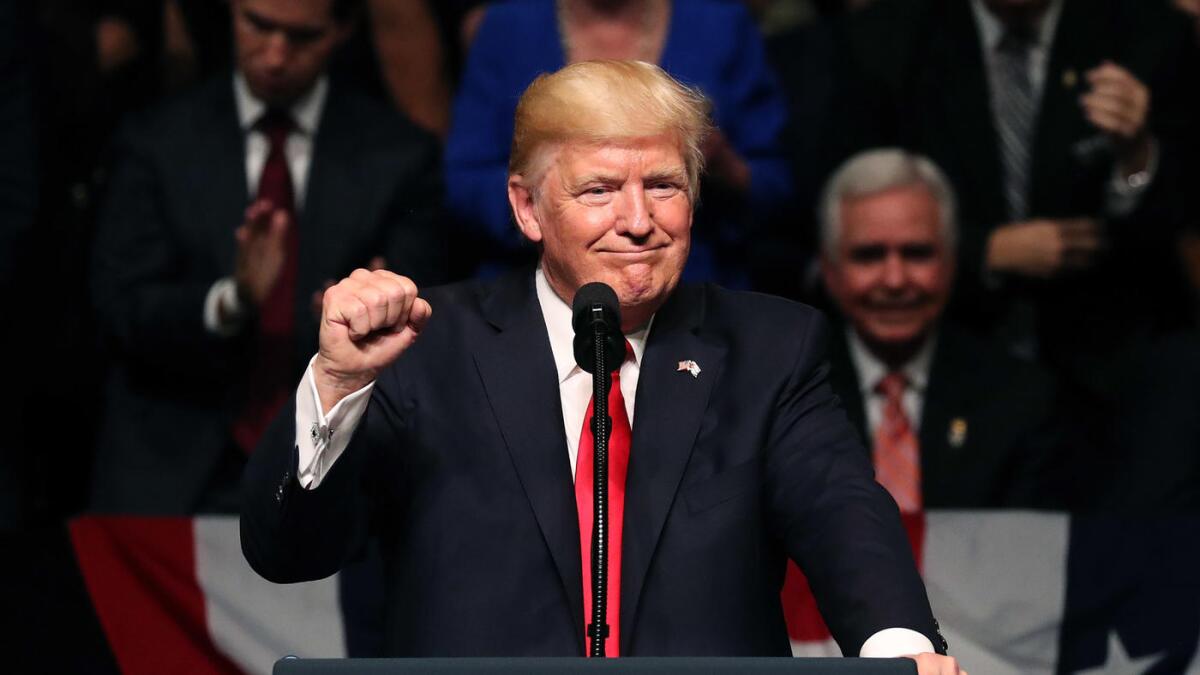
Tuesday night, President Trump celebrated two Republican victories in special House elections in conservative districts as a validation of his “Make America Great Again” agenda. On Wednesday, he was offering free advice to his Democratic rivals.
“Democrats would do much better as a party if they got together with Republicans on Healthcare, Tax Cuts, Security,” he wrote on Twitter. “Obstruction doesn’t work!”
Democrats were hardly likely to take his advice, given the widespread unpopularity of the Trump agenda. But the initial Wednesday morning quarterbacking among pundits and politicians -- especially about Republican Karen Handel’s victory in the most closely-watched of the two special elections, in suburban Atlanta, Georgia 6th congressional district -- was more about what Democrats did wrong than Republicans did right.
The race did not become a clear referendum on Trump’s first 150 days in office. Handel kept the president at arm’s length, not even mentioning him by name in her victory remarks, and Democrat Jon Ossoff focused more in the closing stretch on a grab bag of issues including healthcare and climate change. One of his closing ads focused on Handel’s role in cutting funding for Planned Parenthood during her time as an executive of the Susan G. Komen for the Cure charity for breast cancer.
Democrats on Wednesday played down the outcome in what have been heavily Republican districts. Yet they acknowledged their party needs to refine its message to attract voters uneasy with Trump and the Republican-controlled Congress, but lukewarm about the Democrats.
Sen. Christopher S. Murphy (D-Conn.), appearing on MSNBC’s “Morning Joe,” noted that in President Obama’s first year in office, Democrats were undefeated in congressional special elections — even some in Republican-leaning districts — only to lose control of the House the following year. If congressional Republicans go ahead with their plan to repeal Obamacare, “it may be the end of their special election run,” he predicted.
But Murphy also said that Democrats must do more to convince voters they have plans to boost the economy -- promoting “economic fairness” rather than broader growth is missing the mark. And Democrats can’t simply depend on voters defecting from the GOP over the array of legal and political woes involving Trump and his circle.
“The fact that we’ve spent so much time focusing on Russia has been a distraction from what should be the clear contrast between Democrats and the Trump agenda, which is on economics,” he said.
David Wasserman, who analyzes House races for the nonpartisan Cook Political Report, wrote Wednesday that the results Tuesday in Georgia and another special election in South Carolina “were far from a disaster for Democrats, and Republicans shouldn’t be tempted to believe their House majority is safe.”
He credited national Republicans with helping to neutralize Ossoff’s spending advantage but noted that fired-up Democrats have been winning larger-than-typical shares of the vote across the country, reflecting a potential enthusiasm gap among conservative voters “big enough to gravely imperil the Republican majority next November.”
The White House had avoided commenting specifically on the much-watched Georgia race this week, saying only that Trump naturally wanted to maintain his party’s majorities in the House and Senate.
But Trump is likely to keep touting the victories. He travels to Iowa on Wednesday afternoon for an event focused on agriculture technology before holding a rally with supporters.
- Share via
Republican Karen Handel wins Georgia special election in the costliest House race in history
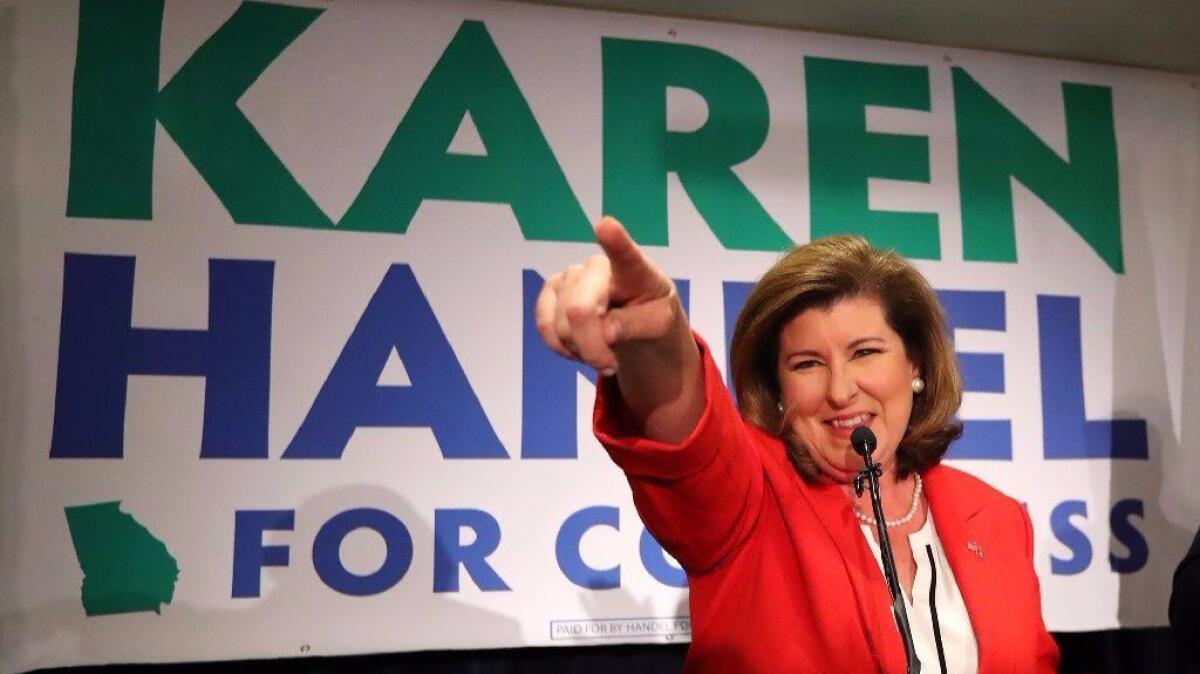
Democrats came up short Tuesday night in their costly bid to wrest control of a longtime GOP congressional seat in the suburbs north of Atlanta, losing a race the party had hoped would showcase deep Republican vulnerability in the Trump era.
Republican Karen Handel, the former secretary of state of Georgia, defeated Democrat Jon Ossoff, 52% to 48%. The contest had turned into the costliest House race in history, as Democratic activists nationwide sent a surge of donations to political newcomer Ossoff in an attempt to turn blue a district Republicans have controlled since the Carter administration.
The seat was last held by Tom Price, who vacated it to become President Trump’s Health and Human Services secretary. While the close election result is sobering for the Republican Party in a conservative district it customarily wins by double digits, the victory helps the party avert – for now – potentially much more damaging fallout for the White House and Republicans in Congress.
“It’s a huge disappointment for Democrats, who really did put all their eggs in this one basket, feeling as though it was the kind of district – upscale, higher education, higher income voters that went only narrowly for Trump – that if there’s any movement nationally, it should show up,” said Stuart Rothenberg, a veteran nonpartisan elections analyst.
- Share via
The mood is jittery in Georgia as Democrats await results in special congressional election

The mood was jubilant, if jittery, as hundreds of Democrats squeezed into a ballroom at a hotel on the outskirts of Atlanta for the Jon Ossoff election-night party.
Many wore blue “Ossoff for Congress” T-shirts and baseball caps. Some clutched homemade campaign signs saying, “Vote for Ossoff” and “We Know How to Fight.”
“The love we have for our candidate is really special,” Jill Vogin, a 55-year-old chief financial officer for a staffing company, said as she showed off her hand-knit, sleeveless sweater that spelled out, “Flip the 6th.”
“This is a man that will go beyond the House. We keep asking, how soon will he be president?”
Whatever the outcome of Tuesday’s election, the Ossoff volunteer said, her life has changed.
“But I’m cautious,” she added. “My heart broke in November.”
The vibe remained upbeat as early returns began to flash on two large television screens, showing Republican candidate Karen Handel taking a razor-thin lead. A trio of young women bopped and swirled their hands in the air as the DJ played an R&B hit, “24k Magic.”
As more returns came in, and Ossoff took a slight lead, a huddle of female volunteers pumped their fists and chanted “Flip the 6th” and “Pave it Blue.”
“It’s a victory no matter what happens,” Nancy Miller, a 59-year-old retired schoolteacher and Ossoff volunteer, said in between a sip of gin and tonic.
“This district has always been red, and I feel very good that we now have a real women’s grass-roots group. This will have an everlasting effect.”
- Share via
Meanwhile, a Democratic union worker known as ‘IronStache’ on Twitter makes a bid for Paul Ryan’s Wisconsin seat
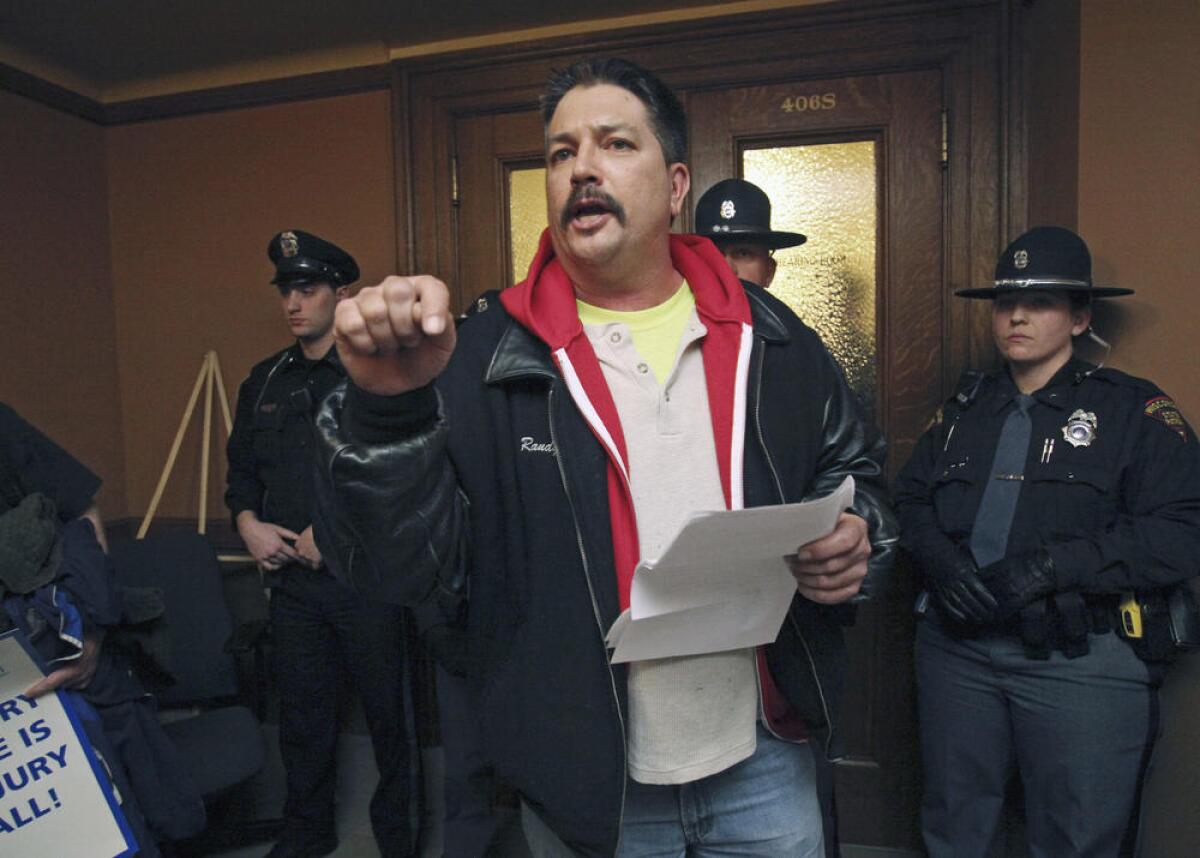
On a day when political attention was focused on a House race in suburban Atlanta, another bit of congressional election intrigue managed to turn heads in Washington.
A mustachioed ironworker, Randy Bryce, found a ready audience for an emotional bio-video introducing the Democrat as a blue-collar challenger to House Speaker Paul D. Ryan, a Wisconsin Republican, in 2018.
Some who viewed the politically powerful video, in which Bryce shares heart-tugging scenes with his ailing mother and young son, wondered whether the hard-hat-wearing candidate was for real. Could this be a parody?
But the long-shot contender is very real. He is known as @IronStache among his 48,000 Twitter followers, and describes himself as a lifelong Wisconsin resident and activist. Bryce has previously run for state office.
“I decided to run for office because not everyone has a seat at the table, and it’s time to make a bigger table,” he says in the video.
“Let’s trade places,” he goes on. “Paul Ryan, you can come work the iron and I’ll go to D.C.”
Ryan has represented his southeastern Wisconsin district for 20 years and easily beat back both a primary and general election challenger in 2016. He is favored for reelection in 2018.
- Share via
Senate Republicans promise to unveil Obamacare overhaul Thursday, with votes expected next week
After months of secret negotiations, Senate Republicans are set to unveil their Obamacare overhaul Thursday, in hopes of voting next week before a holiday recess, leaders announced Tuesday.
Senate Majority Leader Mitch McConnell dismissed complaints that Republicans were working behind closed doors as “laughable,” and insisted “everyone will have adequate time” to review what he called Thursday’s “discussion draft” before the vote.
Republicans could not estimate how many fewer Americans would have healthcare -- the House GOP’s bill left 23 million more uninsured -- but they promised a better system than the Affordable Care Act, also known as Obamacare.
“You’ll be able to take a look at it,” McConnell told reporters Tuesday.
“I wouldn’t want to compare it to the House bill,” McConnell said. “It’ll be different.”
The Republican leader can spare only two GOP votes from his slim 52-seat majority for passage, presuming Vice President Mike Pence would cast the tie-breaking vote. Pence and Health and Human Services Secretary Tom Price both attended the Republican senators’ lunch Tuesday in a show of support.
Many GOP senators, however, remain skeptical of the party’s approach. Conservatives complain the emerging bill does not go far enough to gut Obamacare, while centrist-state senators worry that it too quickly yanks residents off Medicaid.
McConnell did not indicate he had the majority votes yet for passage.
“We’re going to make every effort to pass a bill that dramatically changes the current healthcare law,” he told reporters.
The White House could not yet say if President Trump had seen the Senate bill. Trump reportedly dismissed the House-passed effort -- which he celebrated last month in a Rose Garden ceremony -- as “mean.”
“The president clearly wants a bill that has heart in it,” White House Press Secretary Sean Spicer told reporters.
The No. 3 Republican, Sen. John Thune (R-S.D.), told reporters that the Senate effort would probably postpone until 2023 its phase-out of Obamacare’s Medicaid expansion, which gave health coverage to 15 million more Americans.
Even if the Senate is able to muster the votes to approve a bill next week, the legislation would still need to be reconciled with the House-passed version -- pushing final passage to later in the summer.
- Share via
Ryan launches push to pass sweeping tax overhaul this year, but Republicans are running out of time
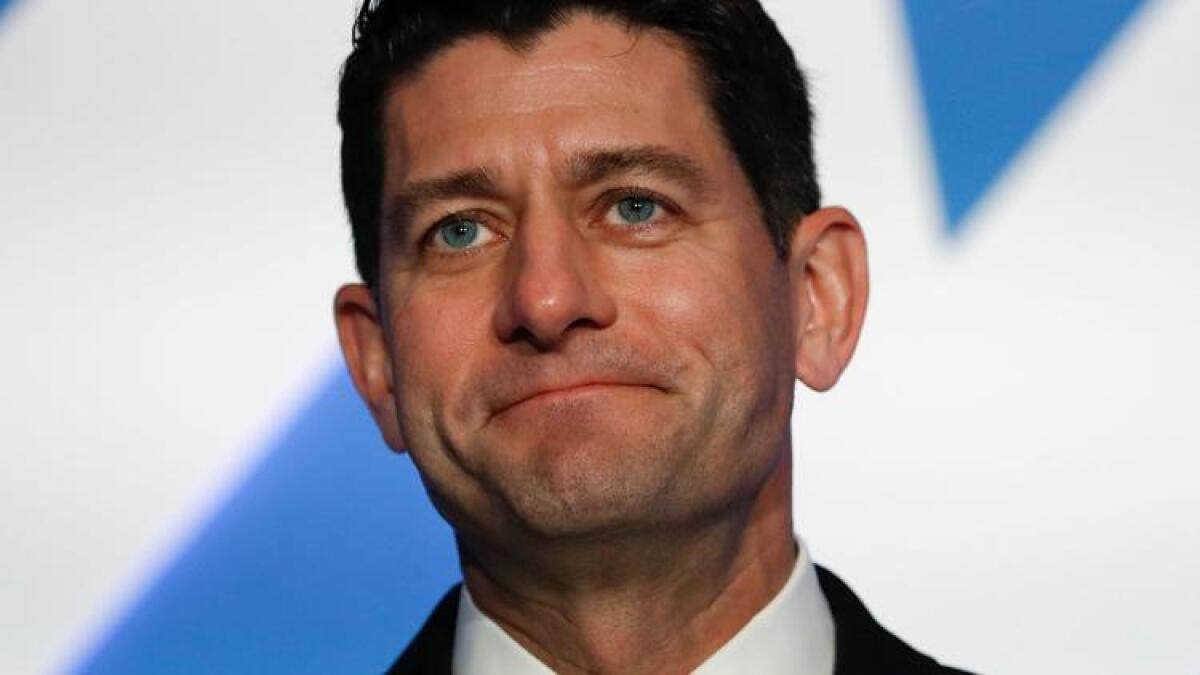
House Speaker Paul D. Ryan (R-Wis.) launched a major push Tuesday to overhaul the tax code this year — including massive cuts — but Republicans in Congress and the White House are running out of time as they continue to battle over the details.
With the legislative days remaining in the year dwindling, Ryan tried to jump-start the process with a major speech about what his staff described as the “crown jewel” of the Republican economic agenda.
“Once in a generation or so, there is an opportunity to do something absolutely transformational, something that will have a truly lasting impact long after you and I are gone,” he told the National Assn. of Manufacturers. “That moment is here and we are going to meet it. Ladies and gentleman, we are going to fix this nation’s tax code once and for all.”
“We are going to get this done in 2017,” he said. “We cannot let this once-in-a-generation moment slip by.”
- Share via
Georgia voters hew to partisan lines, but say House election isn’t about Trump

Maureen Evans, a 52-year-old IT database administrator, speaks outside a polling station about her vote for Republican Karen Handel in Georgia’s closely-watched sixth district race.
Karyn Dolan was still mulling her decision in Georgia’s razor-tight House district race as she exited her local polling station Tuesday morning in scrubs after her night shift at a nearby hospital.
“It’s not an easy decision,” the 60-year-old registered nurse sighed after voting for Democrat Jon Ossoff at Life Center Ministries in the northern suburbs of Atlanta. “I’m still debating in my head.”
Dolan voted for Trump in the 2016 Presidential election. While she said she had not seen any concrete positives come out of Trump’s leadership, she was also not particularly enthused by Ossoff, a 30-year-old documentary filmmaker and former Congressional staff member. She worried that he did not live in the district and might be out of touch with residents.
“To be honest, I wanted to abstain,” she shrugged of the closely-contested Congressional runoff election between Ossoff and Republican Karen Handel. “My family is very torn… I think I let my liberal daughter sway me.”
Democrats have pitched the race in this traditionally staunchly conservative, affluent district of Atlanta’s suburbs as an early referendum on Trump’s presidency and a possible harbinger of the party’s fate in the 2018 midterms. A Democrat has not won a House seat since the Carter administration, yet recent polls have shown Ossoff and Handel almost deadlocked, less than two percentage points apart.
I’m not sending a message to Trump. I hate Trump, but I’m interested in what happens where I live.
— Molly Schlader, a 49-year-old stay-at-home mom
As residents of this leafy, affluent suburb of Atlanta turned out on a gray, drizzly morning to vote, many skewed to straightforward, partisan lines.
A steady stream of Republican voters who exited the polling station said they voted for Handel, a former Georgia secretary of state who bills herself as a “common sense conservative.”
“I have no idea who this Ossoff guy is,” said Maureen Evans, 52, an IT database administrator and Republican who voted for Trump. “He ran a slick campaign, but I think he’s wet behind the ears and I just don’t think I trust him. He’s getting a lot of money from out of state.”
Scanning the parking lot outside the parking lot, Evans said she was encouraged to see so many older voters. “I haven’t seen anyone under 30,” she beamed. “I’m hoping that gray-haired Republicans pull it off.”
Democratic voters, in turn, said they hoped to finally flip the district.
“If we win, it will send a wakeup call to Trump that he cannot do whatever he wants,” said Matthew Goodman, a 22-year-old chemistry graduate. “I would feel my voice is heard.”
However, many voters rejected the idea that the Sixth district campaign was an early referendum on Trump.
“I’m not sending a message to Trump,” said Molly Schlader, a 49-year-old stay-at-home mom who voted for Handel. She supported Gary Johnson in the 2016 Presidential election. “I hate Trump, but I’m interested in what happens where I live. I picked the lesser of two evils. Handel actually lives here and isn’t bankrolled by people in California.”
- Share via
Trump calls Warmbier’s treatment a ‘total disgrace,’ suggesting Obama is to blame
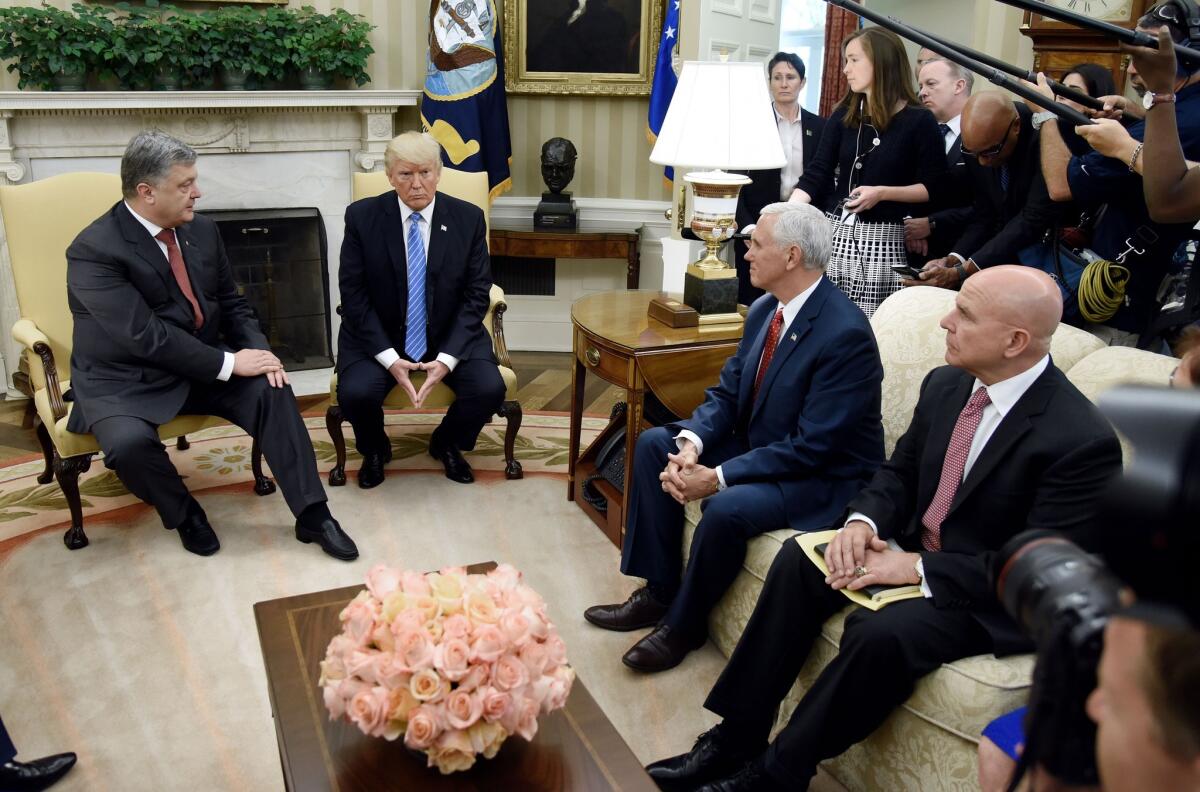
President Trump on Tuesday implicitly blamed his predecessor, former President Obama, for the death of American college student Otto Warmbier, calling it “a total disgrace” that the young man did not get to return home from captivity in North Korea until last week.
“Frankly, if he were brought home sooner, I think the results would have been a lot different,” Trump told reporters in the Oval Office as he met with Ukraine President Petro Poroshenko. “He should have been brought home a long time ago.”
Warmbier died Monday at an Ohio hospital five days after he was evacuated in a coma from North Korea, where he had been held for 17 months. Doctors said he had extensive loss of brain tissue — a result, his family said in a statement, of the “awful torturous mistreatment” he received while imprisoned.
Trump did not name Obama, but his comments suggesting the Obama administration should have been able to secure Warmbier’s return sooner echoed comments from Warmbier’s father, Fred, at a news conference last week.
Warmbier said his family was advised by the Obama administration “to take a low profile” as they worked to bring him home from North Korea. After Trump took office, Warmbier said, he and his wife “decided the time for ‘strategic patience’ was over” — using a term that had been used to describe the U.S. policy toward the rogue, nuclear-armed government in Pyongyang.
Warmbier said it was his understanding that, at Trump’s direction, State Department officials “aggressively pursued” a resolution.
A spokesman for Obama said that during his administration, “we had no higher priority than securing the release of Americans detained overseas.”
“North Korea’s isolation posed unique challenges, but we worked through every avenue available to us — including through the Swedish, our protecting power, as well as through our representatives in New York — to secure the release of Mr. Warmbier,” said Ned Price, a former National Security Council spokesman.
“These tireless efforts resulted in the release of at least 10 Americans from North Korean custody during the course of the Obama administration. It’s painful that Mr. Warmbier was not among them, but our efforts on his behalf never ceased, even in the waning days of the administration,” Price added.
David Axelrod, a longtime Obama advisor, tweeted that Trump’s “not-so-veiled attack ... truly IS sad!”
Trump also told reporters: “It’s a total disgrace what happened to Otto. It should never, ever be allowed to happen.” But he did not suggest what response, if any, the United States would take. Other Americans remain hostage in North Korea.
UPDATE: In a Twitter message, Trump said the U.S. “again condemns the brutality of the North Korean regime as we mourn its latest victim.” But the tweet links to an Instagram video of his Oval Office remarks seeming to criticize the Obama administration for Warmbier’s ultimate fate.
- Share via
Why California is so interested in today’s nail-biter House race in Georgia
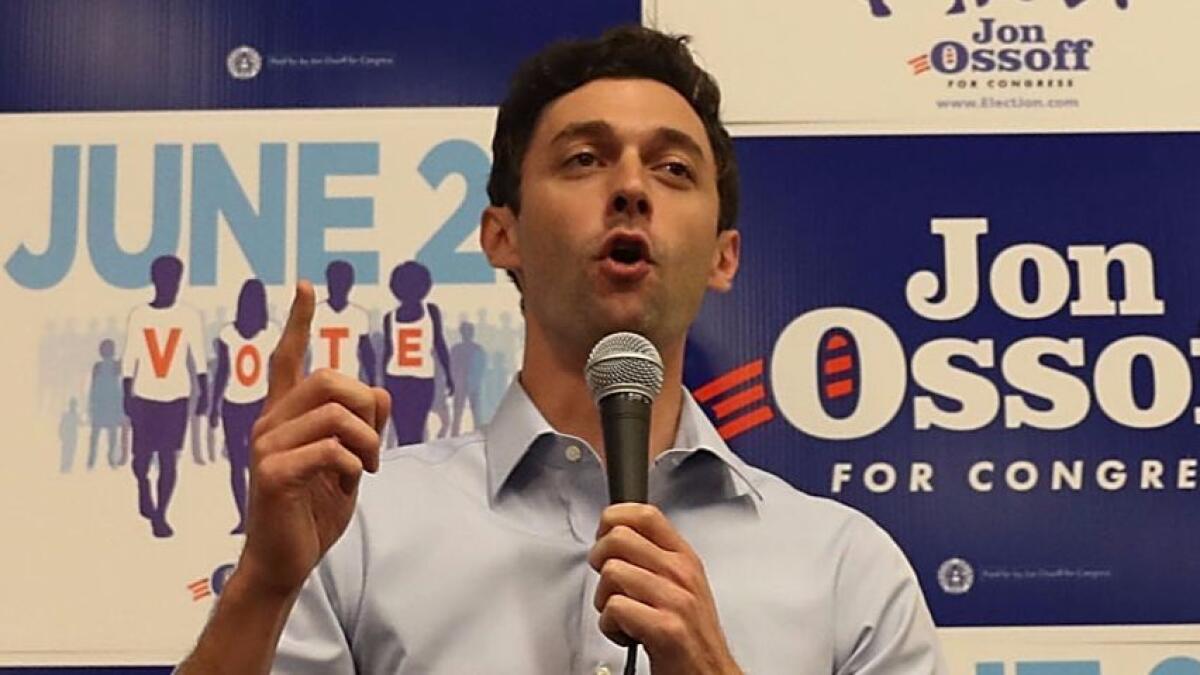
Voting Tuesday in the bitterly fought Georgia election to fill a House seat vacated by Tom Price, President Trump’s secretary of Health and Human Services, is taking place more than 2,000 miles from California.
Yet Californians are deeply invested in the race, which has become a referendum on the Trump administration and could chart the path for Democrats nationwide to rebuild their power base in one-time GOP strongholds such as Orange County.
More donors to the campaigns of Democrat Jon Ossoff and Republican Karen Handel are from California than any other state, including Georgia. San Francisco has played front and center in campaign attacks. Liberal Hollywood celebs have lent their star power.
And the outcome of the House race — the most expensive in history — may foreshadow even bigger battlegrounds in California.
- Share via
A Republican data firm probably exposed your personal information — and you can’t do much about it
To any nefarious hackers looking for information that could be used to sway elections or steal Americans’ identities, the file compiled by a GOP data firm called Deep Root Analytics offered all manner of possibilities.
There in one place was detailed personal information about almost every voter in the U.S.. It was a collection of some 9.5 billion data points that helped the firm assess not only how those Americans would probably vote, but their projected political preferences. In some cases, the data collectors had scoured people’s histories on Reddit, the social media platform, to match vote history with social media use, and well-informed predictions were made about where each voter would stand on issues as personal as abortion and stem cell research.
It’s the kind of sensitive information that, if a bank or a big-box retailer or almost any other corporation had failed to protect it, would have triggered major trouble with regulators. But there it sat on the Internet, without so much as a password to guard it, for 12 days.
- Share via
In gerrymander case, Supreme Court takes on long history of brazen political self-dealing
Gerrymandering, the practice of drawing self-serving political boundaries, is as old as the country itself. Its impetus, one could argue, is even older and deeper-seated, grounded in the fundamentals of human nature.
In the zero-sum game of campaigns and elections, where you either win or lose, gerrymandering is a way to stack the deck and improve the odds by sorting people into districts based on how they are expected to vote — in what, up to now, has been perfectly legal fashion.
By agreeing to hear a landmark case challenging the drawing of strongly partisan boundaries in Wisconsin, the U.S. Supreme Court indicated Monday that it will consider whether, finally, enough is enough.
If the court, which takes up the case in the fall, rules that partisan gerrymandering is unconstitutional — a very big if, experts say — it could drastically change the country’s politics by injecting much greater competition into races for Congress and for statehouses nationwide.
- Share via
Secretary of Veterans Affairs David Shulkin plans integration for VA, private health sector services
Secretary of Veterans Affairs David Shulkin said Tuesday he plans to evaluate ways the VA can integrate services with private health sectors based on geographic region.
Shulkin, who served as the VA’s undersecretary during the Obama administration, said he does not support privatization of the department but wants to “build an integrated system” that minimizes overlap of services. The VA department should focus efforts and funds on areas of healthcare that the private health sector does not offer, he said, and these needs will look different for each geographic region.
“Every one of our regions will make an assessment of what they need to buy or build,” Shulkin said. “In some cases, we need to buy more community care. In others, to invest.”
Overall, Shulkin said he wants to focus efforts on building “world class services” that don’t already exist in the private sector and improving care that only other veterans can provide, such as treatment for post-traumatic stress disorder or other behavioral health services.
Areas where the private sector already offers services, such as maternity care, would be places for partnership rather than competition.
The issue of “finding a mix,” he said, is not political.
Although Shulkin said he supports President Trump’s budget, he is working with Congress to reallocate funds within the budget. Currently, the money is in “silos” based on decisions made months ago, he said. More flexibility and a “singular pot” of funds is part of the updated Choice program, which Shulkin is expected to announce in the fall.
Shulkin also said he is relying on the private health sector to recruit new employees as a solution to vacancy and retention issues.
The House on June 13 passed the Accountability and Whistleblower Protection Act to give the secretary more power to discipline and remove employees found of misconduct, which Shulkin anticipates will also help fill vacancies. Trump is expected to sign the accountability bill into law this week.
Currently, there are 15,000 pending cases of employee misconduct. Of these, 300 involve the theft of drugs. These pending cases will not be affected by the accountability bill since the misconduct occurred before the bill had passed.
Although the bill passed with bipartisan support, critics of the act say it could disturb protections for civil servants and could lead to changes in other departments. Others worry it will leave VA employees more vulnerable. Shulkin said he doesn’t see the bill as a “tool for mass firings.” Instead, he is “seeking change.”
- Share via
U.S. forces shoot down Iranian drone over Syria as fighting escalates
A U.S. fighter jet Tuesday shot down an armed Iranian drone supporting Syrian government forces in southern Syria, marking the third American air-to-air shoot-down this month.
The armed Shahed-129 drone was destroyed by a U.S. F-15 fighter jet around 12:30 a.m. local time. The drone was approaching a small military base at the Syrian town of Tanf that U.S., British and Norwegian special operations forces use as a staging ground to train and equip rebel groups fighting the Syrian government and Islamic State militants.
The coalition forces “were manning an established combat outpost to the northeast” of the base when the drone flew in, a Pentagon statement said.
The F-15 intercepted the drone and shot it down after the unmanned aircraft failed to divert its course, the statement added.
The incident follows Sunday’s downing of a Syrian SU-22, a Russian-made attack jet. The U.S. said it acted after the Syrian plane bombed fighters from the Syrian Democratic Forces, an alliance of Kurds and Syrian Arab groups that the U.S. has supported.
On June 8, a U.S. fighter jet shot down another Iranian-made drone that dropped a bomb near forces patrolling the base at Tanf. U.S. warplanes launched three other airstrikes against the forces there.
Despite the recent violence, U.S. officials stressed they have no plans to escalate fighting against the government of Syrian President Bashar Assad.
“The coalition presence in Syria addresses the imminent threat ISIS in Syria poses globally,” the U.S. military said in a statement, referring to the Islamic State group, which controls a swath of territory in eastern Syria.
“The coalition does not seek to fight Syrian regime, Russian, or pro-regime forces partnered with them, but will not hesitate to defend coalition or partner forces from any threat.”
- Share via
Democrats seeking documents related to Michael Flynn’s undisclosed foreign travel
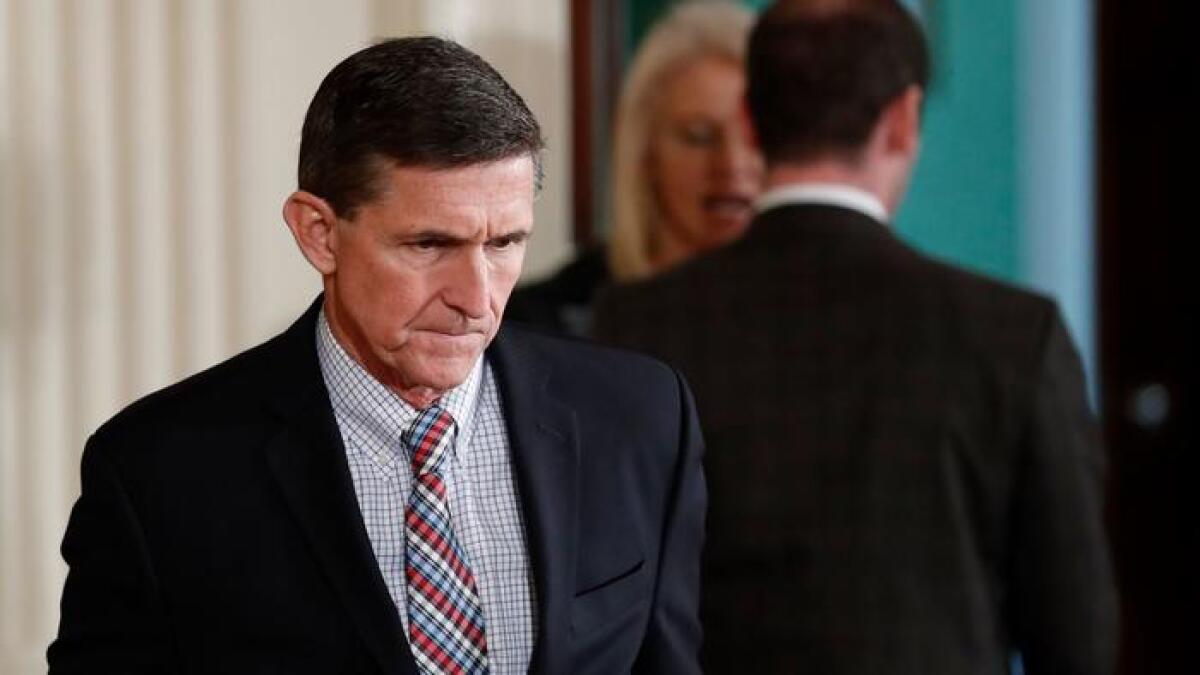
Top Democrats are broadening their scrutiny of President Trump’s former national security advisor, Michael Flynn, to inquire about a trip to the Middle East he failed to disclose as required for renewal of his top-level security clearance.
In a letter to Flynn’s attorney Monday requesting documents, the senior Democrats on two House committees drew a link between a visit Flynn apparently made to the Middle East in the summer of 2015, on behalf of a pair of U.S.-based clients, and a subsequent deal between Saudi Arabia and Russia to build 16 nuclear power plants.
Newsweek reported this month that Flynn, as an advisor at the time to defense consulting firms X-Co Dynamics and the Iron Bridge Group, promoted a potential bid by U.S. and Russian firms to advance nuclear energy in the Arab world, financed by Saudi Arabia and other gulf nations.
Flynn did not report the trip in the application he submitted in January 2016 to renew his five-year security clearance. Yet he testified to Congress the previous June about what he called an “extensive trip” to the region in which nuclear development was discussed.
Flynn did disclose what appears to have been a separate six-day trip to Saudi Arabia in October 2015, according to the Democrats’ letter. But he did not specify the nature of his business there or identify the conference he says he attended. Also, the Democrats noted, the hotel that Flynn reported staying in did not appear to exist.
The questions about Flynn’s consulting work in the Middle East add to earlier ones. In March, Flynn filed paperwork with the Justice Department retroactively disclosing lobbying work for the Turkish government. The White House said it was unaware of that work, though Flynn at the same time had an active role with Trump’s campaign.
The Democrats on the House Oversight and Foreign Affairs committees, in their letter, said the extent of Flynn’s unreported foreign contacts and financial interests was “unclear” from 2014, when he was forced out as head of the Defense Intelligence Agency, until 2017 when Trump made him the national security advisor.
The Democrats, Reps. Elijah E. Cummings of Maryland and Eliot L. Engel of New York, questioned whether those business interests with Saudi Arabia and Russia may have influenced Flynn during his brief time in the White House position – including in a recently finalized series of commercial and military deals announced during Trump’s visit to Saudi Arabia last month.
The letter from the Democrats otherwise does not raise the president’s trip or attempt to link the visit to Flynn’s conduct. But House Minority Leader Nancy Pelosi (D-San Francisco) recently questioned why the president chose to make Riyadh the first stop he made outside the United States as president.
“I am looking into it,” she said in a recent interview on MSNBC’s “Morning Joe.” “I just think it was a very strange choice to go there.”
- Share via
Supreme Court rules rock band the Slants may trademark its name, striking down law banning offensive terms
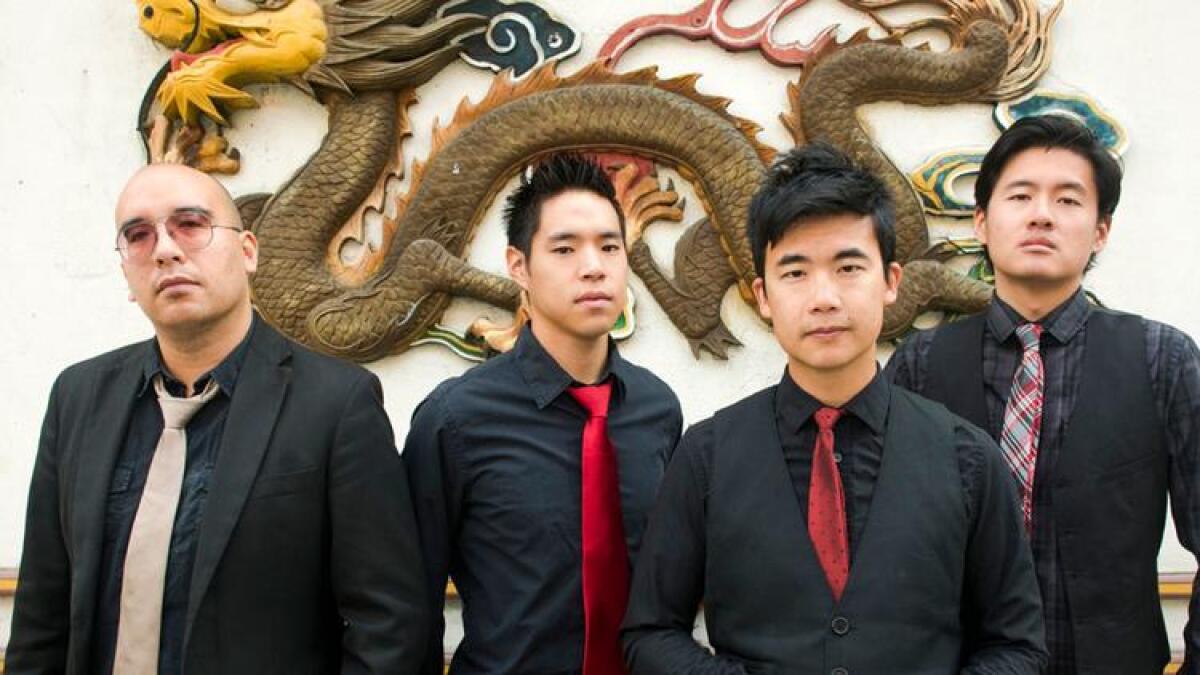
The Supreme Court extended trademark protection on Monday to words and names that may be offensive, ruling that the 1st Amendment right to free speech allows an Asian American band to call itself the Slants.
The unanimous decision will also likely preserve the trademarked and controversial name of the Redskins, Washington’s professional football team.
In recent years, such trademarked names have come under attack as racially offensive. Since 1946, the U.S. trademark law has included a provision that barred the government from registering trademarks that may disparage people or groups.
The case of the Slants raised questions about government’s efforts to police names that may be offensive to one group or another.
Simon Tam, the leader of the Portland, Ore.-based band, said he chose the name to make fun of a word that had been used as a slur against Asians, and thereby to “drain” it of any derogatory impact, as the court put it.
- Share via
Partisan gerrymandering is almost as old as America, but will the Supreme Court decide it has gone too far?
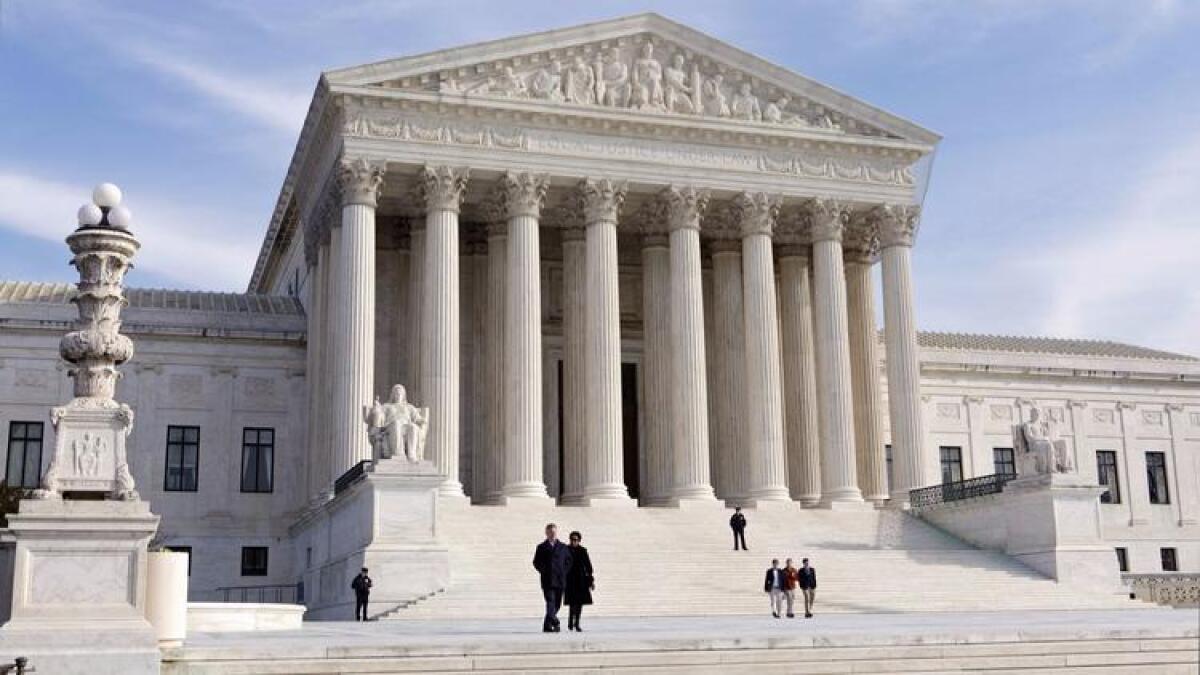
The Supreme Court agreed Monday to decide whether partisan gerrymandering – in which voting districts are drawn to favor one party – is a time-honored American political tradition or has evolved into an unconstitutional rigging of elections.
The Wisconsin case of Gill vs. Whitford, to be heard in the fall, could yield one of the most important rulings on political power in decades.
Gerrymandering has been derided for generations, often mocked in cartoons depicting bizarre-shaped districts that look like salamanders or spiders.
But in recent decades, thanks to software programs, gerrymandered maps looks less obvious and are more effective in giving one party an insurmountable advantage. The maps can all but ensure that the party in power at the beginning of the decade — when districts are drawn — will maintain control of the state legislature and win most of the state’s seats in the U.S. House of Representatives.
- Share via
Democrats gum up Senate business to protest GOP healthcare bill secrecy
Ready for a long night in the Senate?
Senators settled in Monday as Democrats plan to slow-walk all action until Republicans relent on their secret healthcare negotiations and debate their Obamacare replacement in public.
Democrats plan to object to even the most routine procedural requests and use the floor time instead to berate Republicans for drafting the healthcare bill behind closed doors.
The tactic will not necessarily stall the Senate. The week’s schedule is not especially busy. But it will highlight the secrecy around the healthcare debate as Republicans rush to finish the bill before their Fourth of July recess.
Senate Majority Leader Mitch McConnell opened the Senate with no mention of when the GOP would unveil their bill or bring it to a vote. But many expect the strategic GOP leader will push it swiftly to the floor, nudging reluctant Republicans to vote.
But Senate Minority Leader Charles E. Schumer (D-N.Y.) chided Republicans for hiding the legislation that will likely result in millions of Americans losing their healthcare coverage.
“They’re ashamed of it, plain and simple,” Schumer said.
“No wonder they don’t want to show anyone the bill.”
Democrats say that they spent many hours in open-session public committee hearings in 2009 drafting the legislation that would become the Affordable Care Act, also known as Obamacare. Lawmakers at the time were pressured by constituents to “Read the bill!” before they voted.
The Senate’s GOP plan to overhaul the Affordable Care Act is expected to phase out Obamacare’s expansion of Medicaid and reduce federal subsidies for buying insurance on the private market.
Weeks in the making during private lunch time meetings, the Senate bill is likely to reflect the House GOP’s effort and loosen Obamacare’s provisions to protect coverage for pre-existing conditions.
Analysts said 23 million more Americans would be without healthcare under the House bill.
- Share via
Senate Democrats plan to talk -- and talk -- to criticize GOP healthcare plans
Senate Democrats are complaining they haven’t been briefed on GOP plans to repeal the Affordable Care Act and replace it with the American Health Care Act.
The House passed the overhaul measure earlier this year but the Senate has not yet taken the bill to the floor or through the legislative process.
For the next several hours, Democrats plan to object to all of the Senate’s unanimous consent requests — in other words, stall business so they can talk about healthcare.
“Democrats have still not seen the bill,” Senate Minority Leader Chuck Schumer (D-N.Y.) said from the floor. Schumer said the plan is being written behind closed doors because Republicans “are ashamed of it, plain and simple.”
Senators will offer speech after speech into the evening, the Democratic leader said.
“If Republicans are not going to allow debate on their bill on the floor or in committee,” Democrats will, Schumer said.
- Share via
After 150 days, Jared Kushner speaks
Jared Kushner has an expansive portfolio in the White House, he’s a subject of a special counsel’s probe of Russia’s ties to the Trump campaign and, as President Trump’s son-in-law besides, he’s often seen at the president’s side.
But until Monday, he had never been heard by much of the public.
So Kushner’s otherwise unremarkable voice proved to be among the more interesting things at the kick-off event of what the White House is calling “Tech Week.” On the administration’s 150th day, the 36-year-old adviser spoke before reporters and television cameras to discuss one of the initiatives he’s leading: a review of how private-sector solutions could be adapted to modernize government’s technological infrastructure.
His Office of American Innovation was leading a day-long forum at the White House that brought together administration officials and the CEOs of Amazon, Oracle, Apple, Intel and Microsoft, among many others.
“We are here to improve the day-to-day lives of the average citizen. That’s a core promise and we are keeping it,” he said.
“Together we will unleash the creativity of the private sector to provide citizen services in a way that has never happened before,” Kushner added, in words suggestive of Trump’s own for their ambition and hyperbole. “We will foster a new set of start-ups focused on gov-tech and be a global leader in the field making government more transparent and responsive to citizens’ needs.”
Kushner said that federal agencies maintain 6,100 data centers that could be consolidated. Some are more than a half-century old, he said, and some Pentagon systems still use floppy disks.
An effort underway to modernize electronic health records at the Veterans Administration was the first of many “very big” announcements to come, he said.
All told, Kushner spoke for just under seven minutes. Later this week he heads overseas to attend to another of his responsibilities -- making peace in the Middle East.
- Share via
Trump and the Goldwater Rule: When is it OK to voice a professional opinion about the mental health of the president?
Since Donald Trump became president, commentary about his public statements, tweeting habits, predilections and even his personality have become something of a national pastime.
Some in the professional psychiatric community have been moved to join in, offering their own expert analysis on why the president says what he says and does what he does.
But should they? Not according to the American Psychiatric Assn., which years ago adopted a rule for its 37,000 licensed members against offering a public opinion about the mental health or general psychological makeup of a public figure.
It’s known as the Goldwater Rule, and in the era of President Trump, it’s suddenly the subject of vigorous discussion — most recently at an association meeting last month in San Diego.
So what exactly is the Goldwater Rule?
- Share via
Consumer bureau director defends handling of Wells Fargo scandal in face of GOP criticism
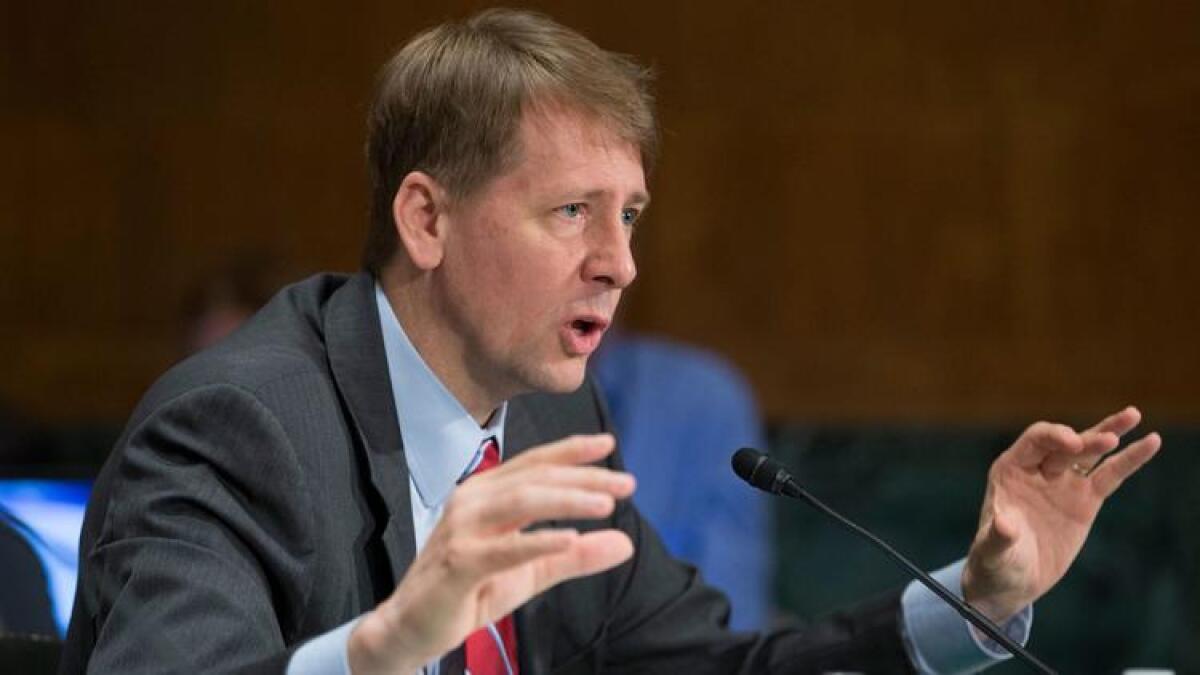
The federal government’s consumer financial watchdog is defending his handling of the Wells Fargo & Co. unauthorized accounts scandal in the face of Republican allegations that the agency failed to catch the problem and has stymied a congressional investigation into how it handled the case.
Richard Cordray, director of the Consumer Financial Protection Bureau, said he is “quite proud” of the team that looked into Wells Fargo’s sales abuses.
“Clearly our team, along with our partners, has performed a tremendous public service here,” Cordray wrote last week to Rep. Jeb Hensarling (R-Texas), chairman of the House Financial Services Committee.
The letter is the latest salvo in an acrimonious battle between Cordray, a Democrat who heads the powerful agency created in the aftermath of the 2008 financial crisis, and Hensarling, who has called for President Trump to fire Cordray and is pushing legislation gutting the bureau’s power.
- Share via
Milwaukee County sheriff is not joining the Department of Homeland Security after all
The Department of Homeland Security says Milwaukee County Sheriff David Clarke is no longer a candidate for a position in the agency.
The conservative firebrand said last month he was taking a job as an assistant secretary at the DHS, but the agency declined to confirm the appointment, saying it announces such senior appointments once the DHS secretary makes them official.
Craig Peterson, a political advisor to Clarke, said in a statement that the sheriff notified DHS Secretary John Kelly late Friday that he “had rescinded his acceptance of the agency’s offer” to join the department. The Washington Post first reported on Clarke’s decision.
The tough-talking Clarke, who is known for his provocative social media presence, is an outspoken supporter of President Trump. According to Peterson’s statement, Clarke said he “is 100% committed” to Trump’s success and that he “believes his skills could be better utilized to promote the president’s agenda in a more aggressive role.”
Clarke is “reviewing options inside and outside of government,” the statement said.
A DHS spokesman said by email Sunday that Clarke is no longer being considered for a position within DHS.
Clarke has drawn a considerable amount of controversy as Milwaukee County sheriff.
He was hit by allegations last month that he plagiarized content in his master’s thesis on homeland security, which he denied.
Seven workers at the county jail he oversees are at the center of a criminal investigation into the dehydration death last year of an inmate who prosecutors say was deprived of water as punishment. Clarke isn’t among the seven staffers — prosecutors said he wasn’t directly involved in the events that led to the death of 38-year-old Terrill Thomas — but the death happened under Clarke’s leadership, which his critics say is enough cause for his firing.
- Share via
Here’s a snapshot look at Trump’s new guidelines on Cuba
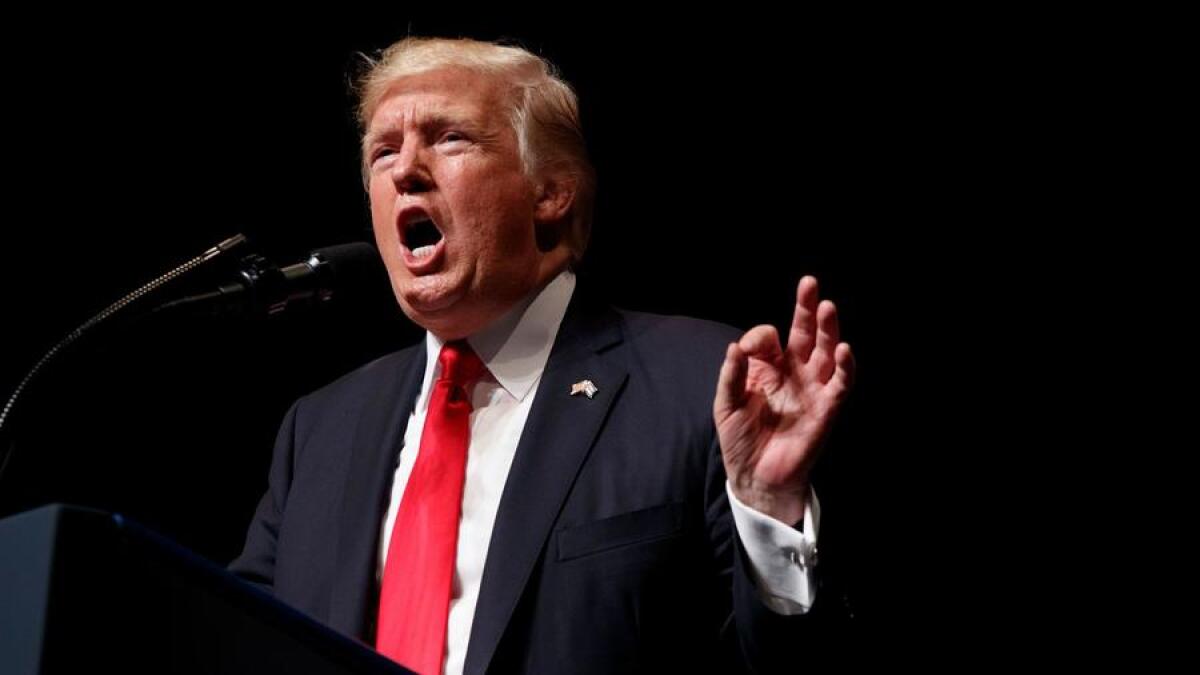
It’s a policy change President Trump insists will correct what he called a “terrible and misguided deal” by his predecessor.
Trump’s recent announcement on new travel and trade restrictions with Cuba aim to fulfill a campaign promise.
“Easing of restrictions on travel and trade does not help the Cuban people,” he said at an event in Miami on Friday. “They only enrich the Cuban regime.”
But while Trump’s policy backtracks on some of President Obama’s efforts to engage with the island, key directives will remain in place.
Here’s a look at Trump’s policy toward Cuba.
- Share via
Trump’s lawyer says the president is not under investigation, despite what he tweeted
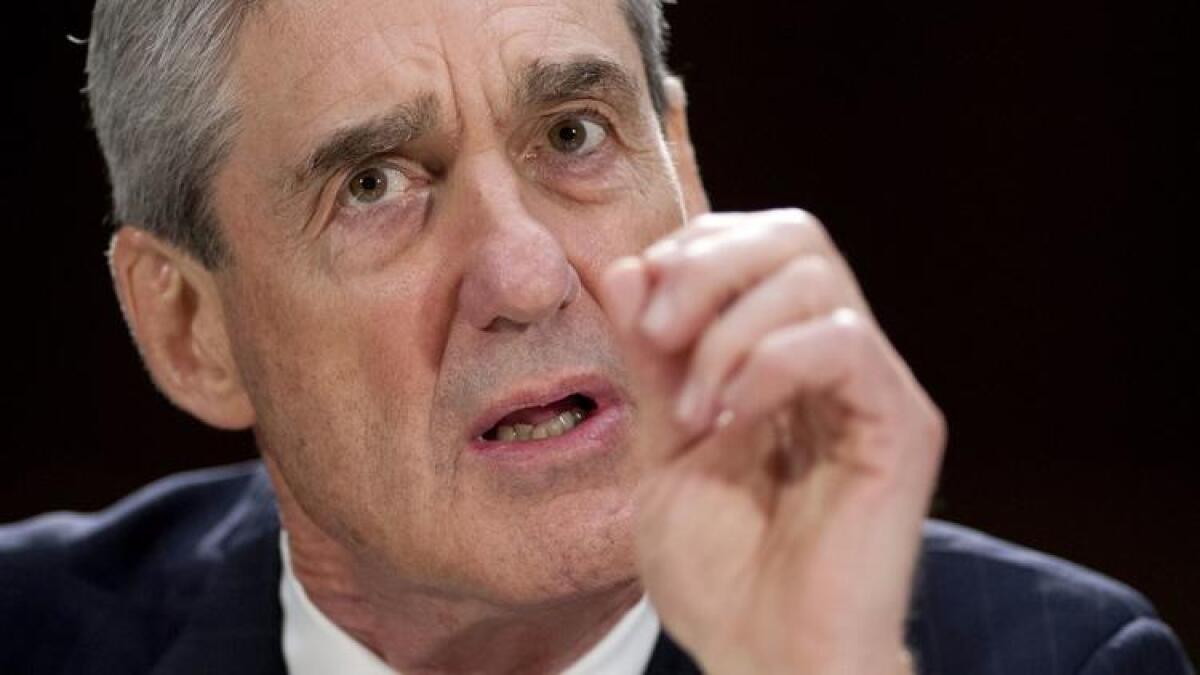
One of President Trump’s lawyers insisted on Sunday that a tweet in which he wrote of “being investigated” did not confirm that he was, in fact, under investigation, as senators of both parties suggested the probe will run for many more months whether Trump is unhappy about it or not.
Trump’s intemperate tweets have by now become commonplace, but few have been as revealing as last week’s volley of statements expressing outrage in the government’s probe of Russia’s alleged meddling in the 2016 presidential election.
Casting aspersions on the Justice Department and its inquiry, Trump on Friday seemed to confirm that he was under investigation for possible obstruction of justice by the special counsel looking into Russia’s actions.
“I am being investigated for firing the FBI Director by the man who told me to fire the FBI Director! Witch Hunt!” Trump tweeted.
On Sunday, however, Jay Sekulow, one of Trump’s lawyers, insisted that the president’s statement did not amount to an acknowledgment that he was under investigation.
Trump’s tweet was “in response” to a Washington Post story last Wednesday indicating that the special counsel’s probe now included the president, Sekulow said in television interviews. Trump was merely restating what the Post and other media had reported, Sekulow suggested.
“Let me be very clear here, as it has been since the beginning, the president is not and has not been under investigation for obstruction,” Sekulow said on NBC’s “Meet the Press.”
Sekulow did not provide much evidence for that statement, which he repeated as he made the rounds on Sunday talk shows.
He told CBS’ “Face the Nation” that there has been no notice from the office of the special counsel, Robert S. Mueller III, that Trump is under investigation.
The FBI and federal prosecutors, however, do not routinely notify people that they are under investigation. Notification is often provided if a person has become a “target,” meaning that charges could be imminent, but is not generally provided at the early stages of an investigation.
Sekulow also cited the recent congressional testimony of former FBI Director James B. Comey, who said he told Trump on several occasions that he was not being personally investigated. Those conversations, however, took place before Trump fired Comey -- one of the acts that could be interpreted as part of an effort to obstruct the case -- and before the Justice Department appointed Mueller.
Later, however, in an interview on “Fox News Sunday,” Sekulow conceded that he could not be sure of his statement. “I cannot read the mind of the special prosecutor,” he said.
Trump’s tweets have exasperated some of his aides and many of his supporters, even as they seek to defend him against what they see as a partisan investigation.
“Trump has a compulsion to counterattack. And he is very pugnacious,” former House Speaker Newt Gingrich said Sunday on ABC’s “This Week.”
“I don’t think it serves him well. I don’t think that tweet helped him,” Gingrich said of the remark suggesting that Trump was being investigated.
“But it’s almost like it’s who he has been his whole life,” Gingrich added. “I mean, he’s been a fighter his whole life. He is infuriated, and legitimately, in my judgment, by this whole Russian baloney.”
Other prominent Republicans expressed more support for the probe and defended the integrity of Mueller.
“The president’s pretty fired up about this,” said Sen. Marco Rubio, (R- Fla.), who said he discussed the probe with Trump on Friday.
“He, from every pronouncement we have seen, feels very strongly that he did nothing wrong, and he wants people to say that, because he feels very strongly about it. I don’t think that’s a mystery. And he’s expressing himself in that way,” Rubio said on “Meet the Press.”
“That said,” Rubio added, Trump’s displeasure “in no way is going to impede any of this work from continuing. It’s going to happen.”
“This is going to move forward. We’re going to get the full truth out there,” he said.
Asked if he believed that Russian agents had tried to influence the election, Rubio said he did.
“Not only do I believe it, I know it. Almost everybody else does” other than Trump, he said. “Ultimately, whether he believes it or not, the work’s going to move forward,” he added.
“The FBI doesn’t sit around all day and read tweets. The FBI’s going to do their job; Mueller’s going to do his job,” Rubio said. “And the best thing that can happen for everybody, the president, the country, our institutions [of] the government, is for a full and thorough and credible investigation that reveals everything.”
That process still has a long way to run, said Sen. Angus King of Maine, an independent who caucuses with the Democrats. King and Rubio are both members of the Senate Intelligence Committee, which is running an investigation that partially parallels the Justice Department probe being run by Mueller.
“I can say categorically that the collusion, the cooperation, aspect of the investigation is not over. And as far as that goes, I’d say we’re 20% into it,” King said.
“A lot of people have said, ‘When do you think you’ll be done?’ Maybe the end of the year. This is a very complex matter, involving thousands of pages of intelligence documents, lots of witnesses. There’s a lot of information yet to go.”
Sekulow suggested that Trump had taken to Twitter because the president wanted to fight back against news organizations that Trump and his supporters have repeatedly accused of using leaks and anonymous sources to undermine the president.
“So his legal team and the president responds,” Sekulow said on NBC.
Yet Trump’s tweets in recent days condemning the actions of his own Justice Department have reached an intense level, revealing the president’s increasing agitation about the probe and the attention it has drawn.
On Sunday, Trump again called the investigation a “witch hunt.” Last week he described the concerns about Russian influence in U.S. elections as a “phony” story.
- Share via
Gunman went to Republican baseball practice with a list of names
The man who shot House Majority Whip Steve Scalise and others at a congressional baseball practice this week in Virginia had with him a piece of paper with doodles and the names of three lawmakers, according to a person familiar with the case.
The person told the Associated Press on Saturday that investigators weren’t sure of the significance of the names and didn’t know whether it was a list of people he was targeting. This person was not authorized to speak publicly about the case and spoke on condition of anonymity.
The person did not disclose the names, but said those listed had been briefed.
Scalise’s trauma surgeon said Friday that the Louisiana Republican can hope to make an “excellent recovery” even though he arrived at the hospital Wednesday at risk of imminent death.
- Share via
Woman arrested after storming stage during controversial N.Y. ‘Julius Caesar’ production

A New York production of Shakespeare’s “Julius Caesar,” with a President Trump-like character who is assassinated, had a boisterous new scene this weekend: an activist who stormed the stage, yelling, “Do you want Trump to be assassinated?”
Police said Laura Loomer was arrested Friday evening during the play presented in Central Park by the city’s Public Theater. She was arrested, charged with criminal trespass and disorderly conduct and released. She is required to appear in court to respond to the charges at an unspecified later date.
“I’m out of jail, but I’m not apologetic,” the 24-year-old conservative activist wrote on Twitter. “Thanks to everyone who is supporting me & condemning political violence.”
As she rushed to the stage, Loomer reportedly shouted, “Stop leftist violence!”
- Share via
Cuba’s leaders say U.S. is returning to ‘the coercive methods of the past’

Cuba’s leaders on Friday criticized President Trump’s “hostile rhetoric” and tightening of restrictions on Cuba as a harmful setback to what had been warming relations between the United States and the Communist-ruled island nation.
In a letter signed by Cuba’s revolutionary government and published in Granma, the ruling party’s official mouthpiece, Cuban leaders called Trump’s announcement that he would be tightening economic and travel restrictions on Cuba a return to “the coercive methods of the past.”
The statement said that Trump’s actions “contradict the majority support of American public opinion.” It suggested Trump was influenced not by overall opinion polls but by the views of a minority of Cuban Americans who opposed former President Obama’s moves to improve relations with and roll back sanctions against Cuba.
Despite their obvious anger at Trump’s attacks, the Cuban leaders did not threaten retaliatory measures. They said they would be willing to continue negotiating with the U.S., so long as it was via “respectful dialogue.”
- Share via
In Florida, impact of Trump’s Cuba policy called ‘muted’ by some. Others not so sure
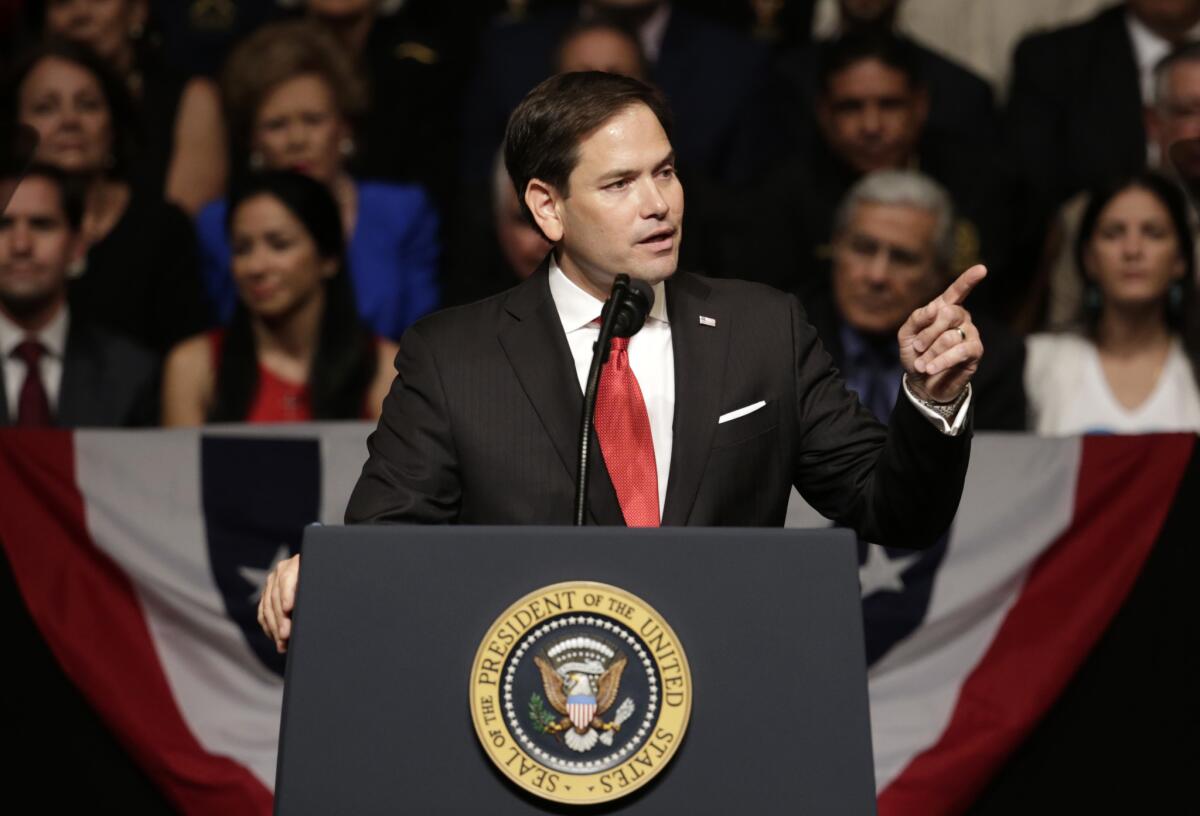
For nearly six decades opinions about Cuba have been divided, so it’s no surprise reaction varied widely Friday after President Trump announced that he was “completely cancelling” the “terrible and misguided deal” by President Obama that opened relations with Cuba.
Speaking in Little Havana, the epicenter of anti-Castro movements in Miami, Trump said rules on American travel to Cuba will be tightened, but airlines and cruise ships will continue to visit the Caribbean island. The new rules also prohibit Americans from spending money on businesses controlled by the military.
Sebastian Arcos, associate director of the Cuban Research Institute at Florida International University, said Trump’s speech wasn’t a “big deal” because, fundamentally, not much is changing.
“The changes he announced today are not a cancellation of Obama’s policy,” Arcos said from Boca Raton. “Many components of the original [Obama] policy stay the same. [Trump] used the word ‘cancellation,’ but he’s leaving many aspects of the policy untouched.”
Others, however, called Trump’s decision disastrous, a marked shift in the dynamic over the last two years, said Albert Fox, president of the Tampa-based Alliance for Responsible Cuba Policy Foundation, which advocates for engagement with the Cuban government.
“It’s a very big deal. People don’t understand how big it is,” Fox said from Tampa. “Trump’s speech was the worst form of political pandering I’ve seen in 50 years.”
“Those of us that are in favor of engagement with the Cuban government don’t understand [Trump’s] policy – nobody does, even his own people,” Fox continued. “More human rights abuses and violations happened today in Cairo than have happened in years in Cuba.”
President Trump had said in his speech on Friday that “executions” were still a problem in Cuba.
“There hasn’t been an execution in Cuba in 10 years,” Fox countered.
Florida Republican lawmakers who urged Trump to scale back Obama’s Cuban overtures voiced support for the president.
“Economic practices that benefit the Cuban military at the expense of the Cuban people will soon be coming to an end #BetterDealforCuba,” Sen. Marco Rubio said on Twitter.
Rep. Mario Diaz-Balart, who represents parts of Miami, told Fox News, “Our partners are not the Cuban regime. Our partners have to be the Cuban people.”
He described Trump’s move as a “win-win” victory for Cuba and the U.S. He also noted that Trump will not lift sanctions or the 56-year-old embargo in place until free and fair elections are held in Cuba. “Is that too much to ask for?”
- Share via
Trump’s financial disclosure form: It’s complicated
The White House on Friday released President Trump’s personal financial disclosure, offering the most extensive look to date at his personal finances and the complex portfolio of real estate and other holdings that made him a billionaire.
The 98-page filing with the Office of Government Ethics lists 565 separate roles that Trump holds in his vast business empire, largely LLCs and corporations established to manage his hotels, apartments and golf courses.
It itemizes hundreds of sources of income and other assets, some only in broad ranges that make identifying an exact annual income or overall net worth difficult.
The disclosure also shows debts of at least $315 million in mortgages.
In a statement, White House Press Secretary Sean Spicer said Trump “welcomed the opportunity to voluntarily file” the disclosure form, noting one was not due until his second year in office.
Trump signed off on the release of the document on Wednesday -- his 71st birthday.
The president reported more than $37 million in income from his Mar-a-Lago resort in Palm Beach, Fla., where he traveled regularly during his first months in office and hosted the president of China and prime minister of Japan.
His new Washington hotel accounted for nearly $20 million in income. The property is at the heart of a new lawsuit by the attorneys general of Maryland and the District of Columbia. They argue that by his retaining ownership in the hotel and other venture, he violates a constitutional ban on accepting so-called emoluments from foreign states.
Trump also reported $84,292 in income from his Screen Actors Guild Pension.
Royalties from his 1987 book, “The Art Of The Deal,” ranged from $100,000 to $1 million, while a 2007 book, “Think Big and Kick Ass,” offered little income nearly a decade later.
In March, 180 administration officials released their own financial disclosure forms. Among them were Trump’s son-in-law Jared Kushner, whose form also accounted for Ivanka Trump.
President Obama’s 2016 financial disclosure form was far simpler -- and just eight pages long.
Vice President Mike Pence reported far fewer assets and decidedly less complex personal finances, consisting of his salary as governor of Indiana and participation in the state pension program.